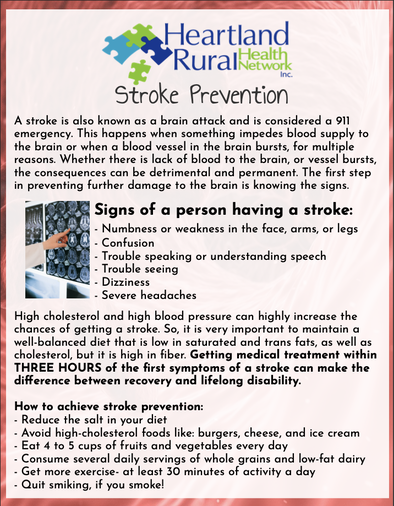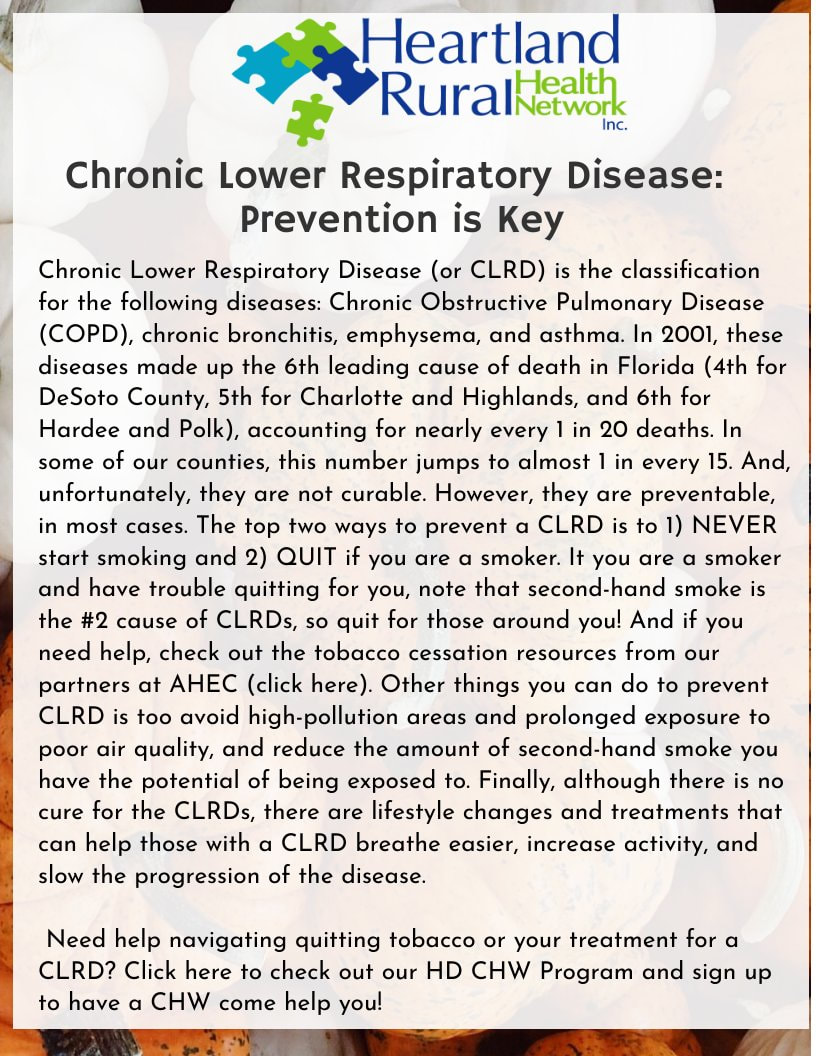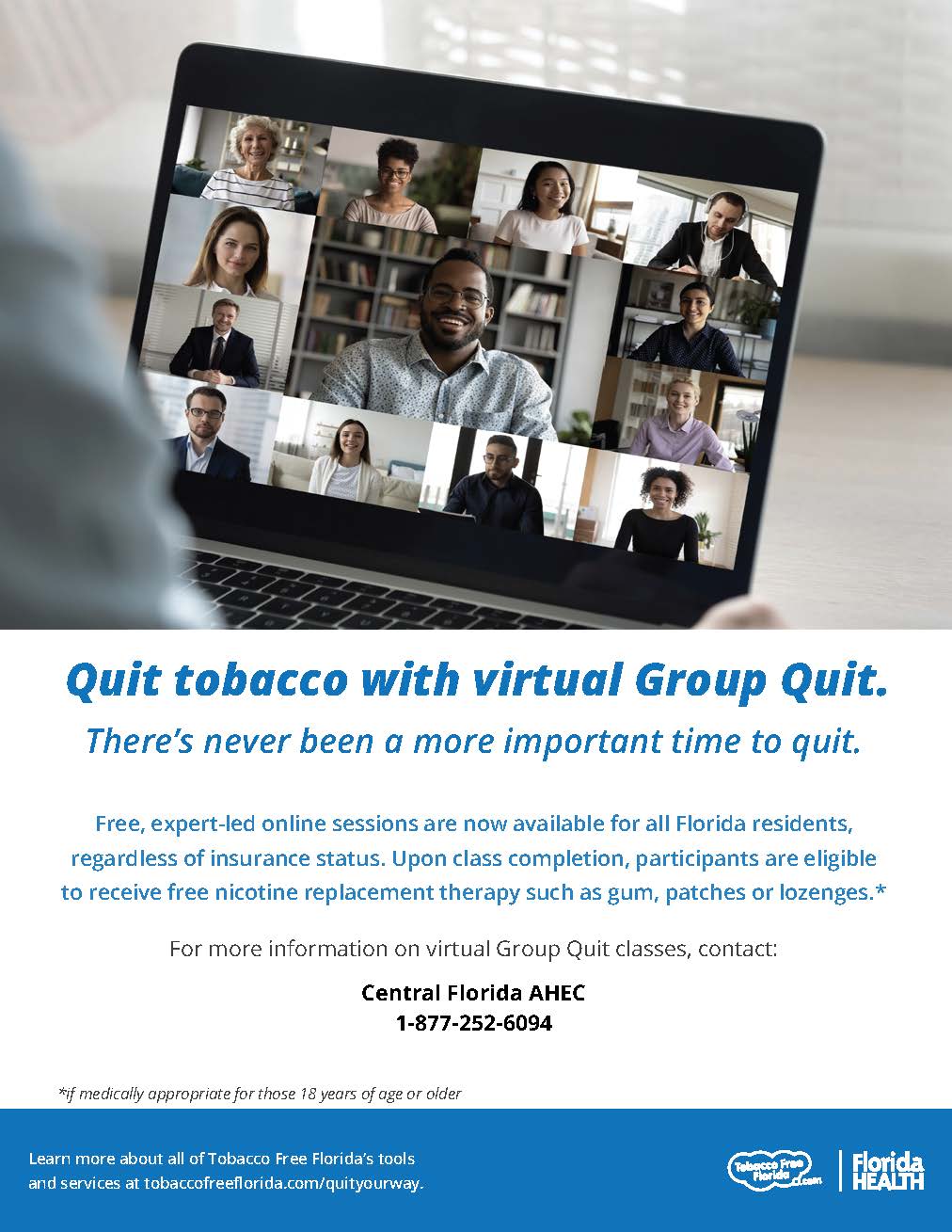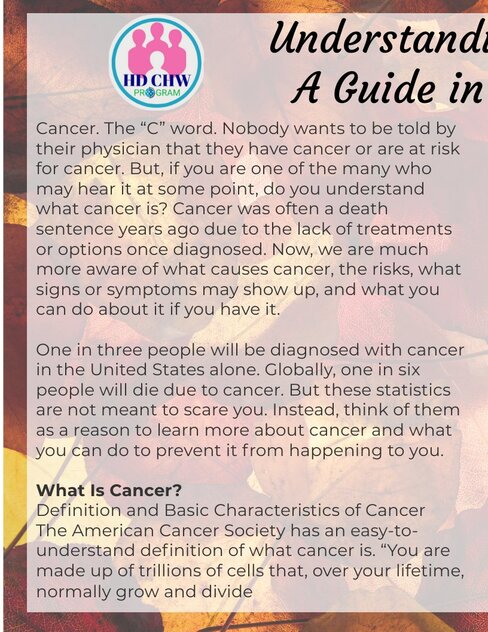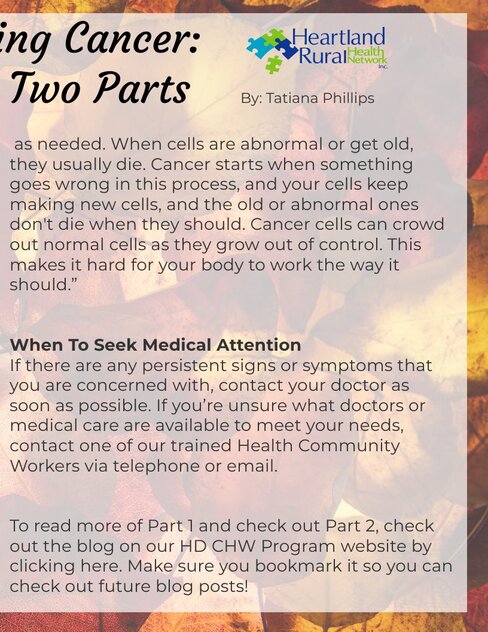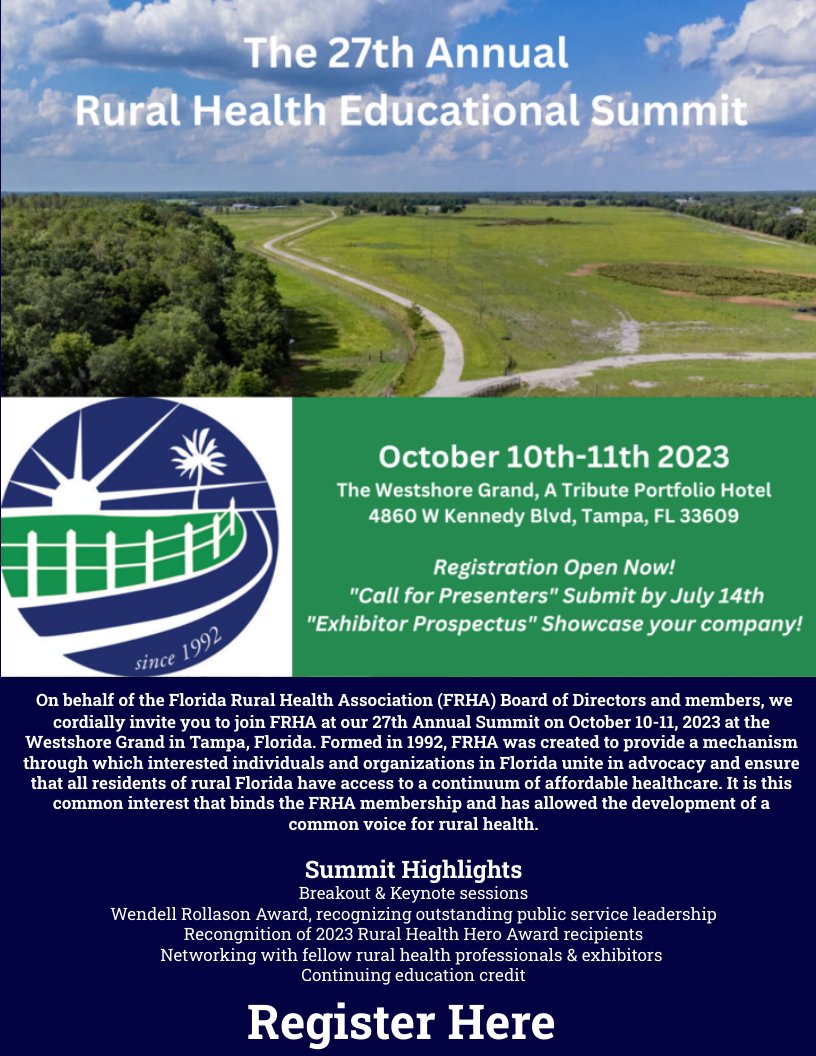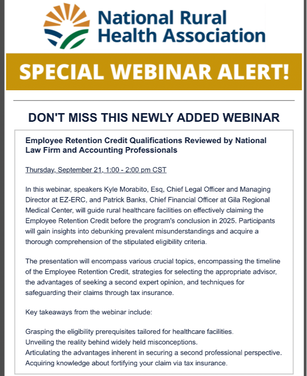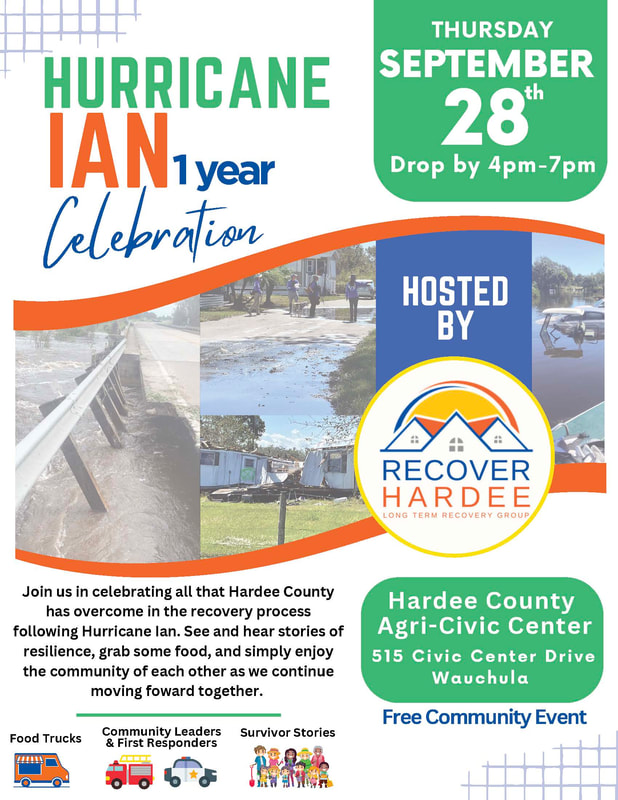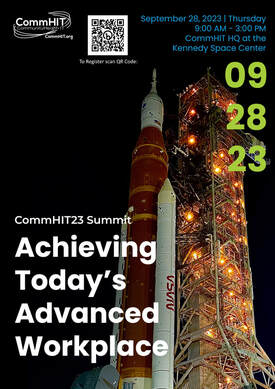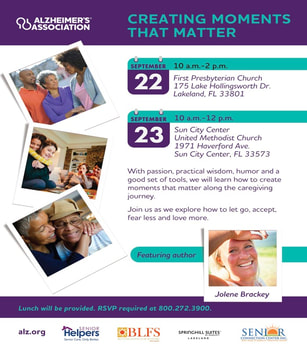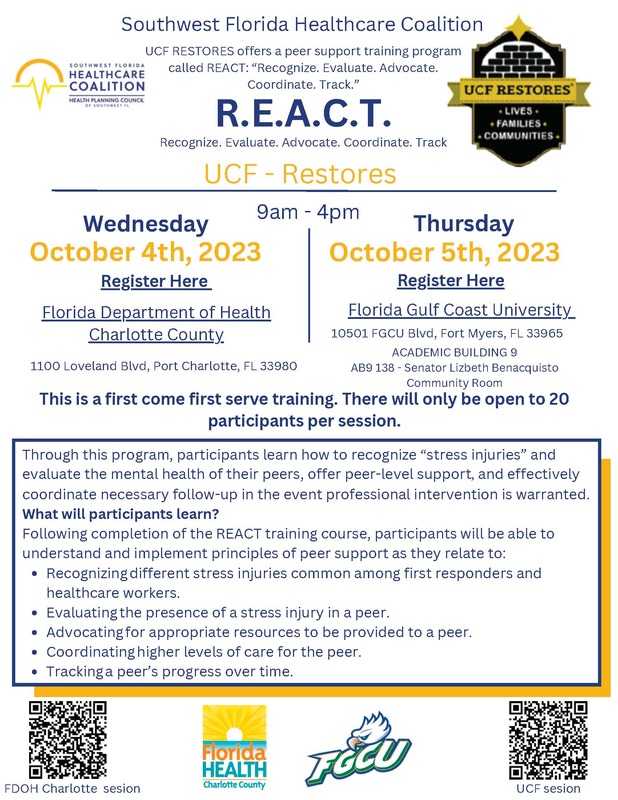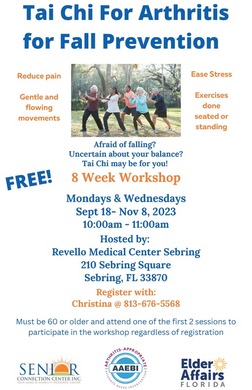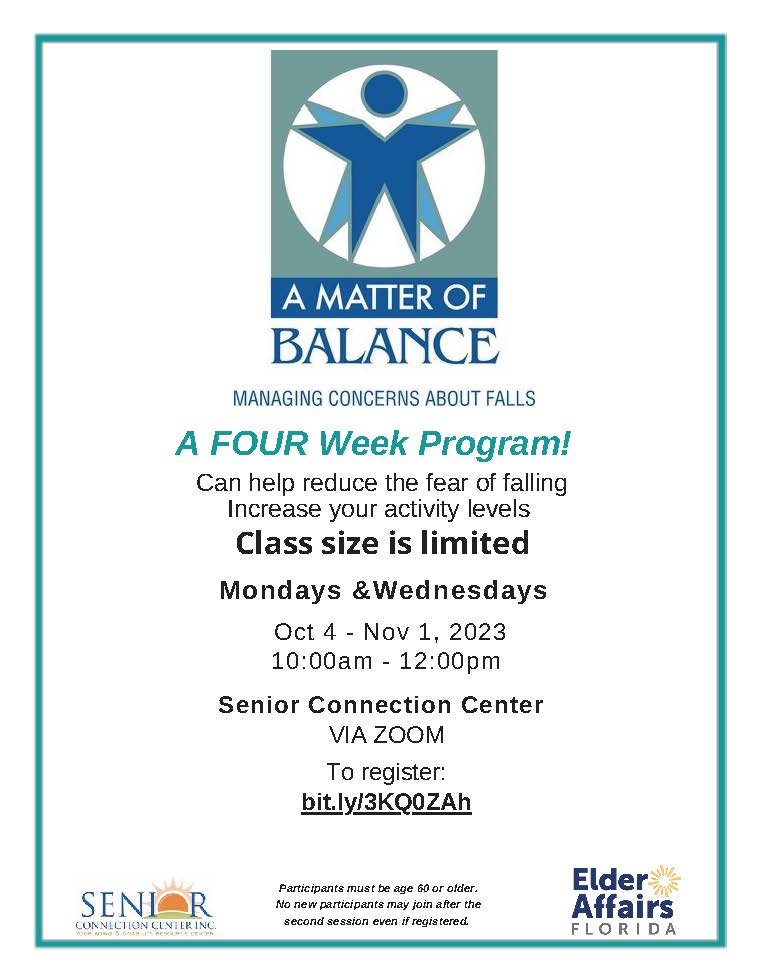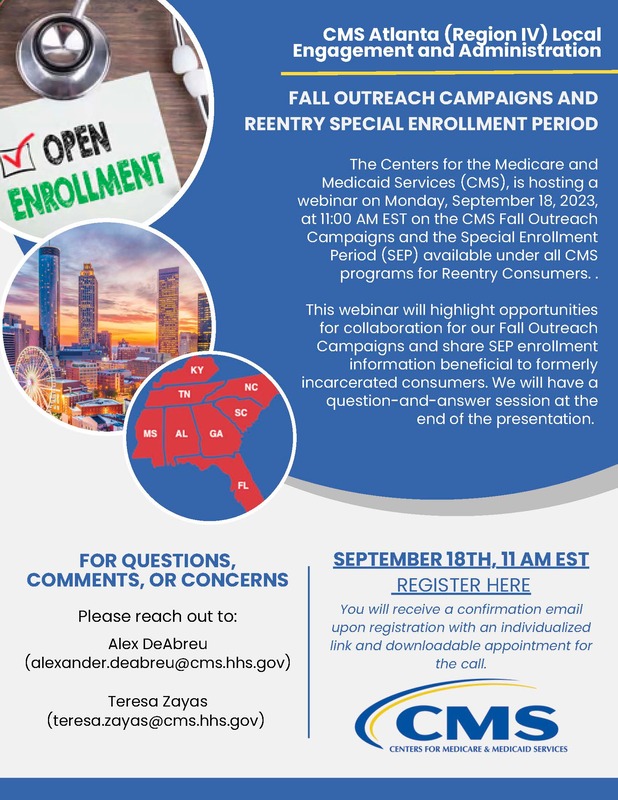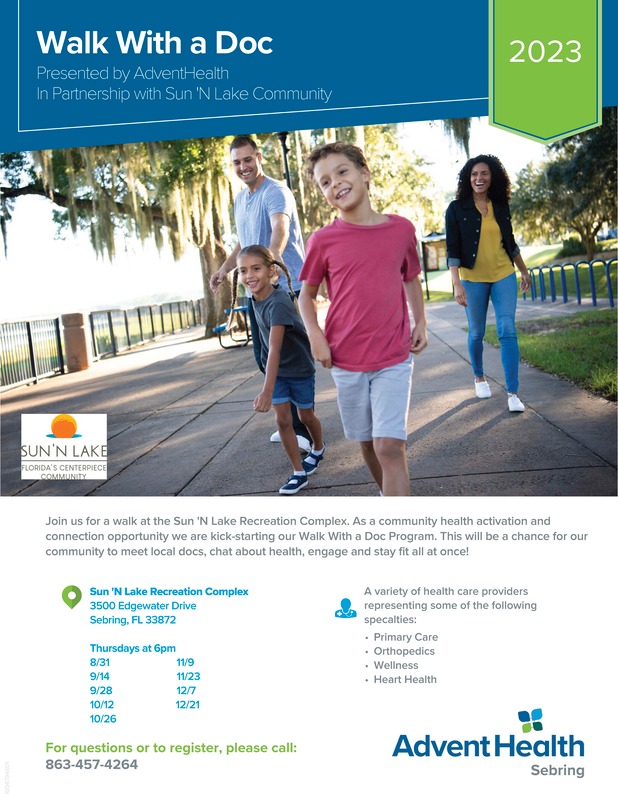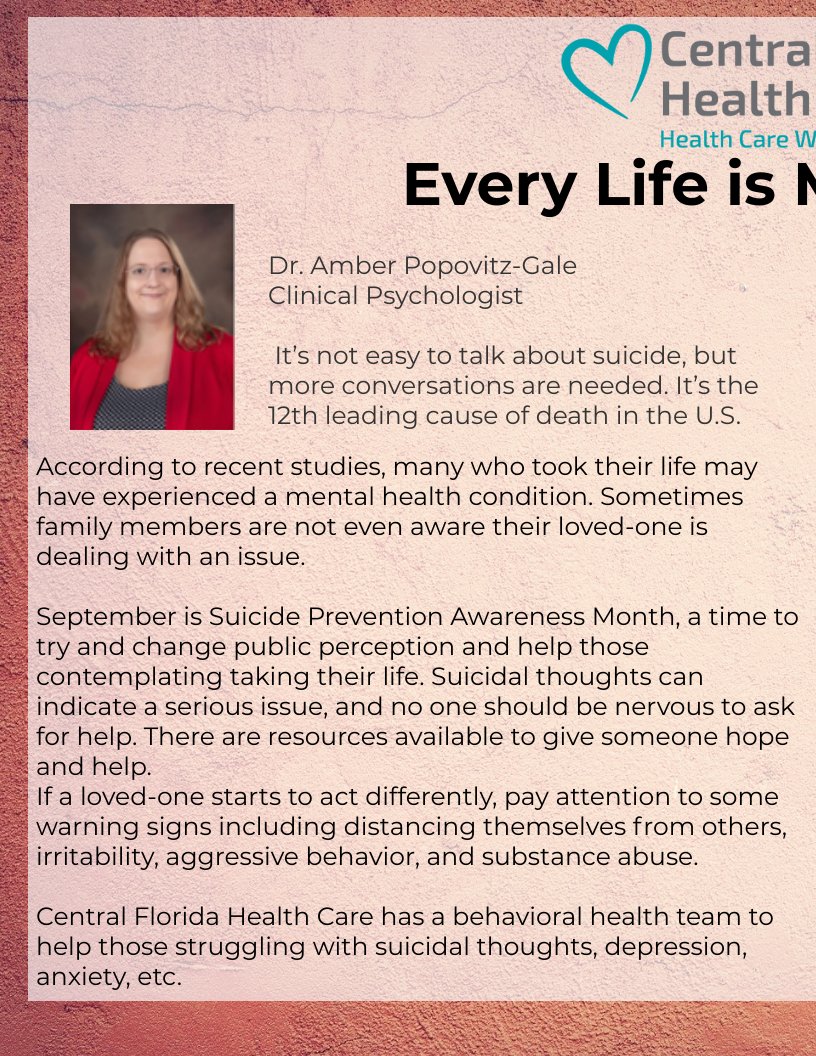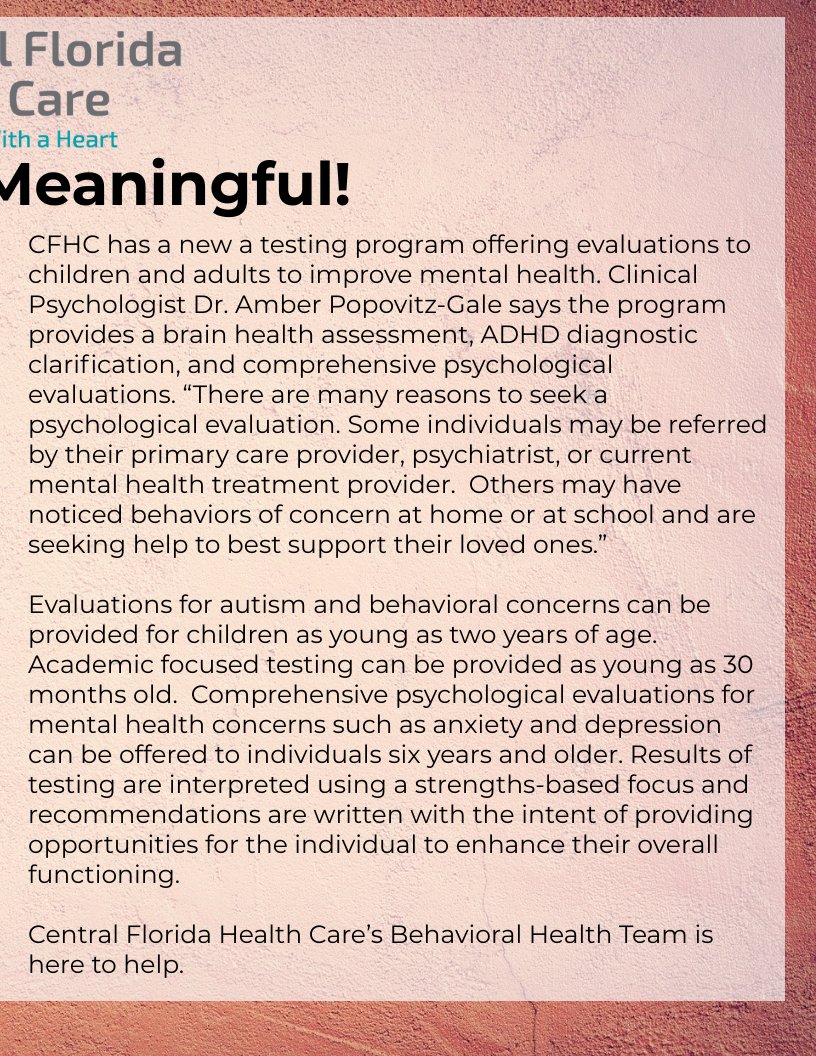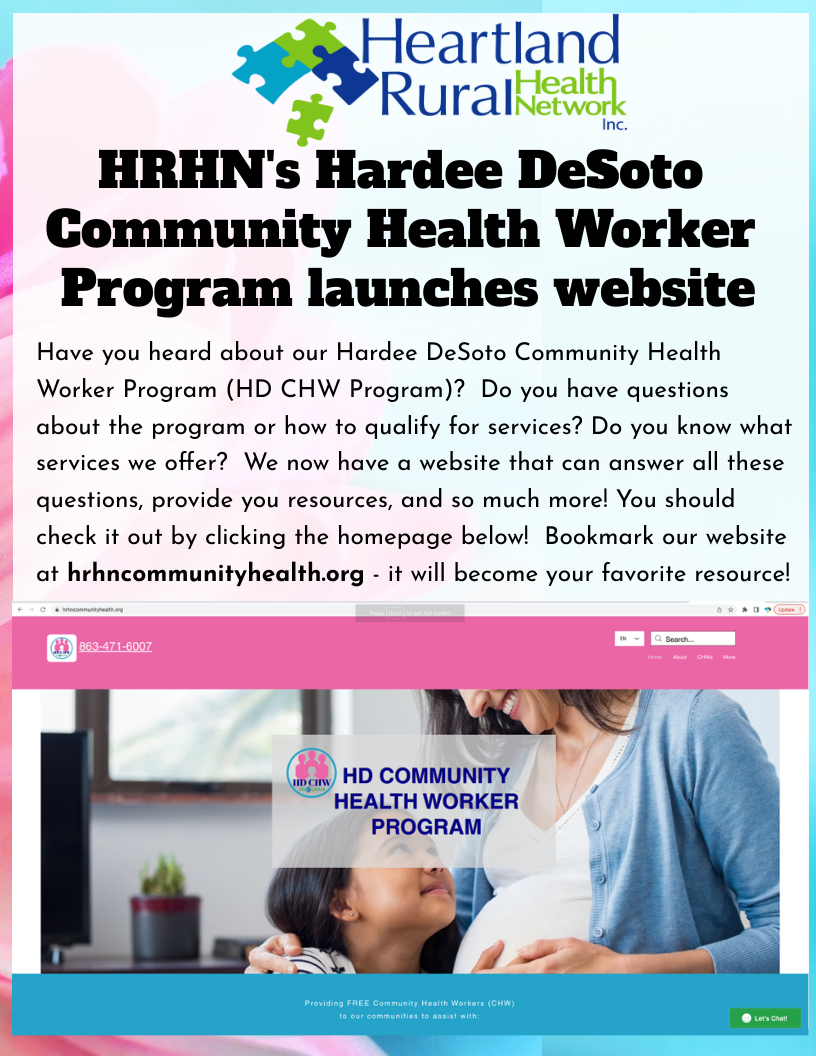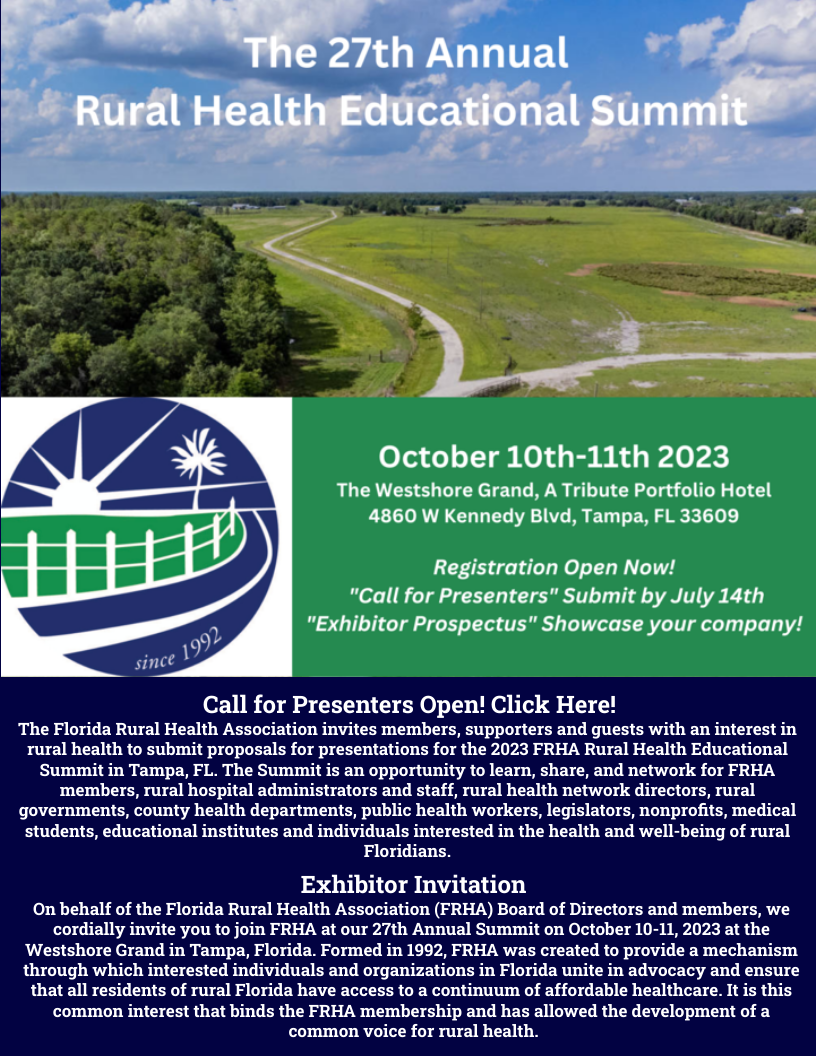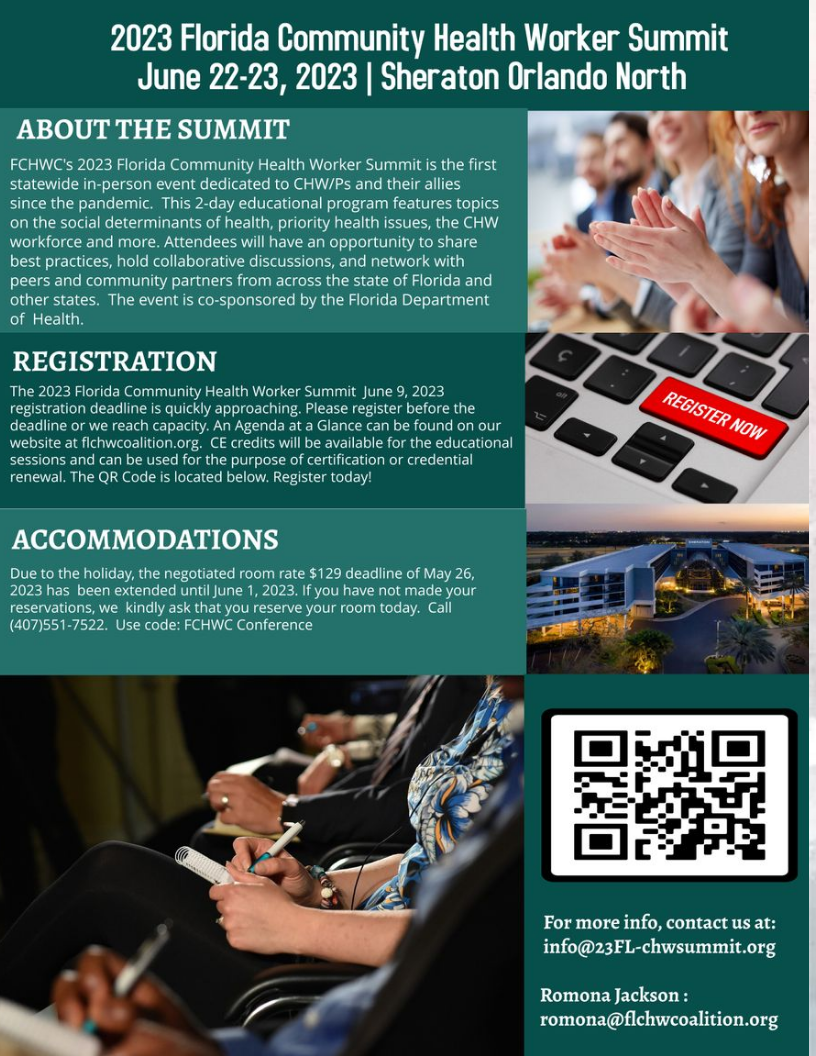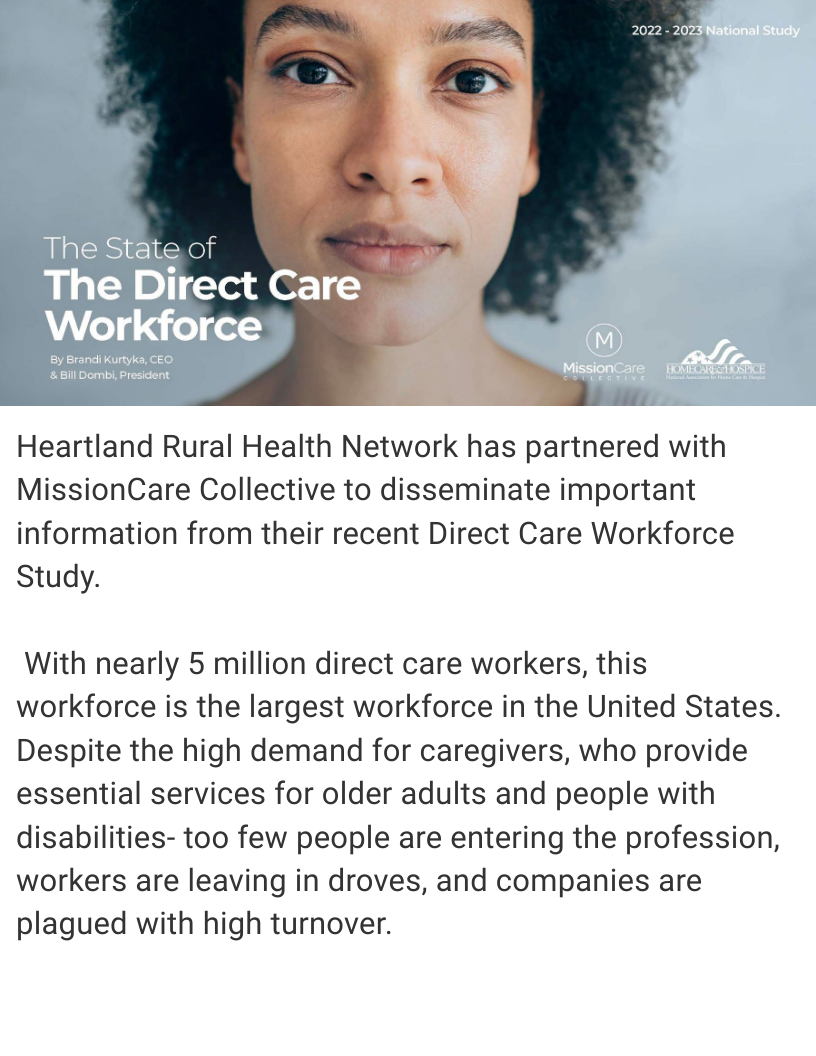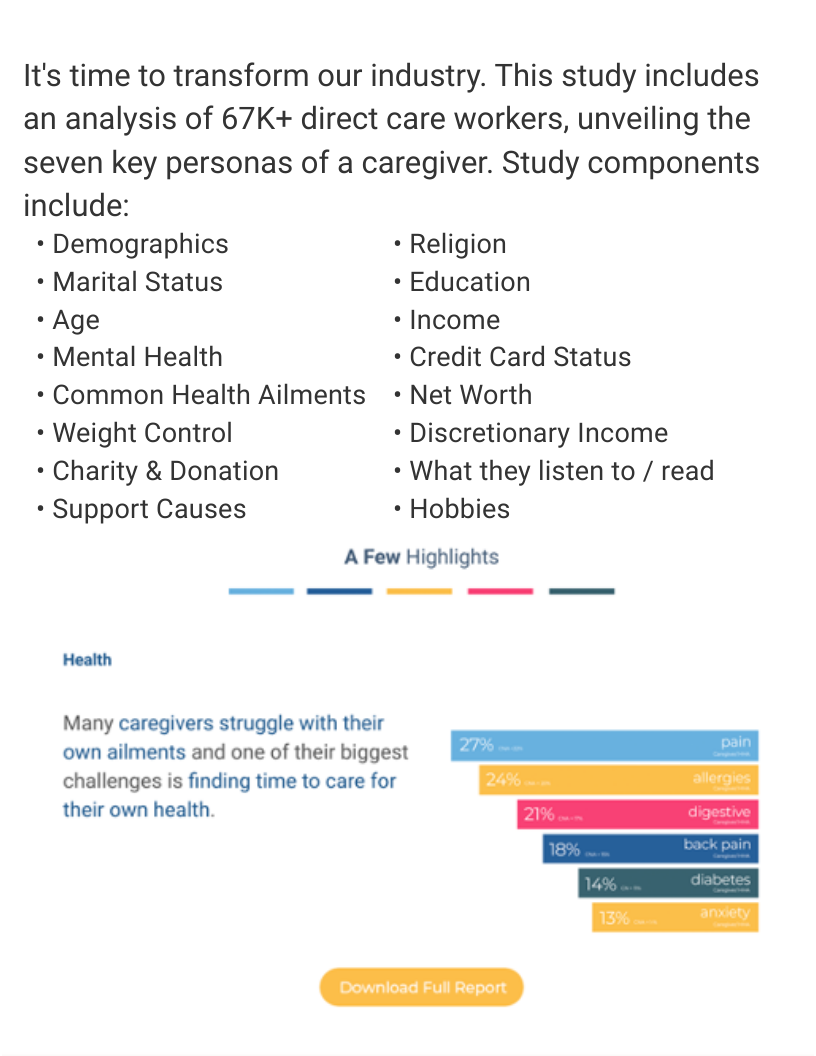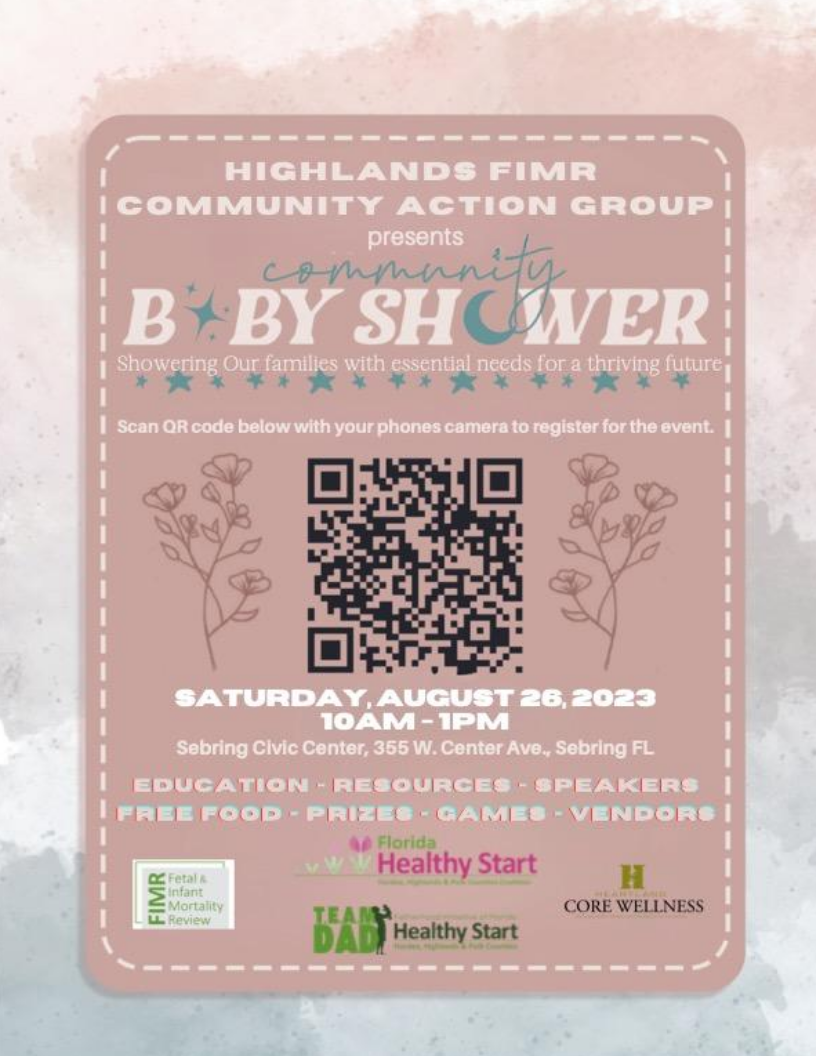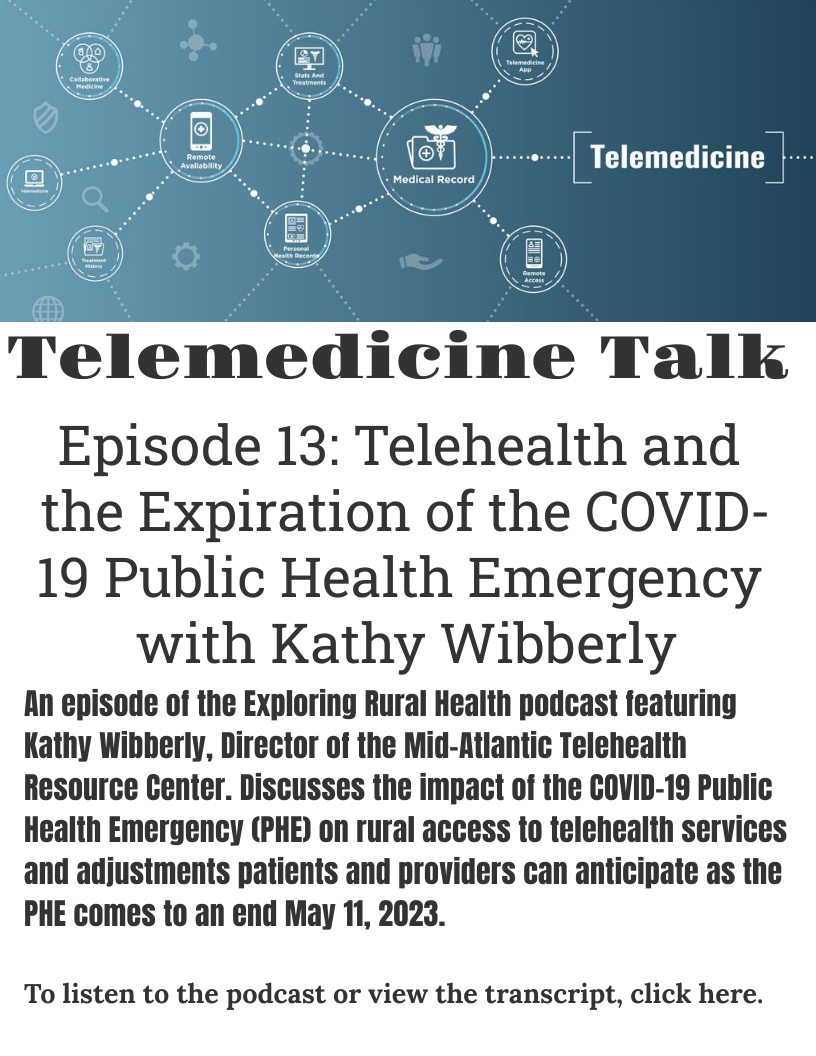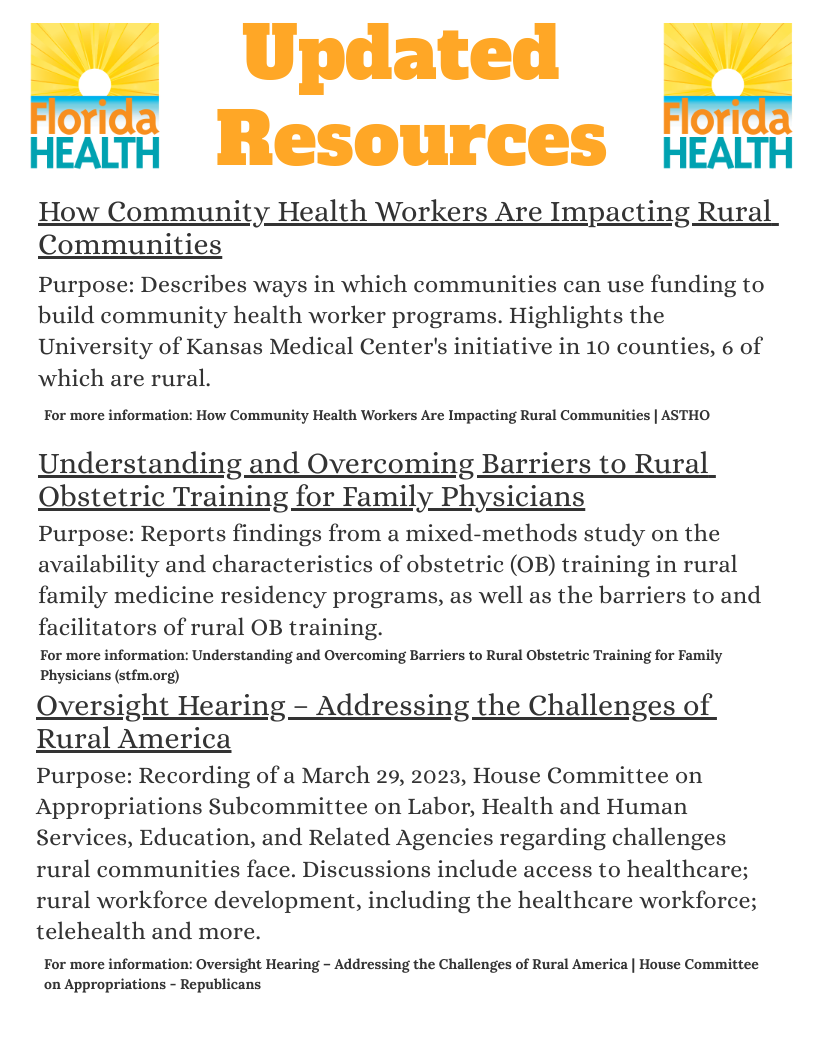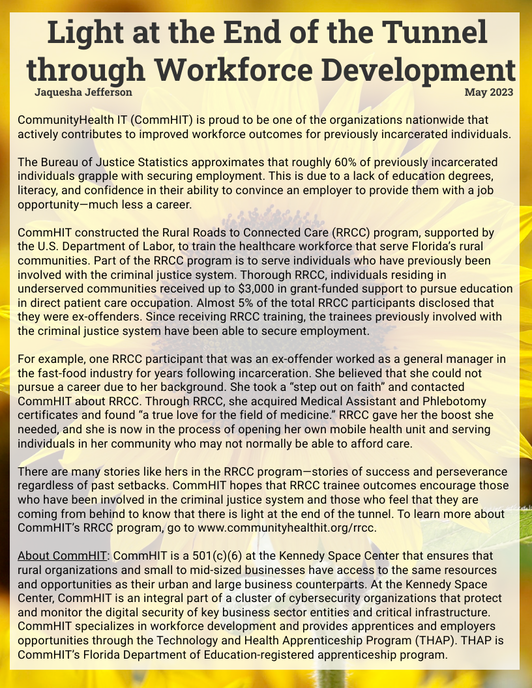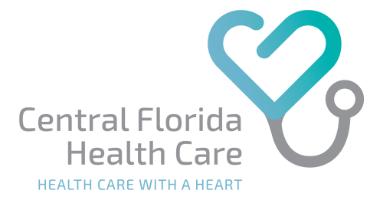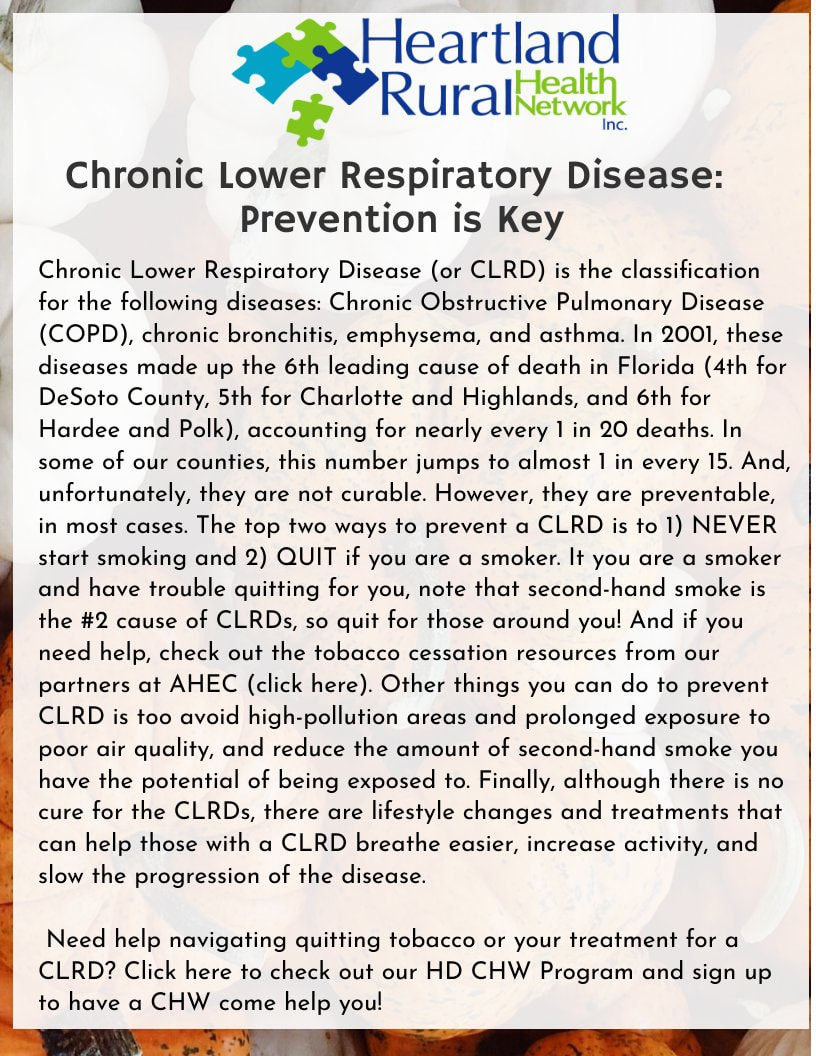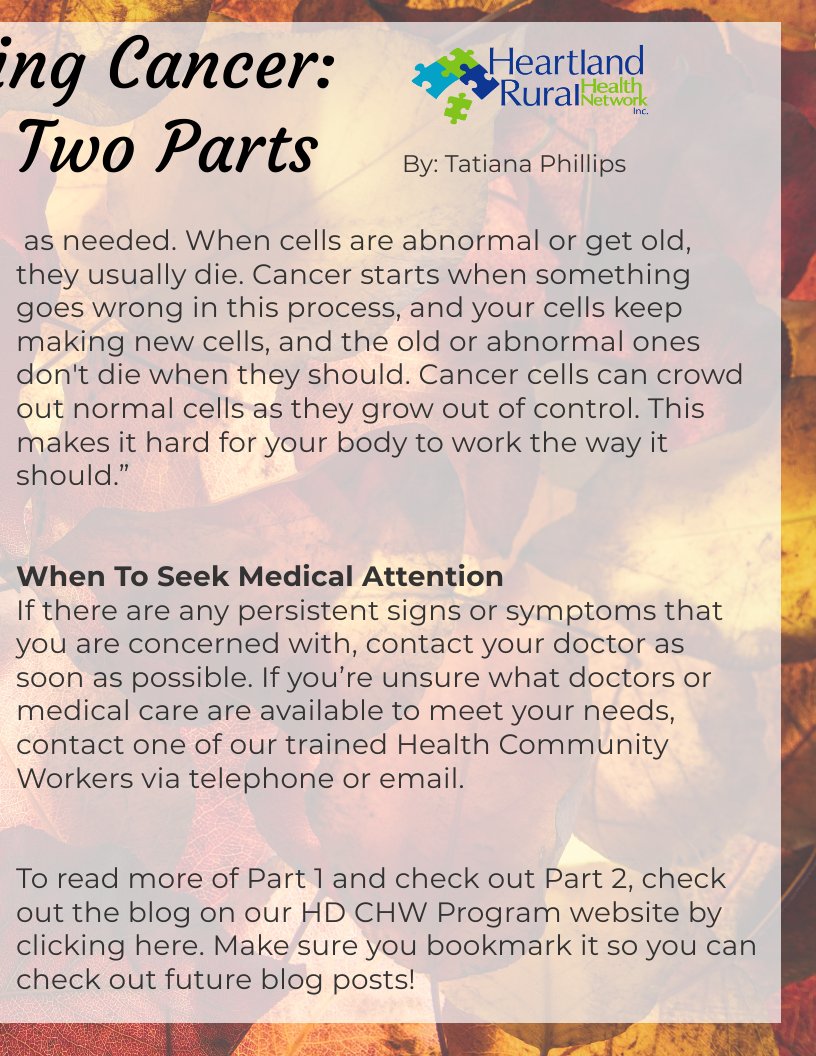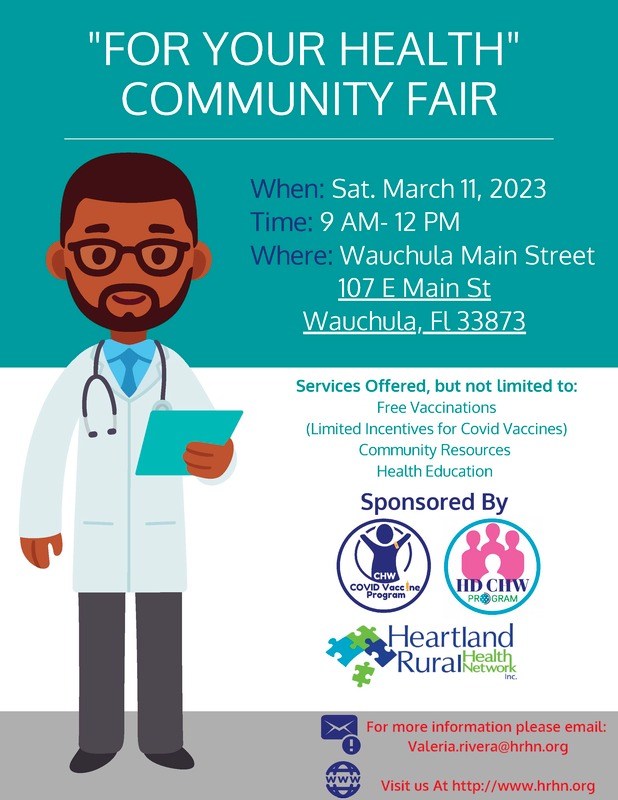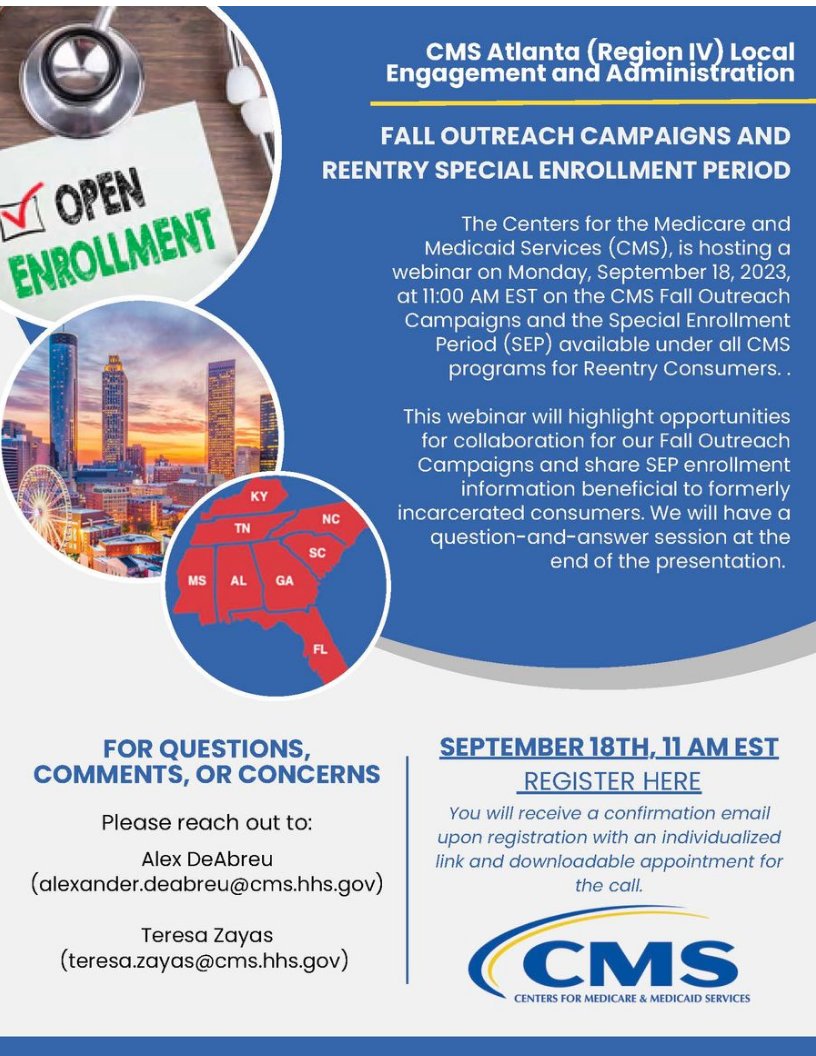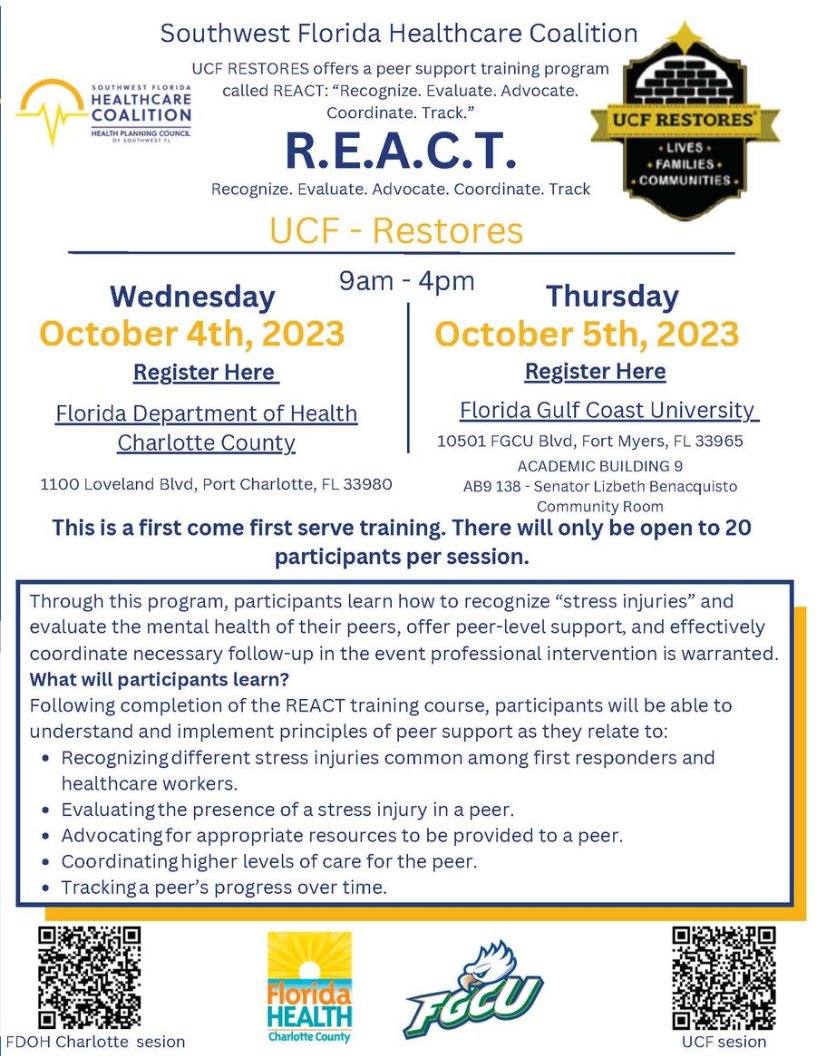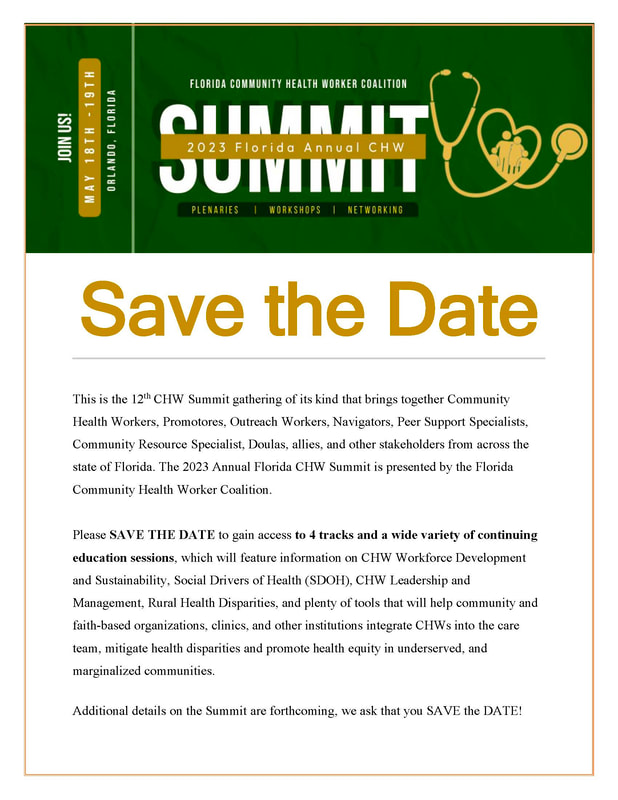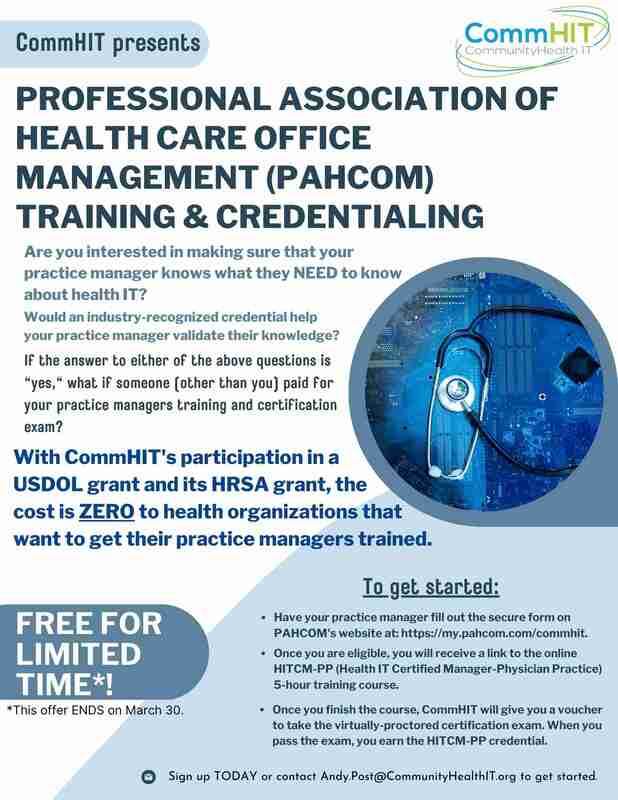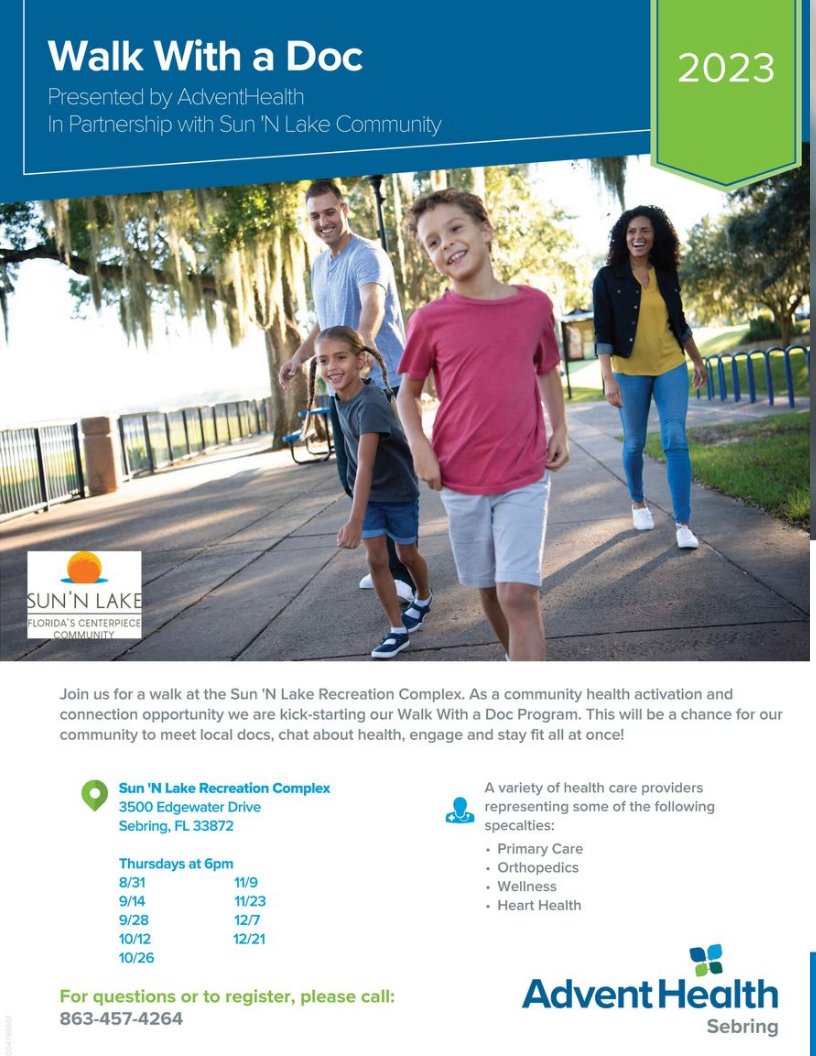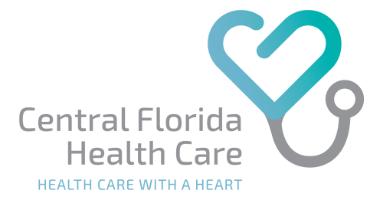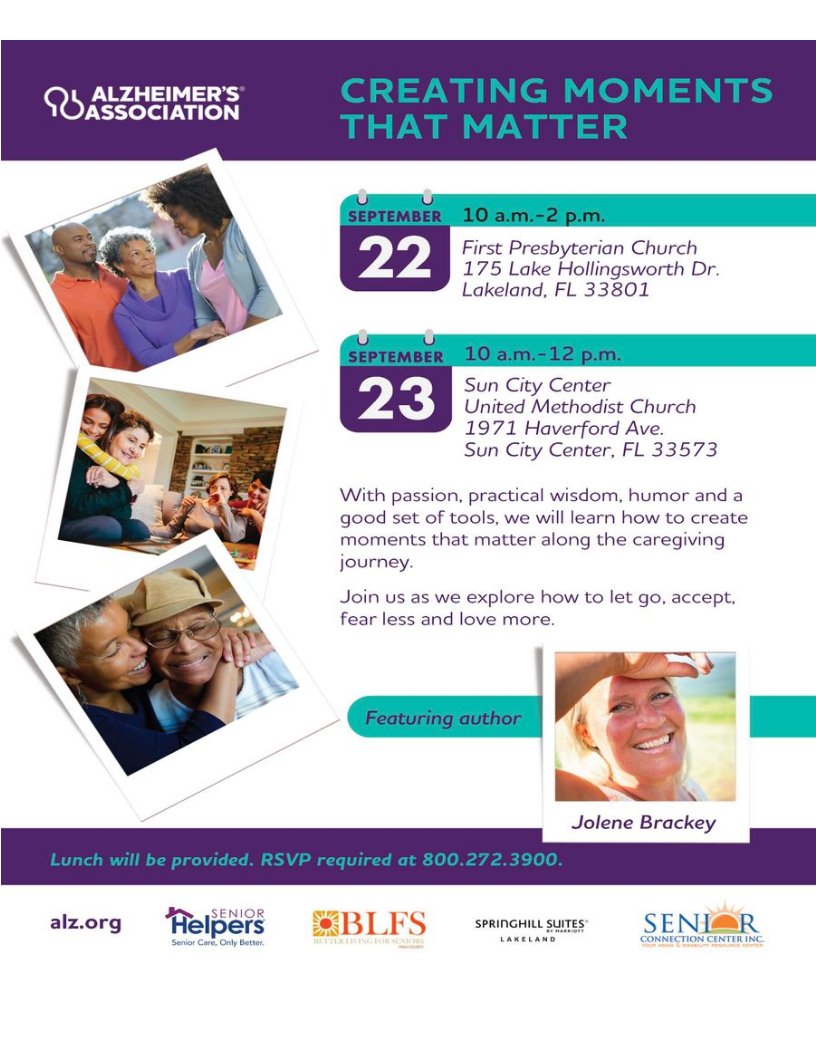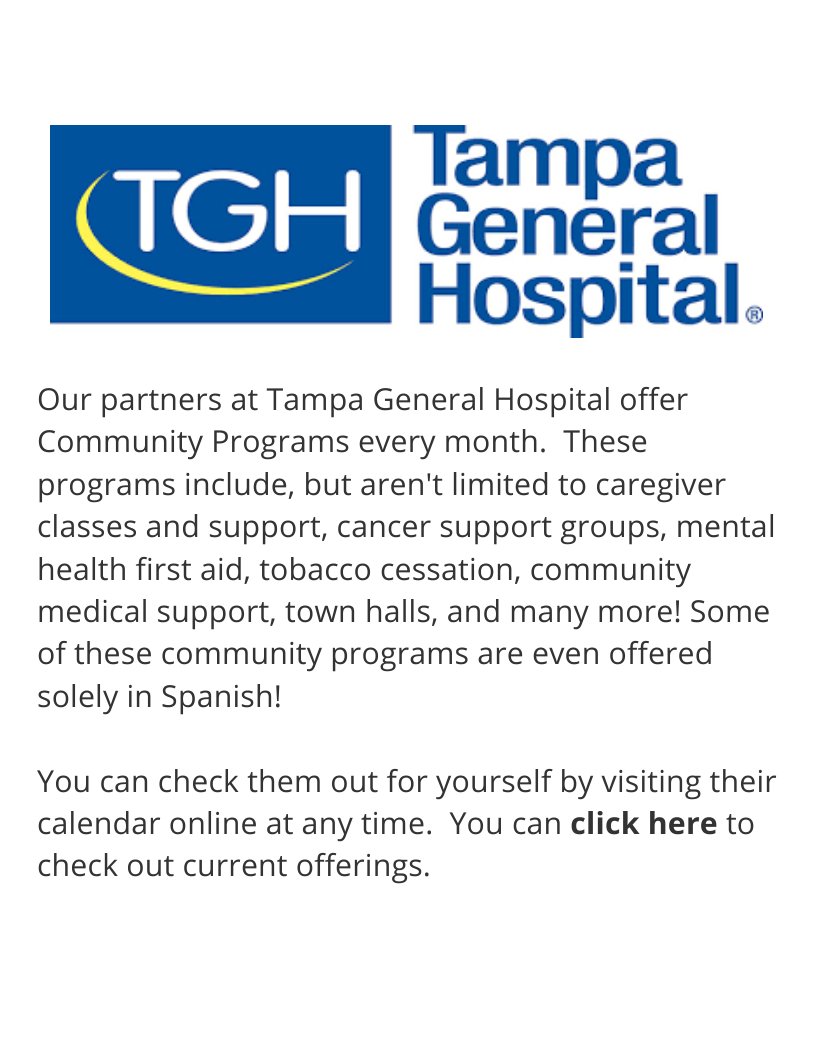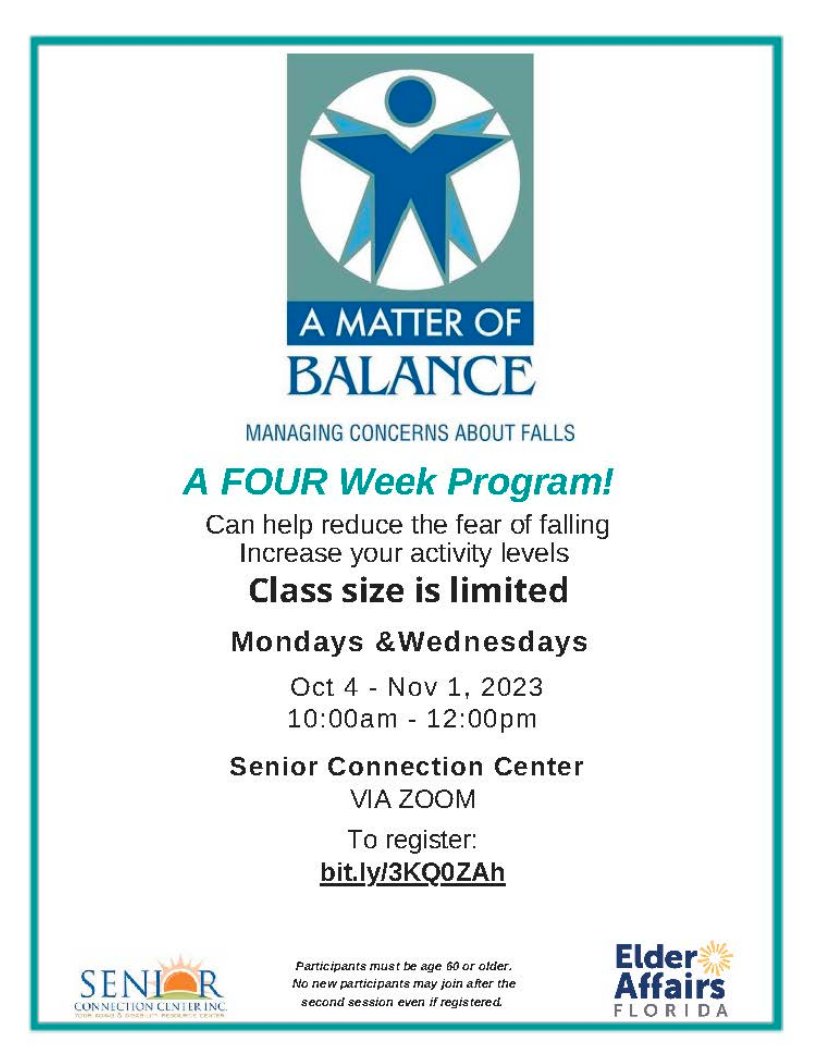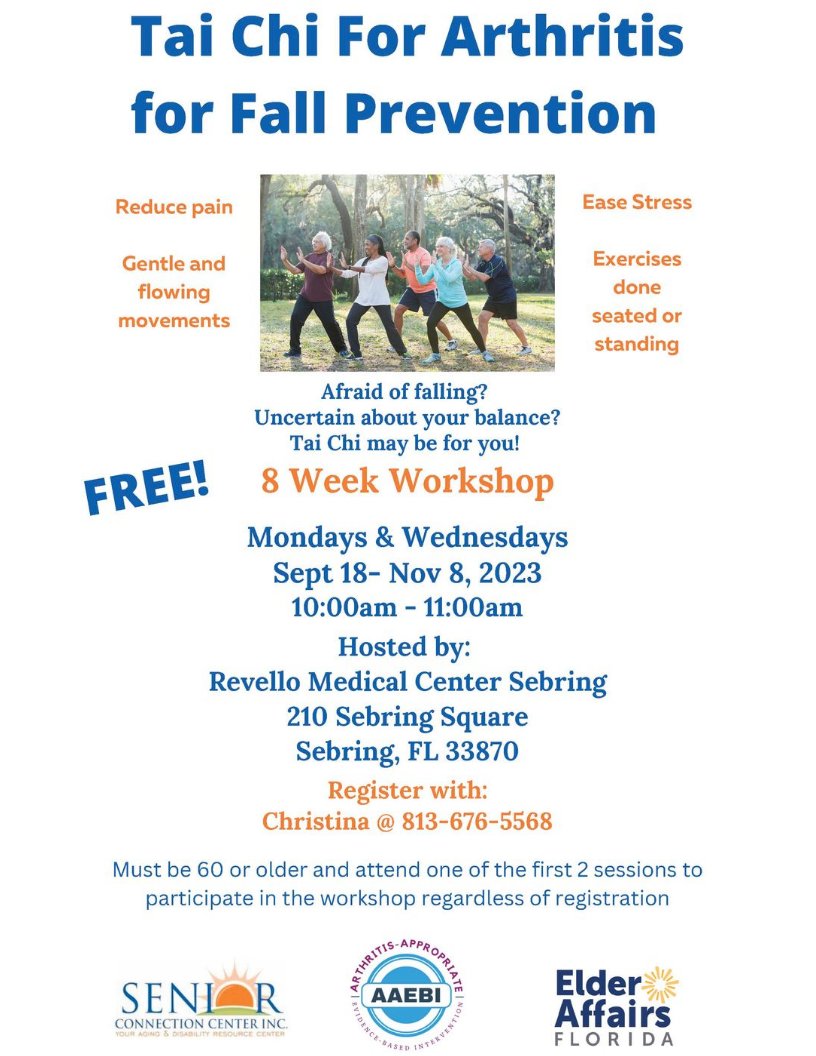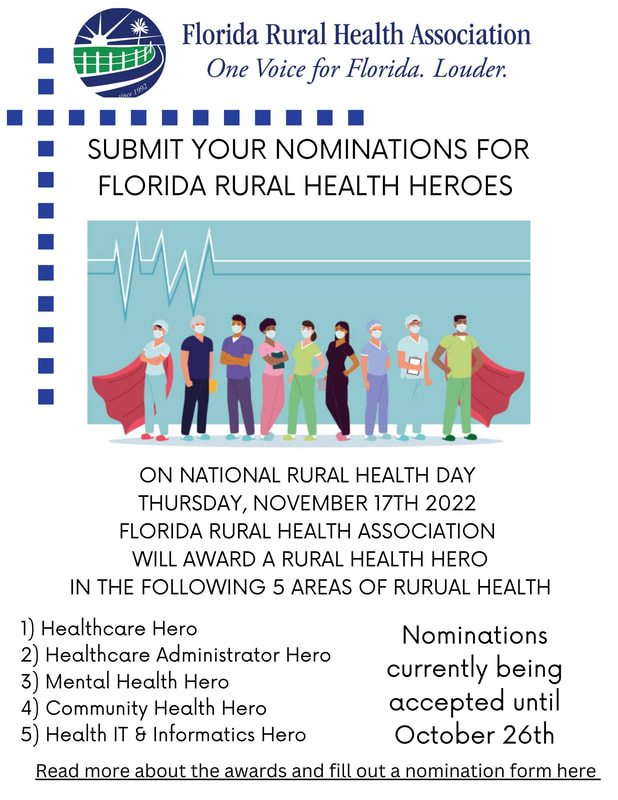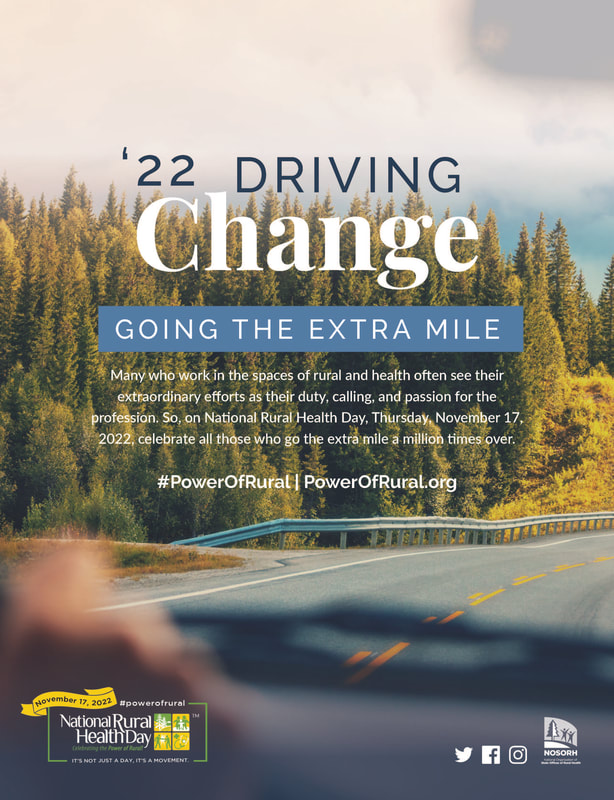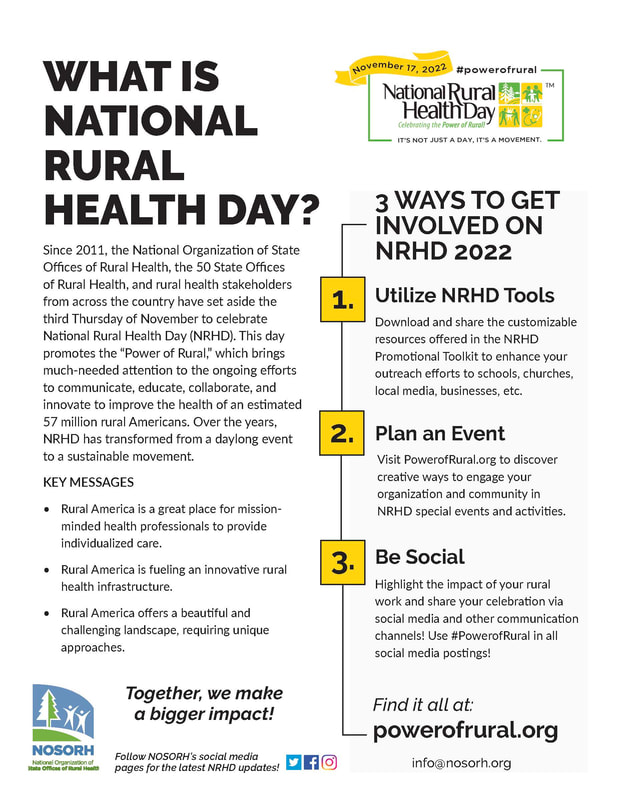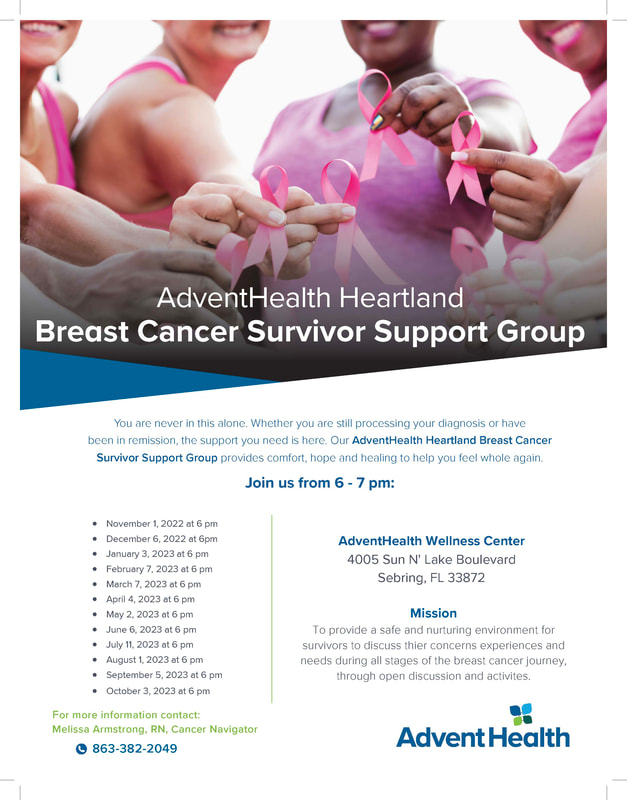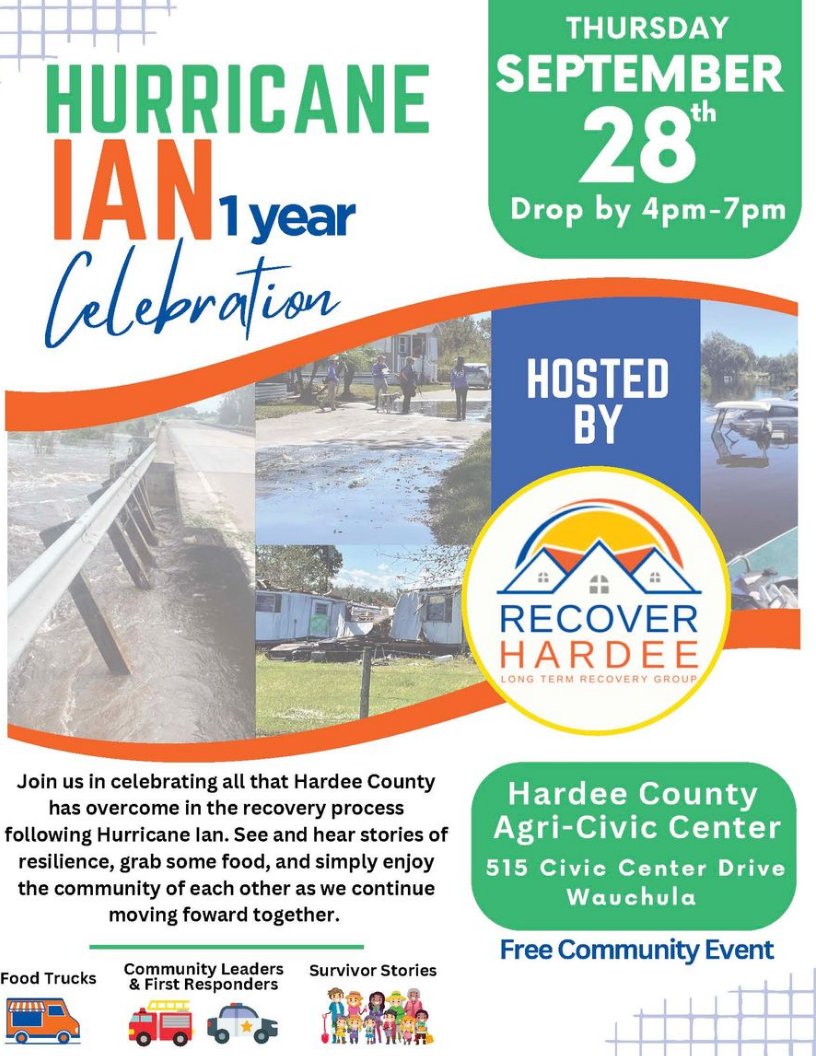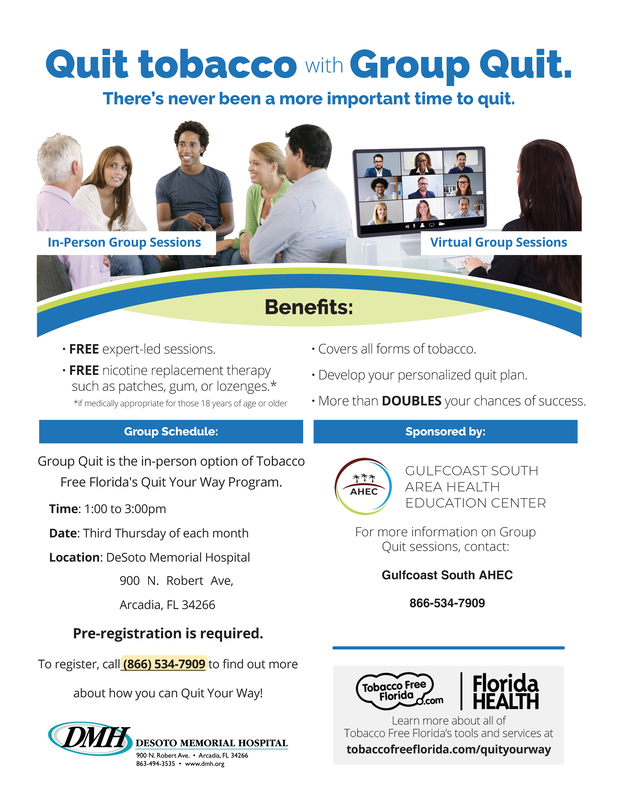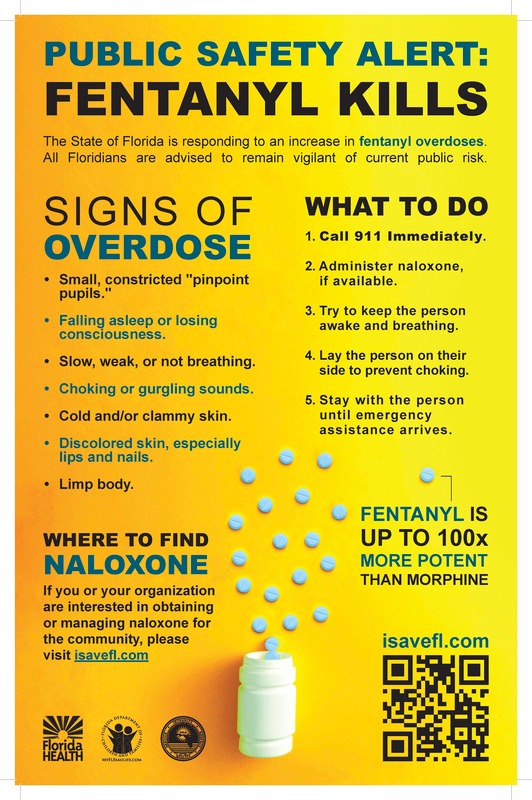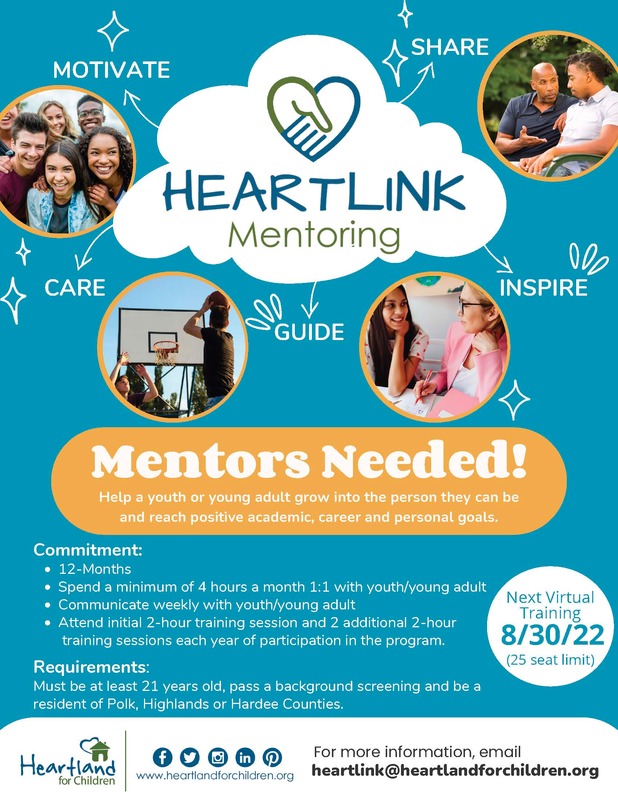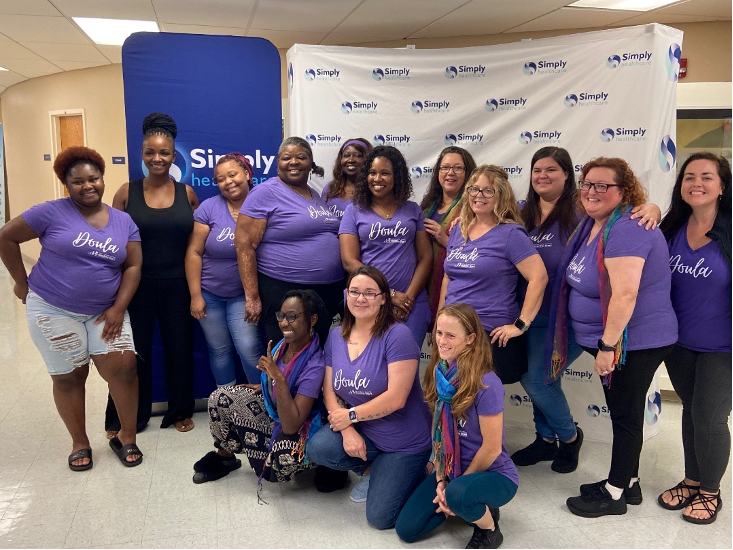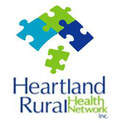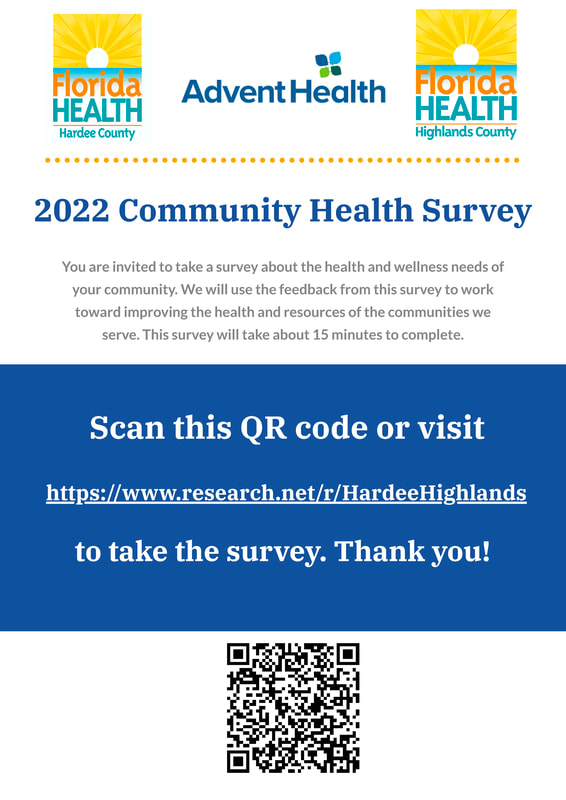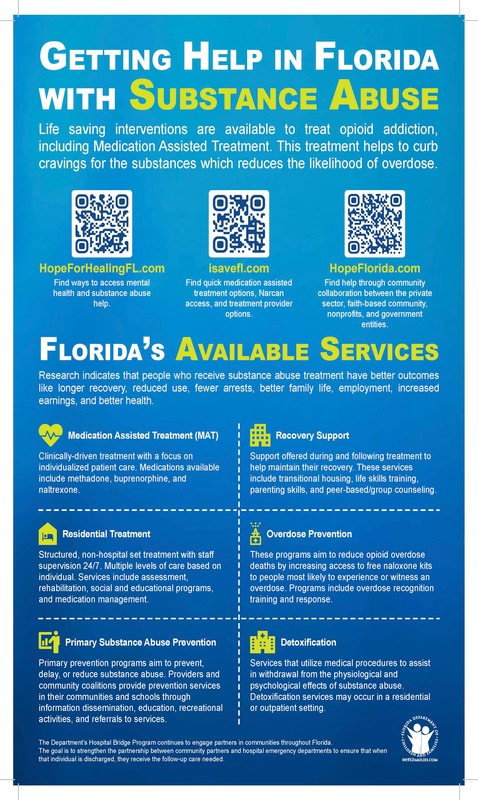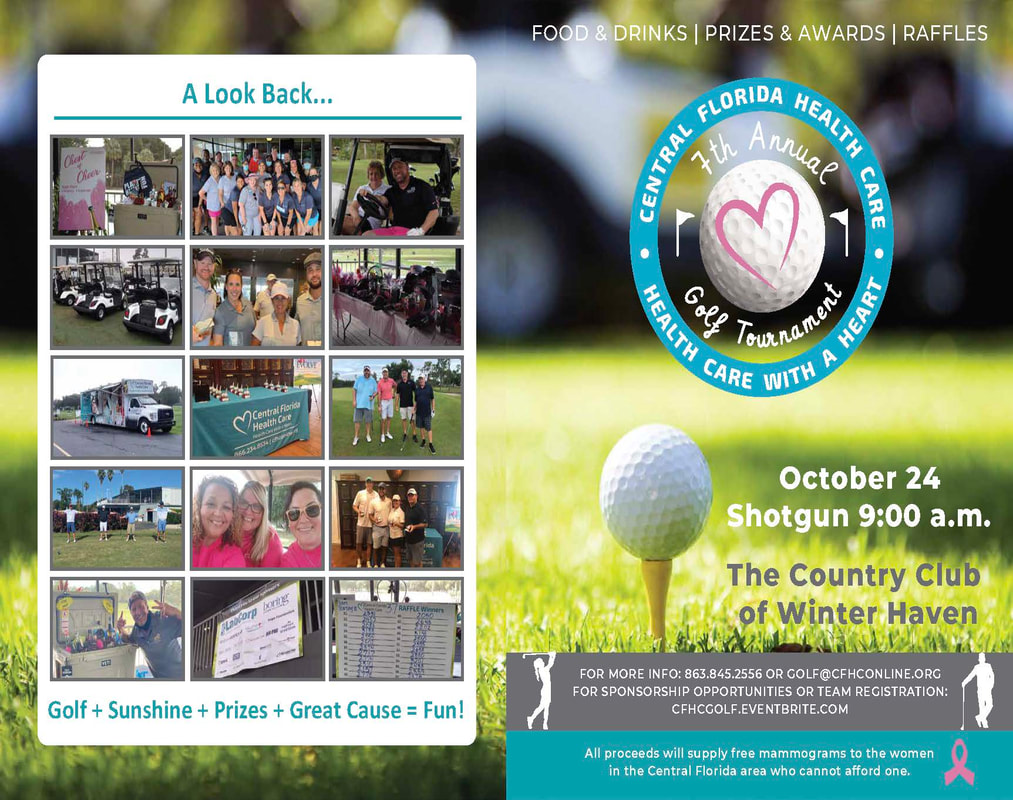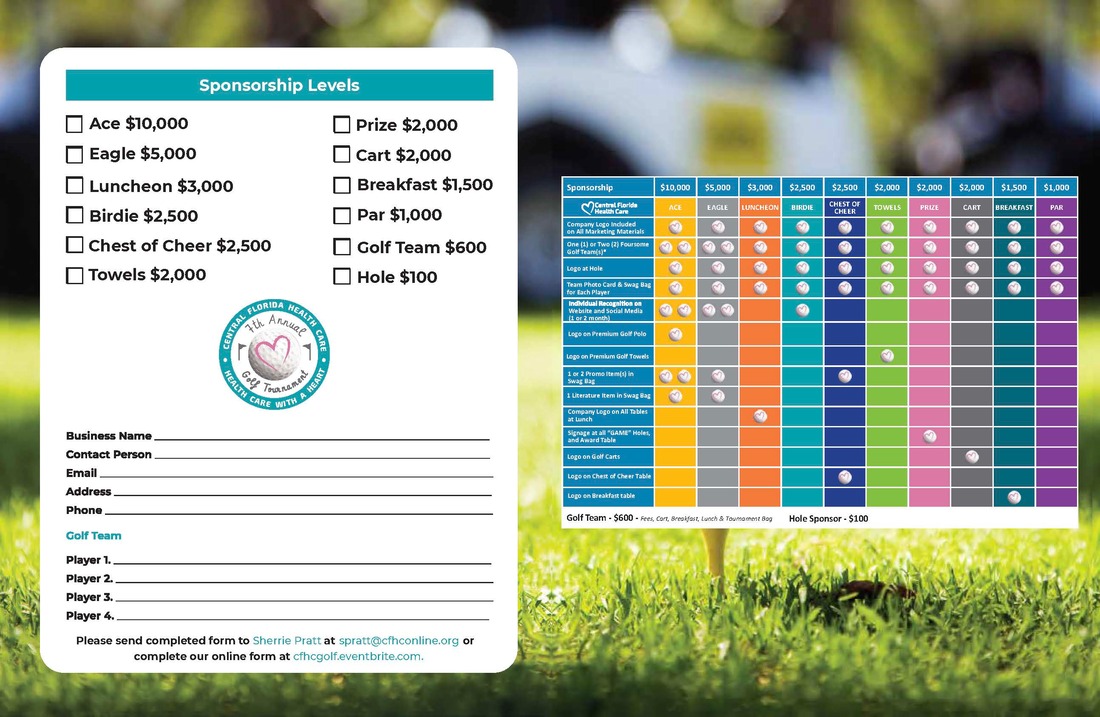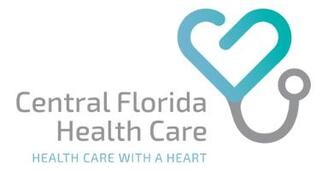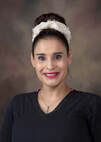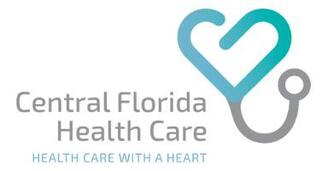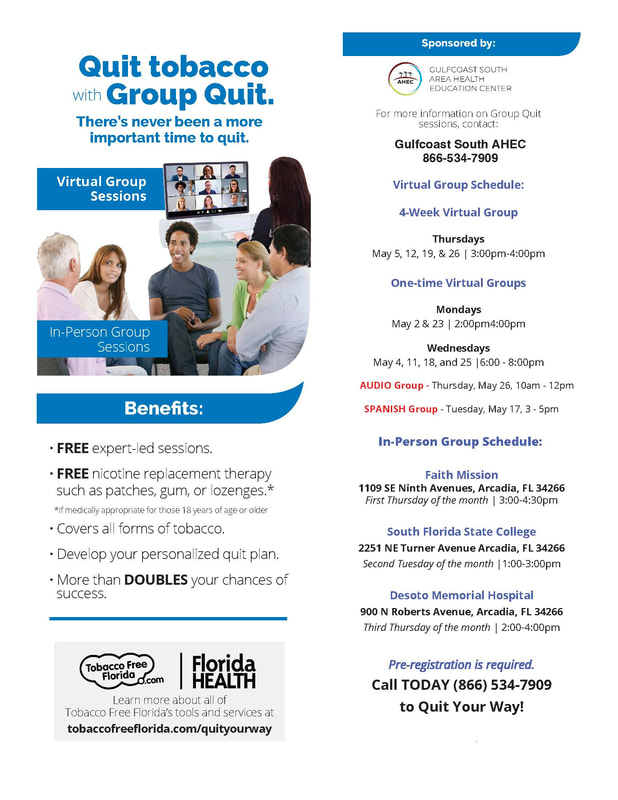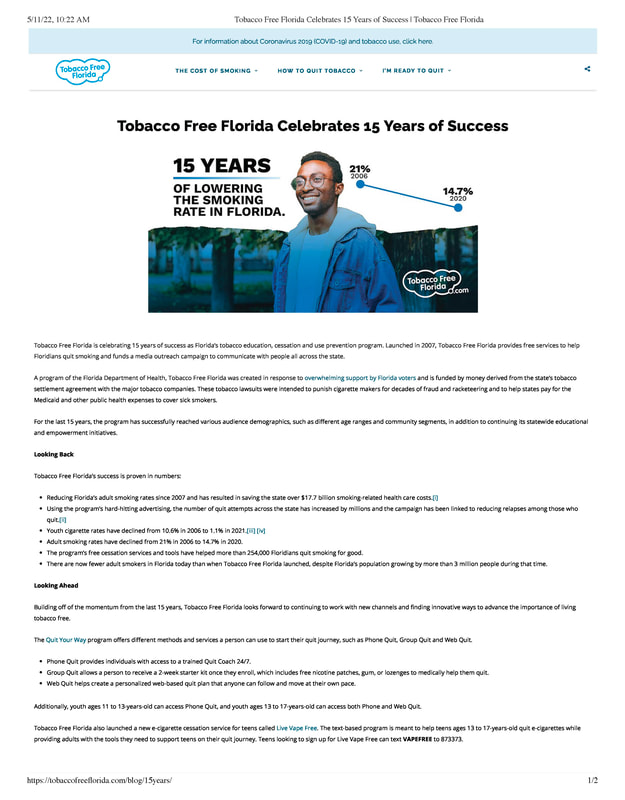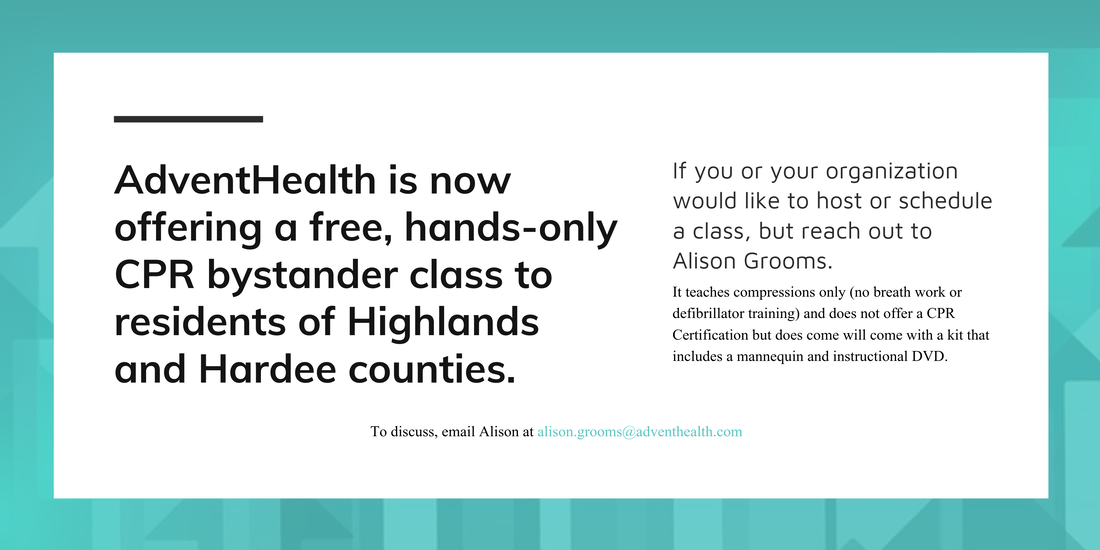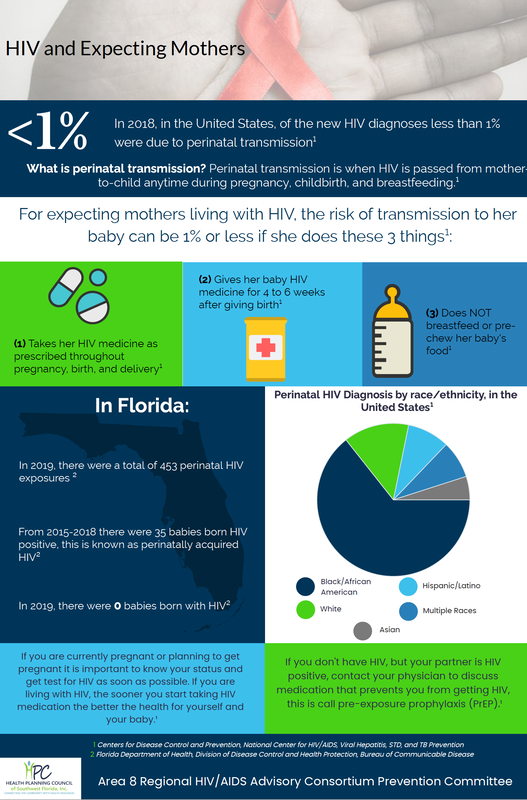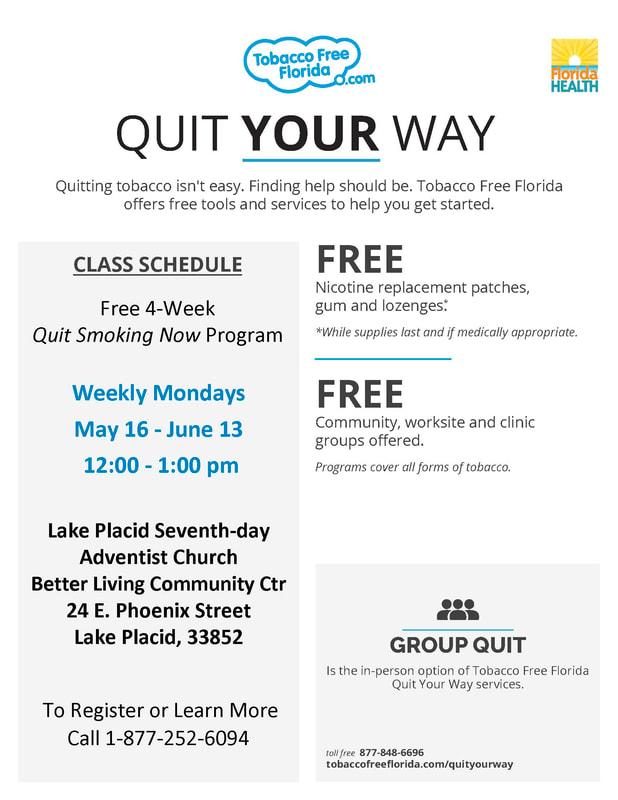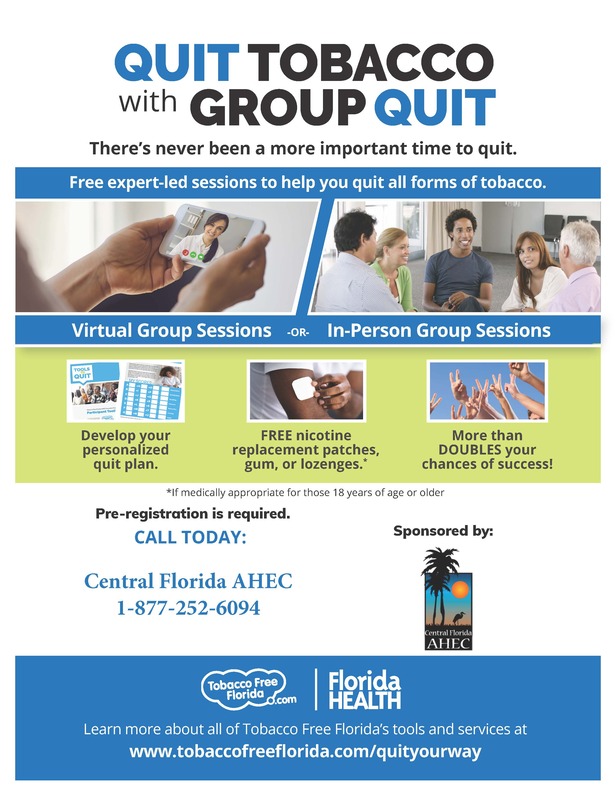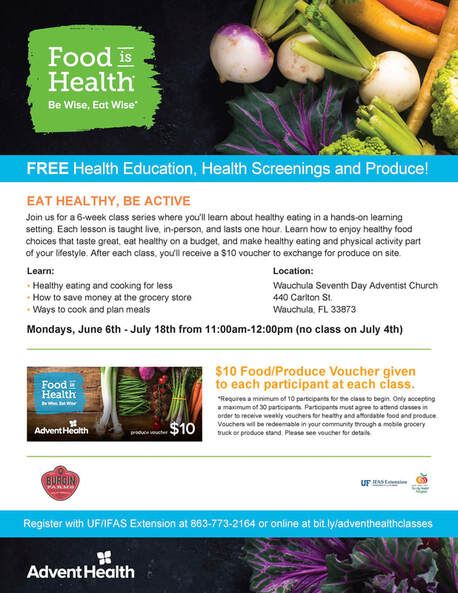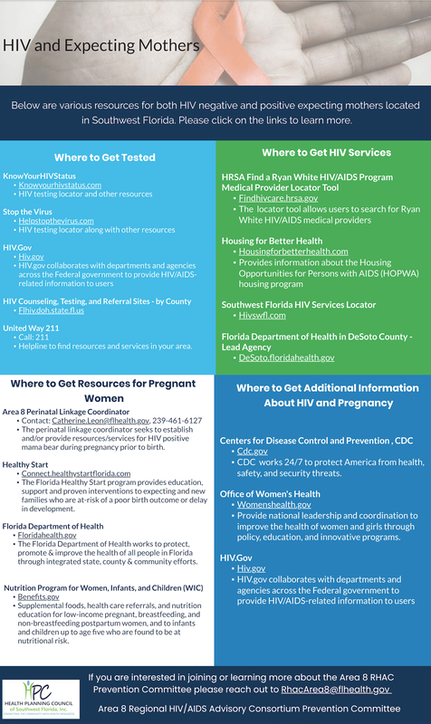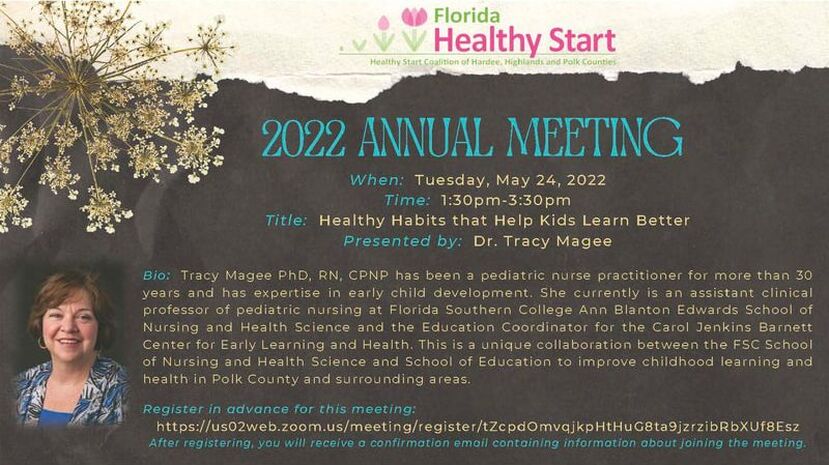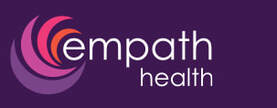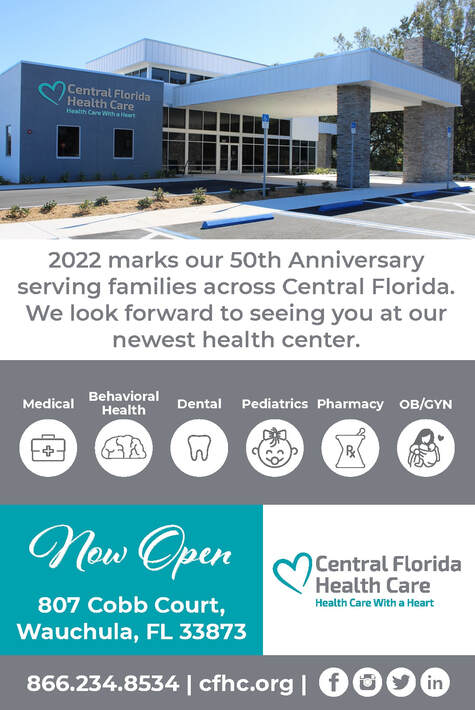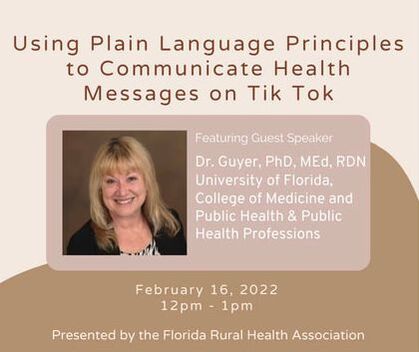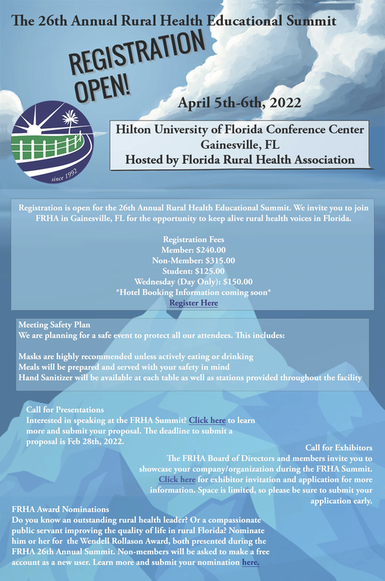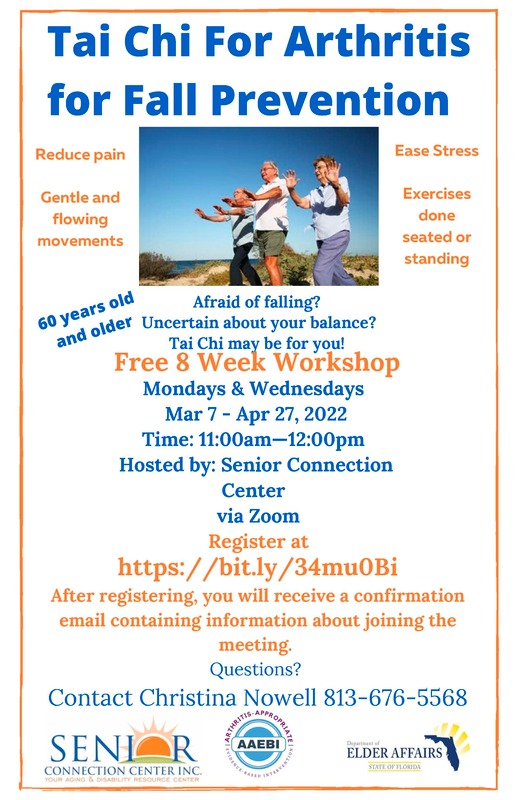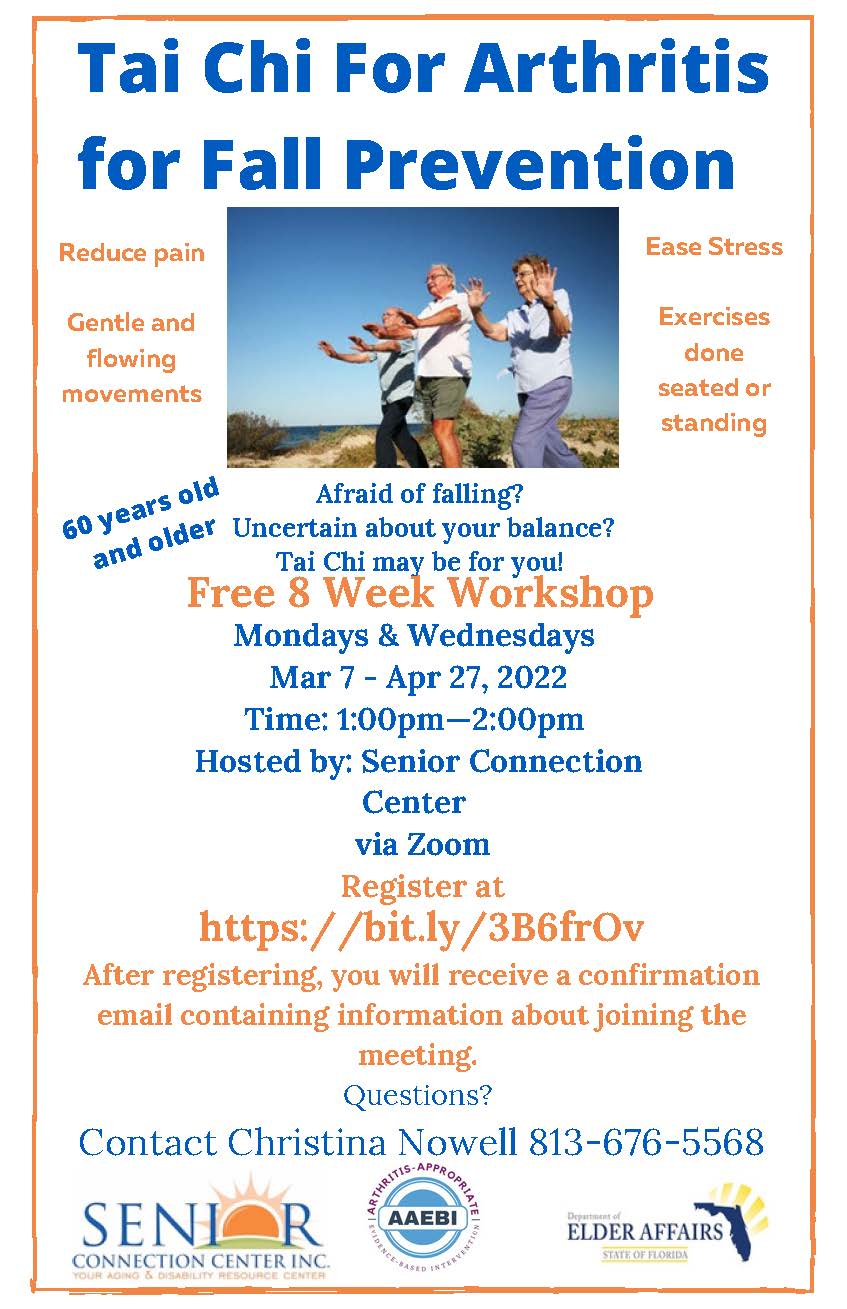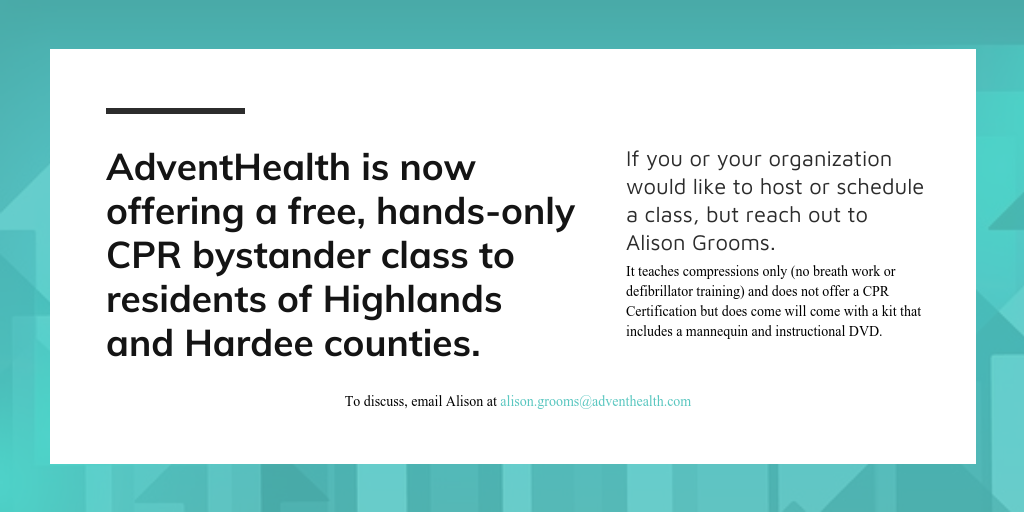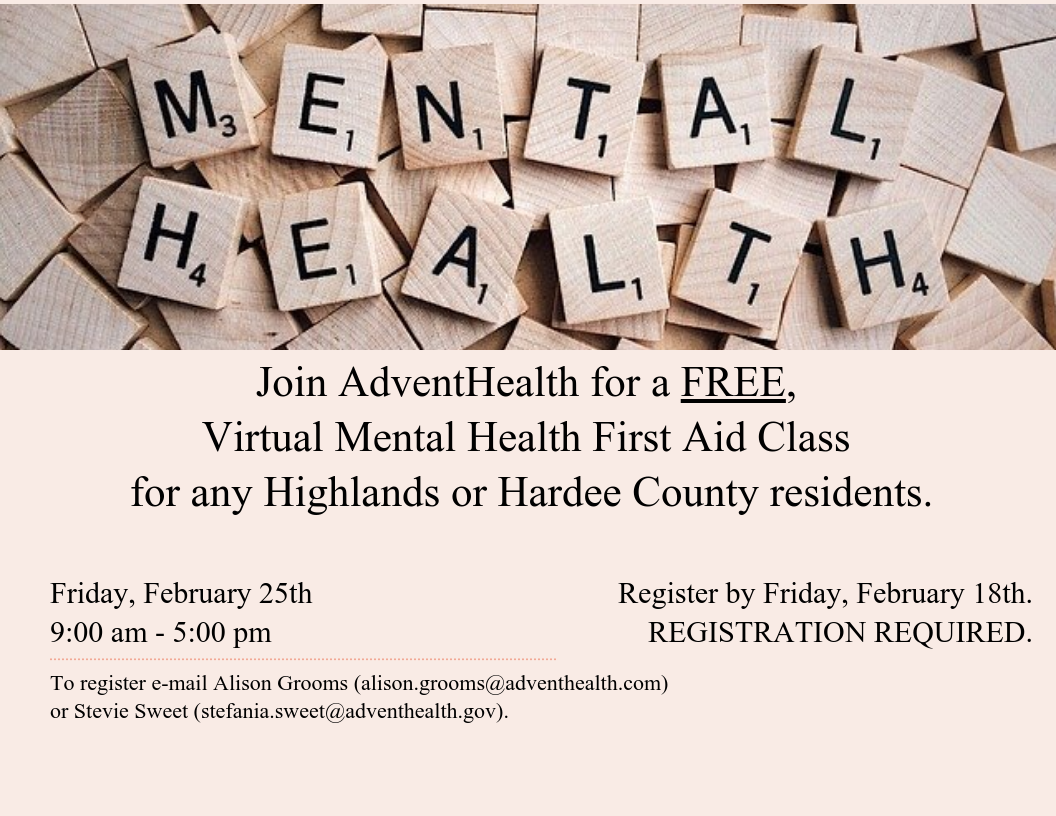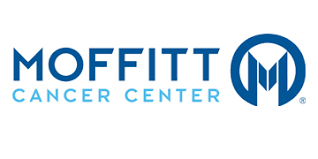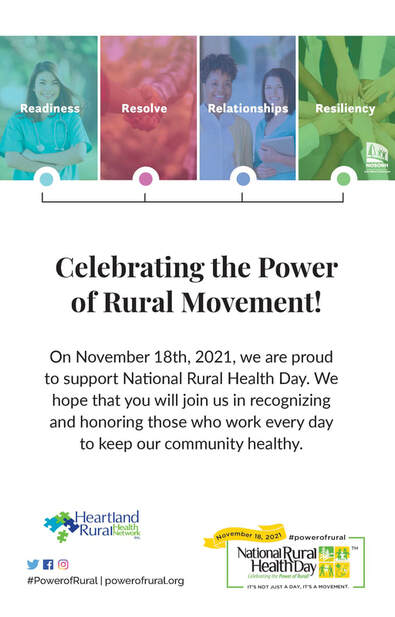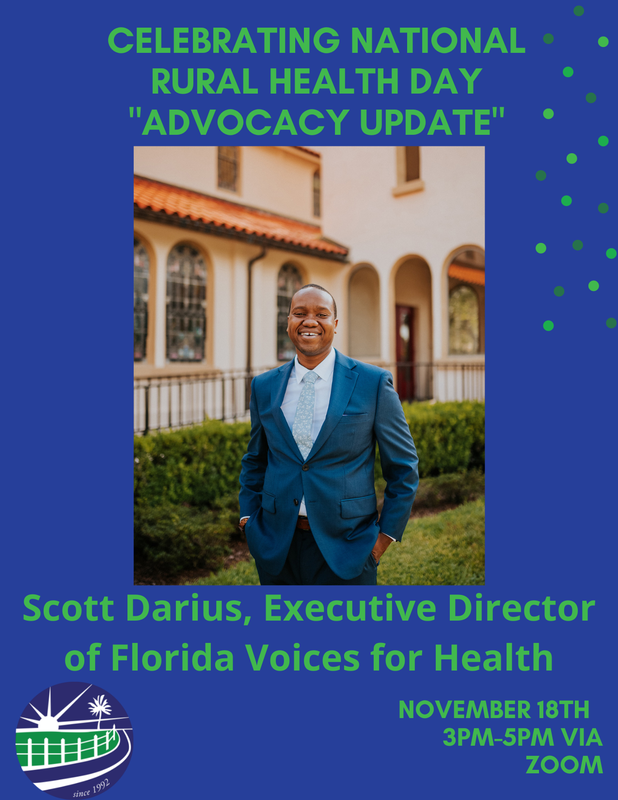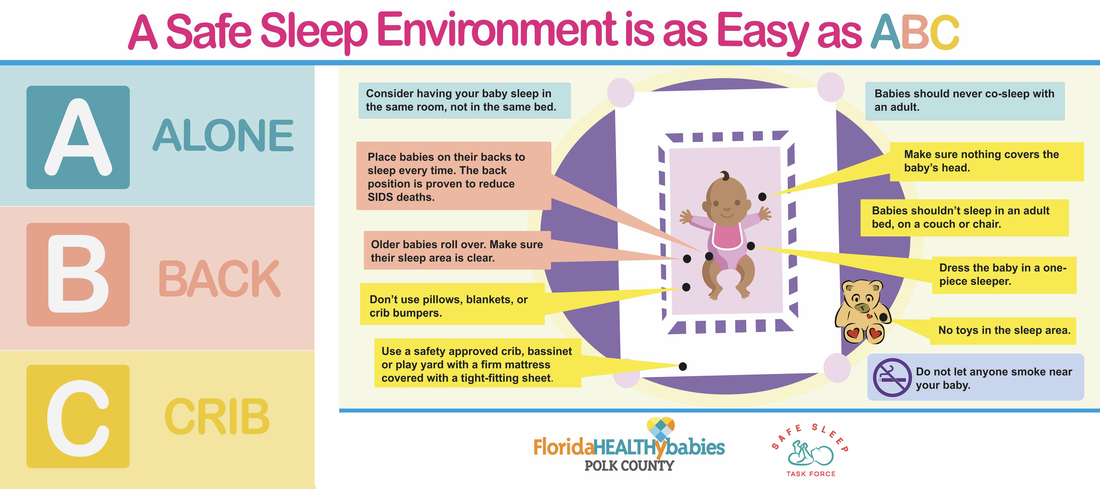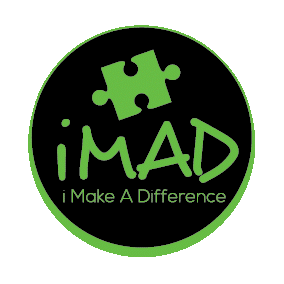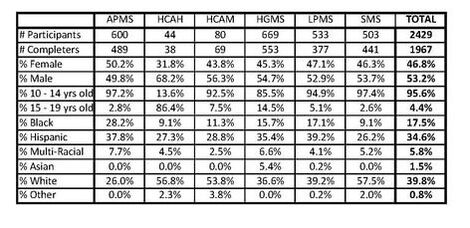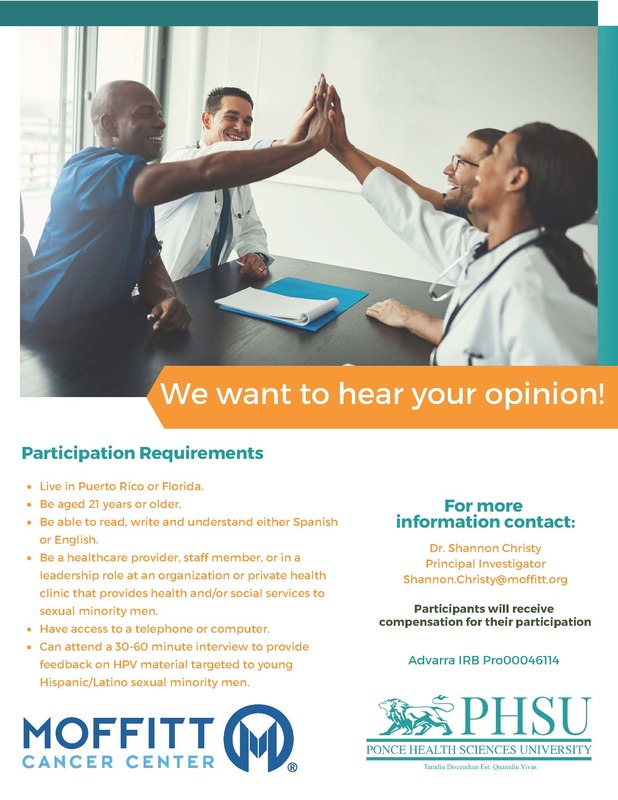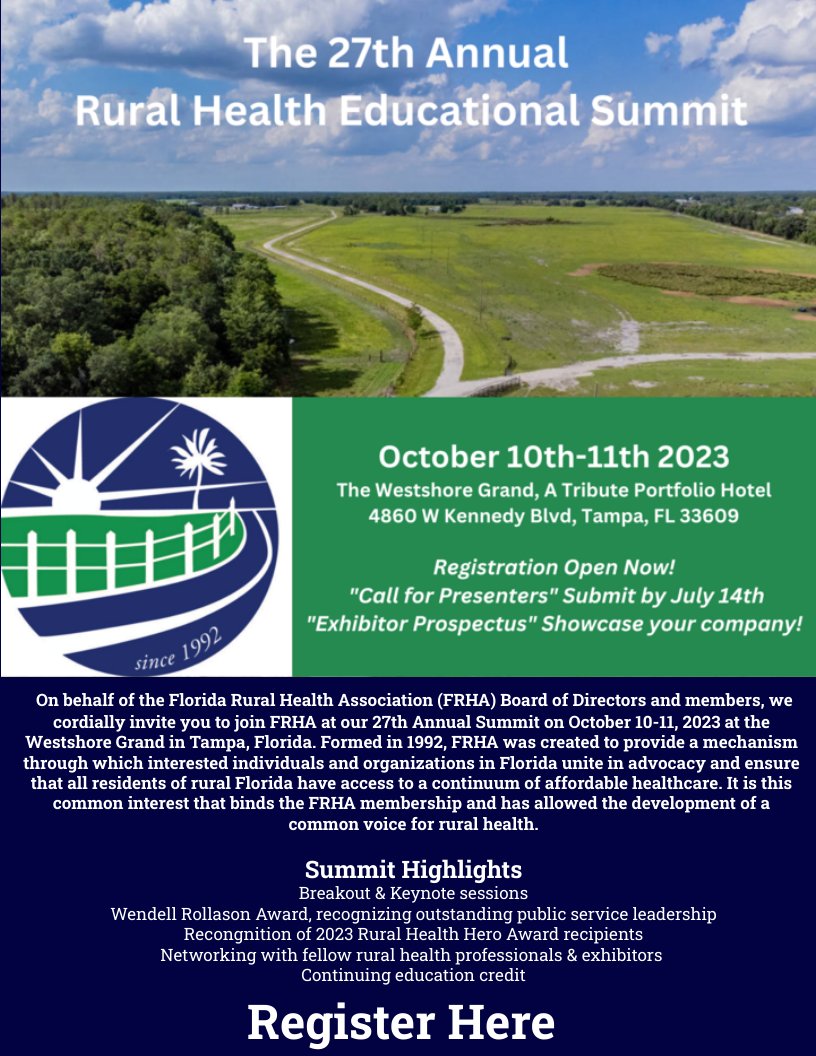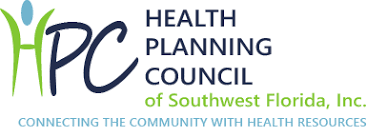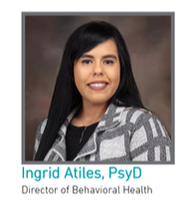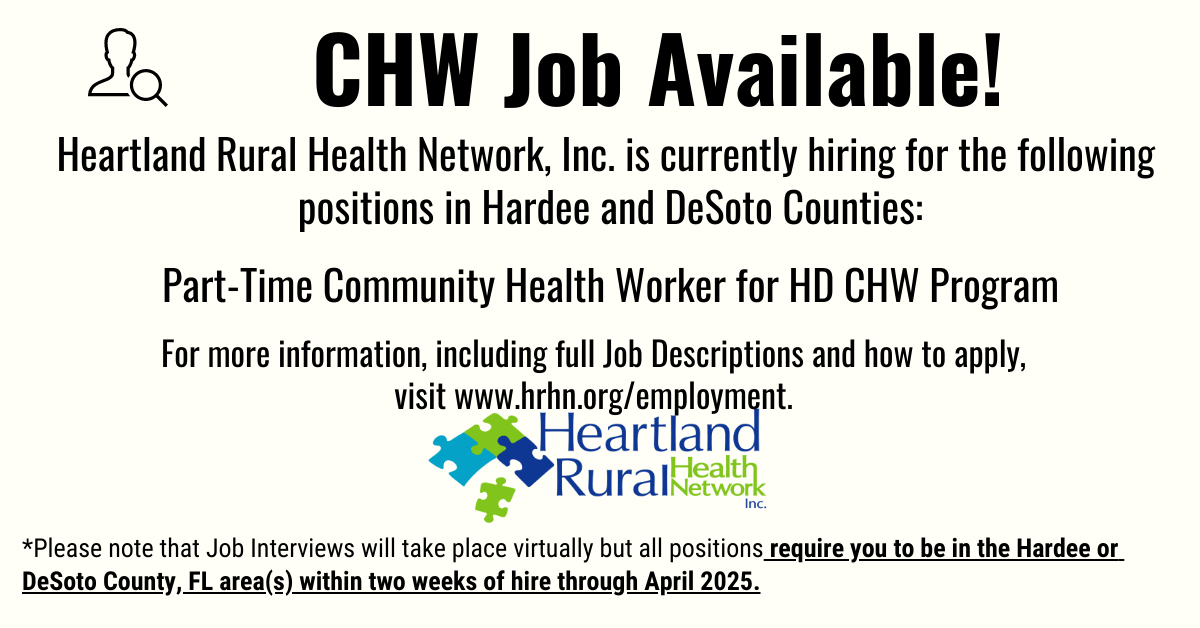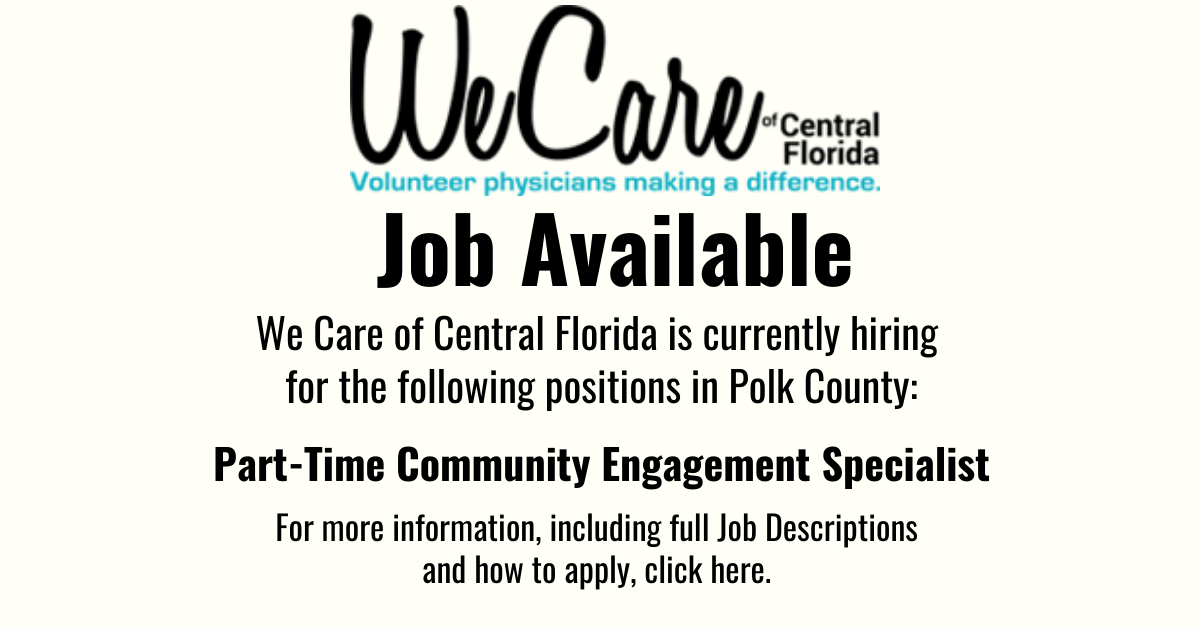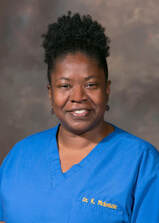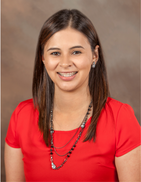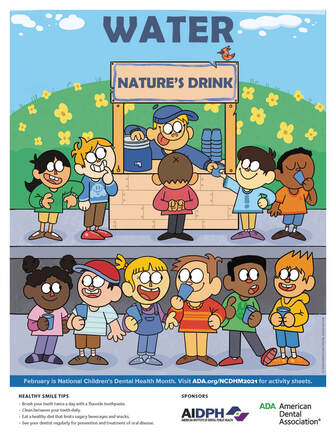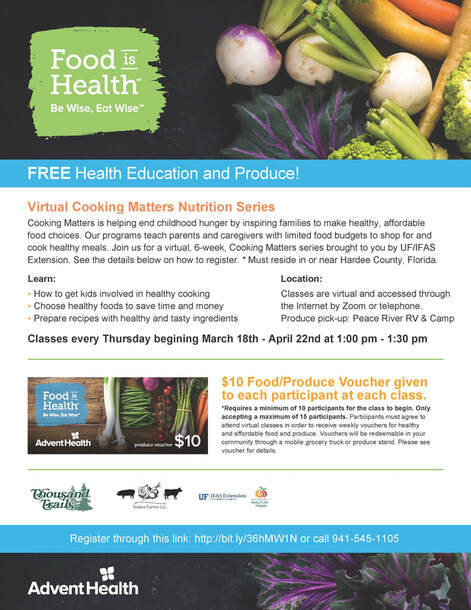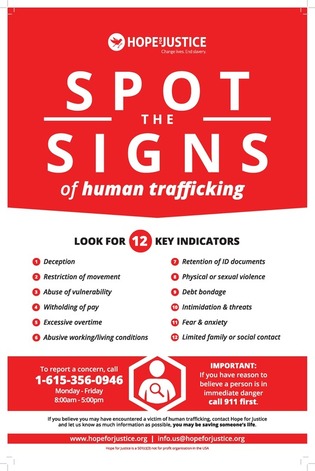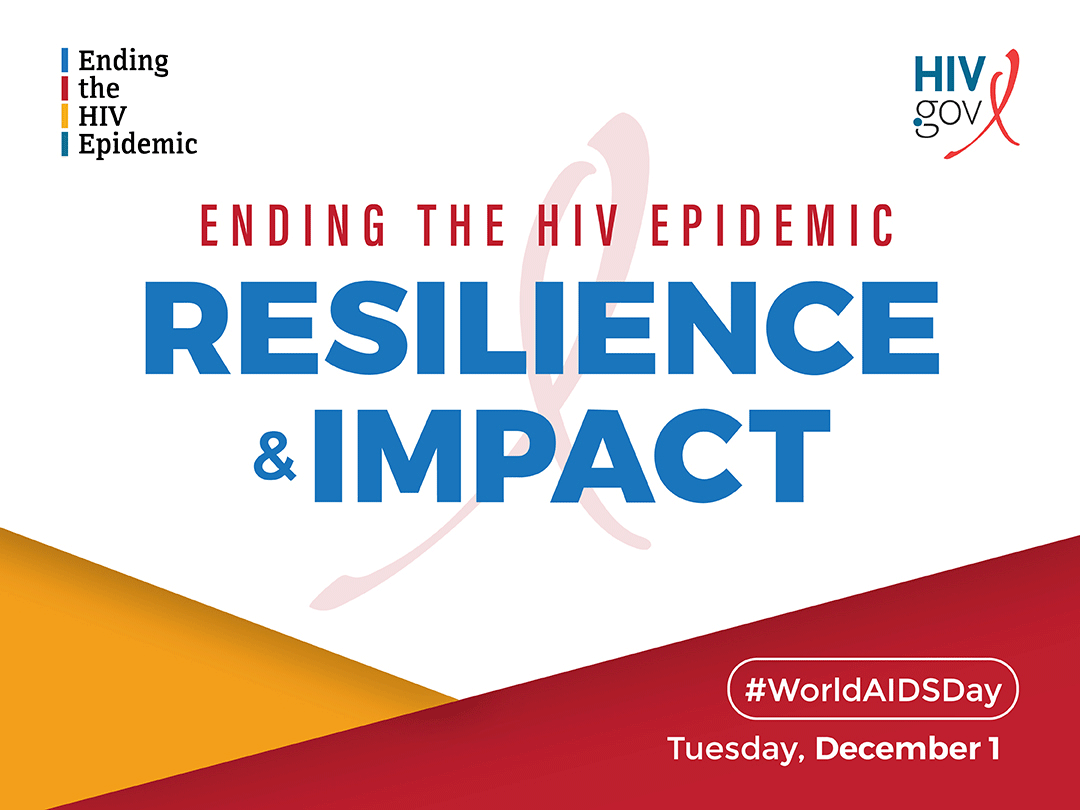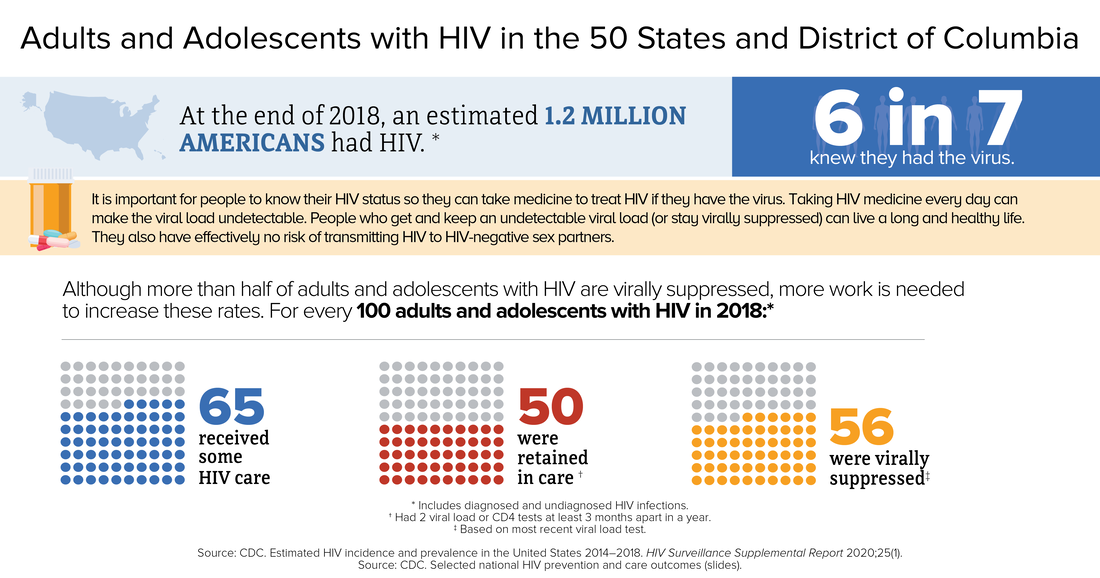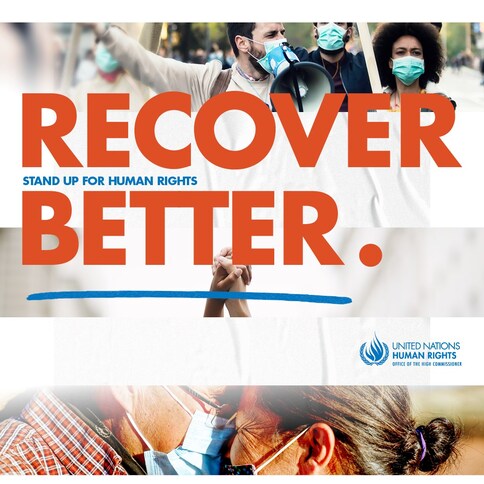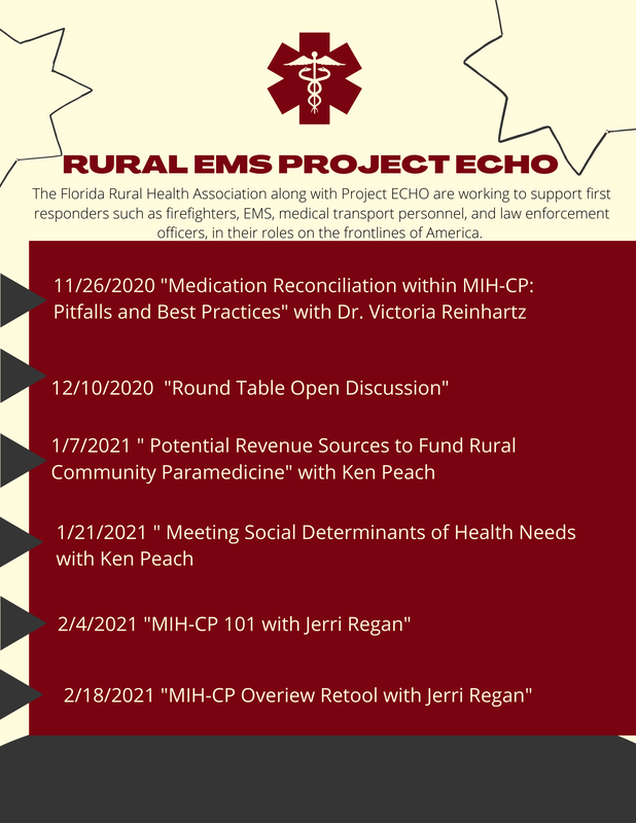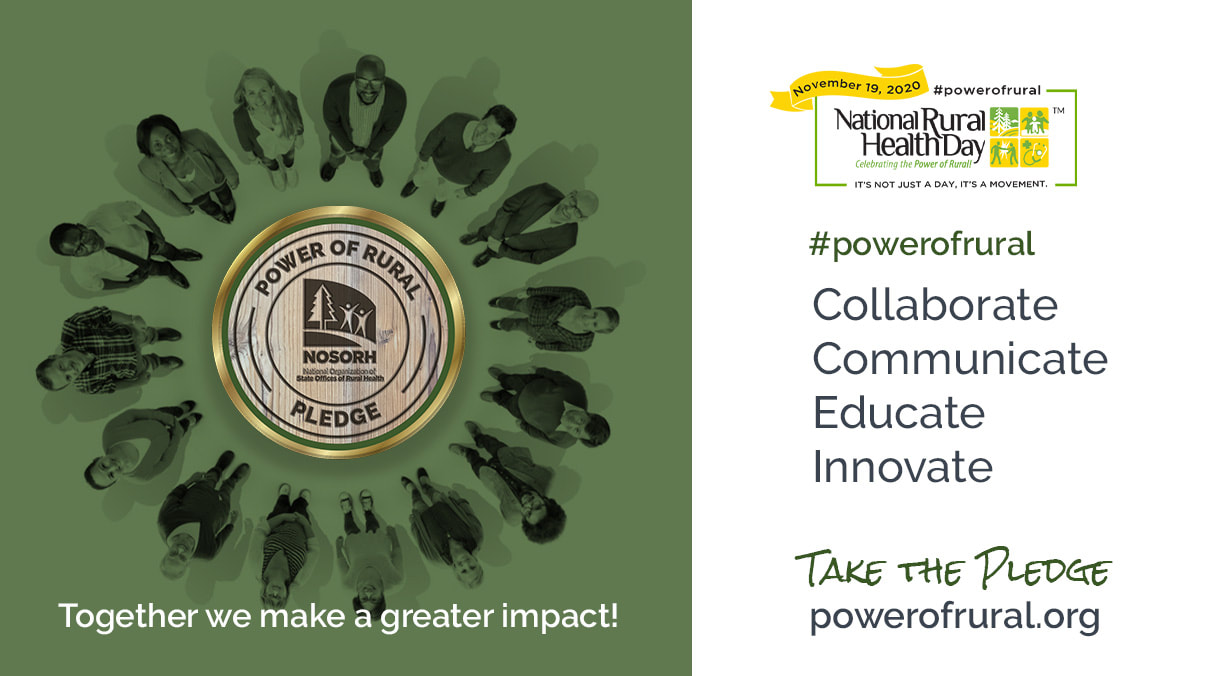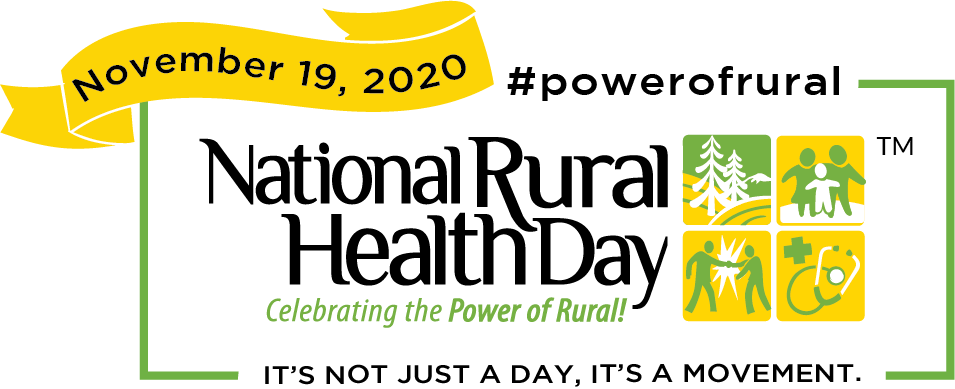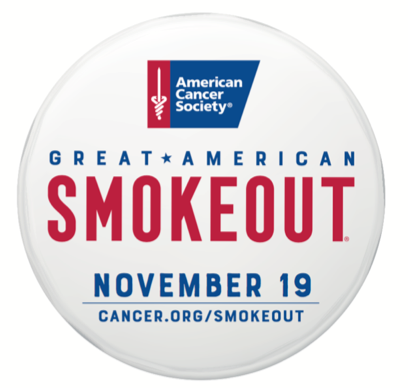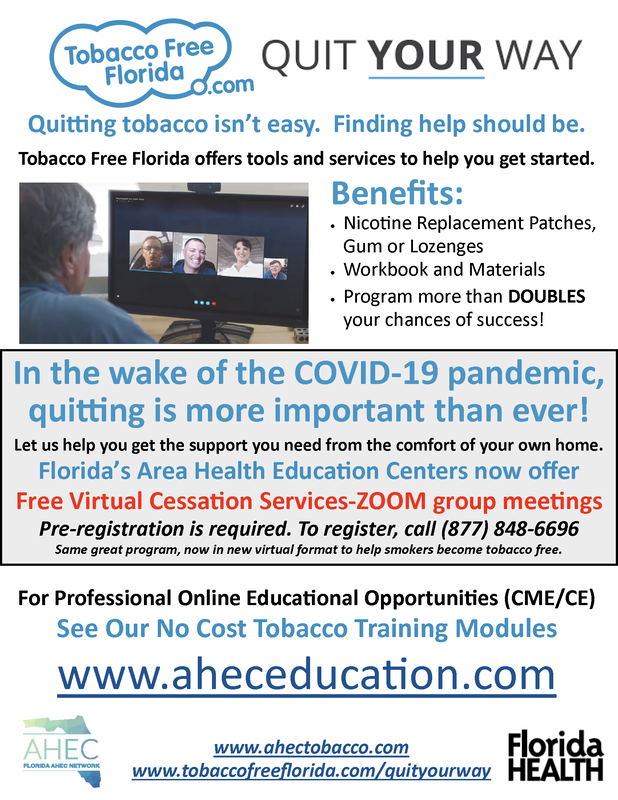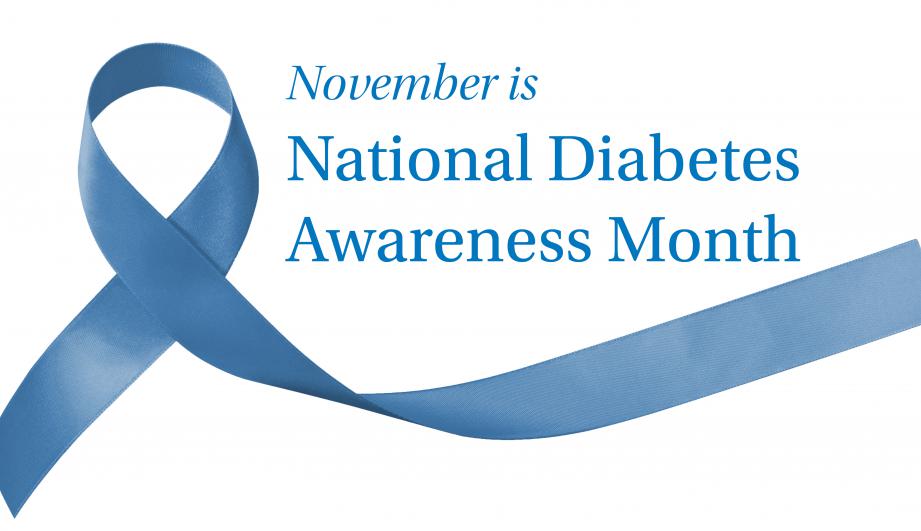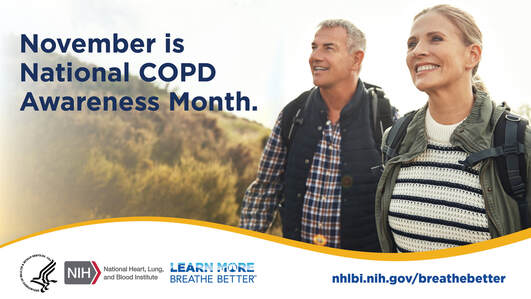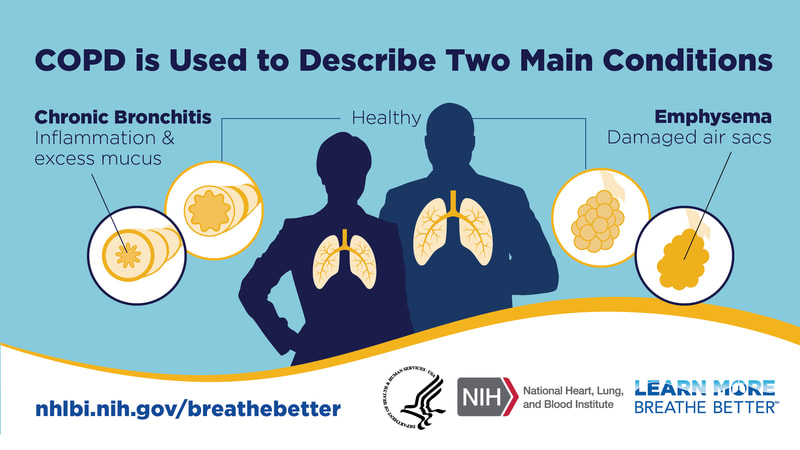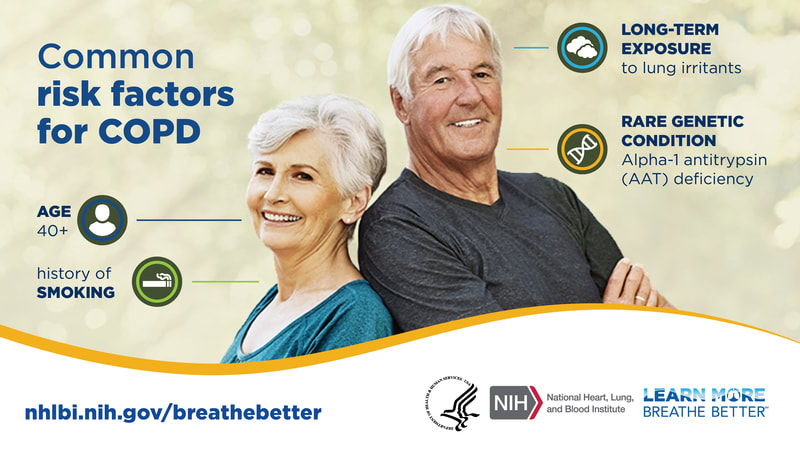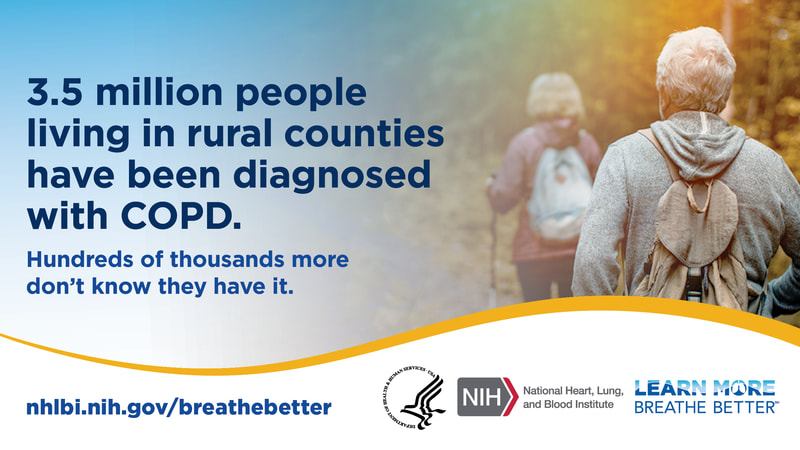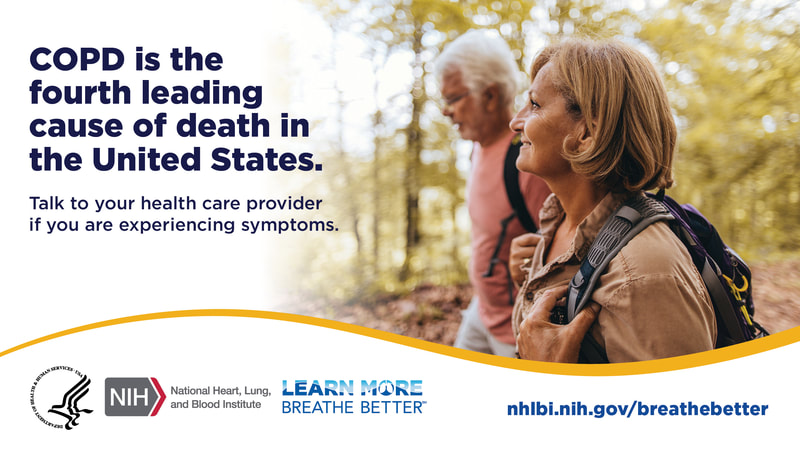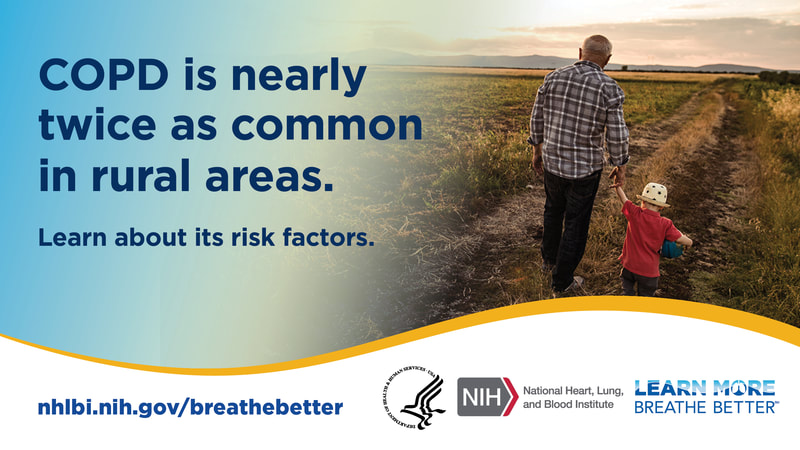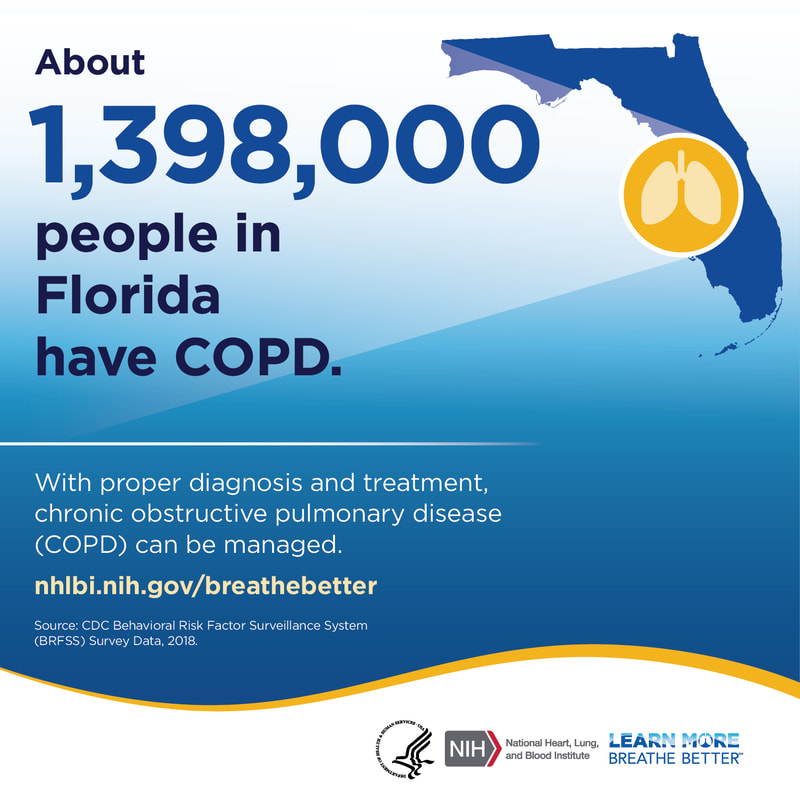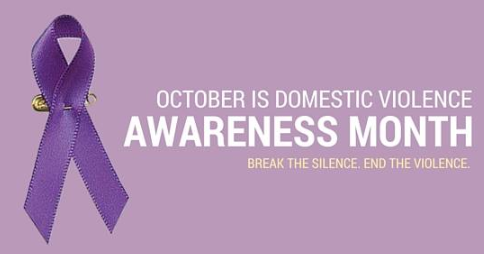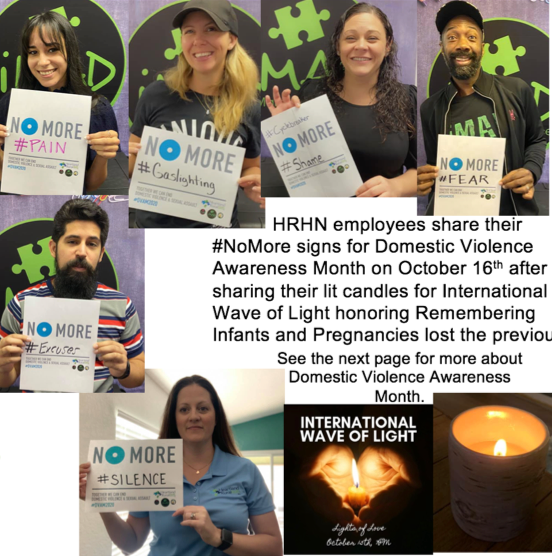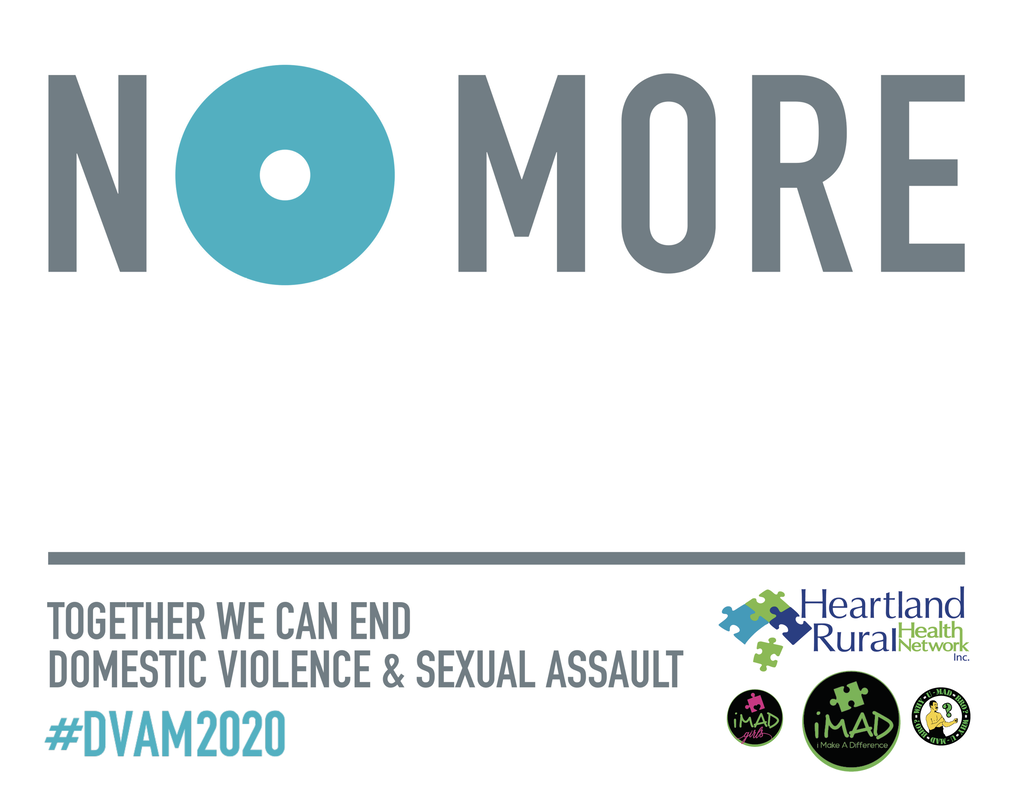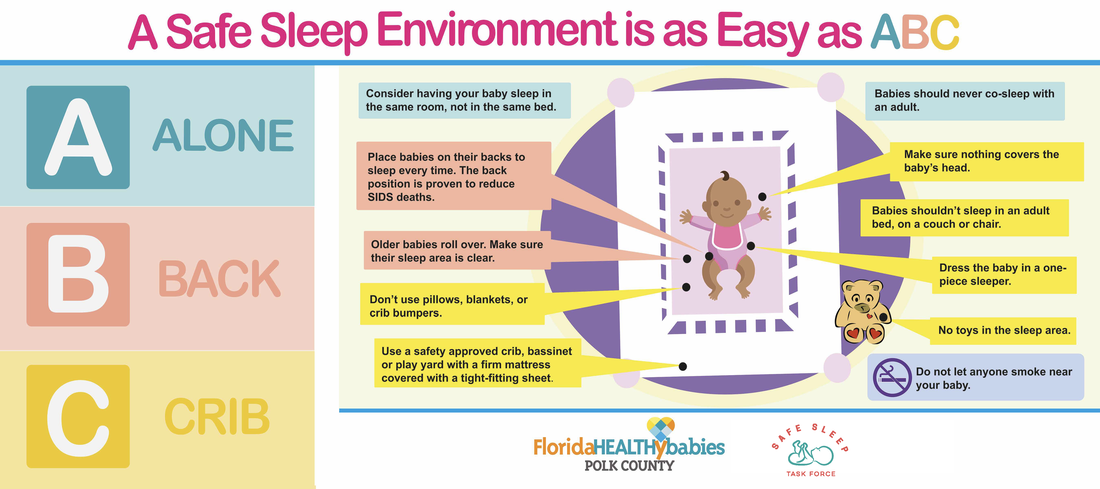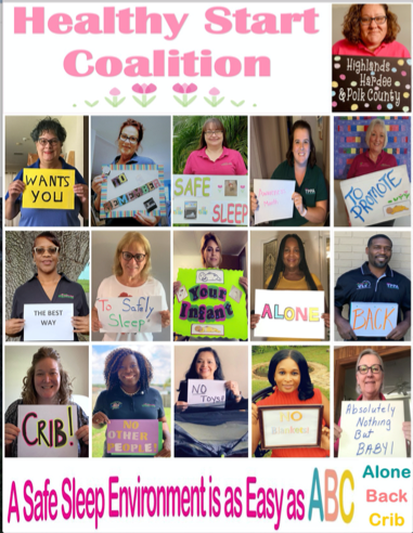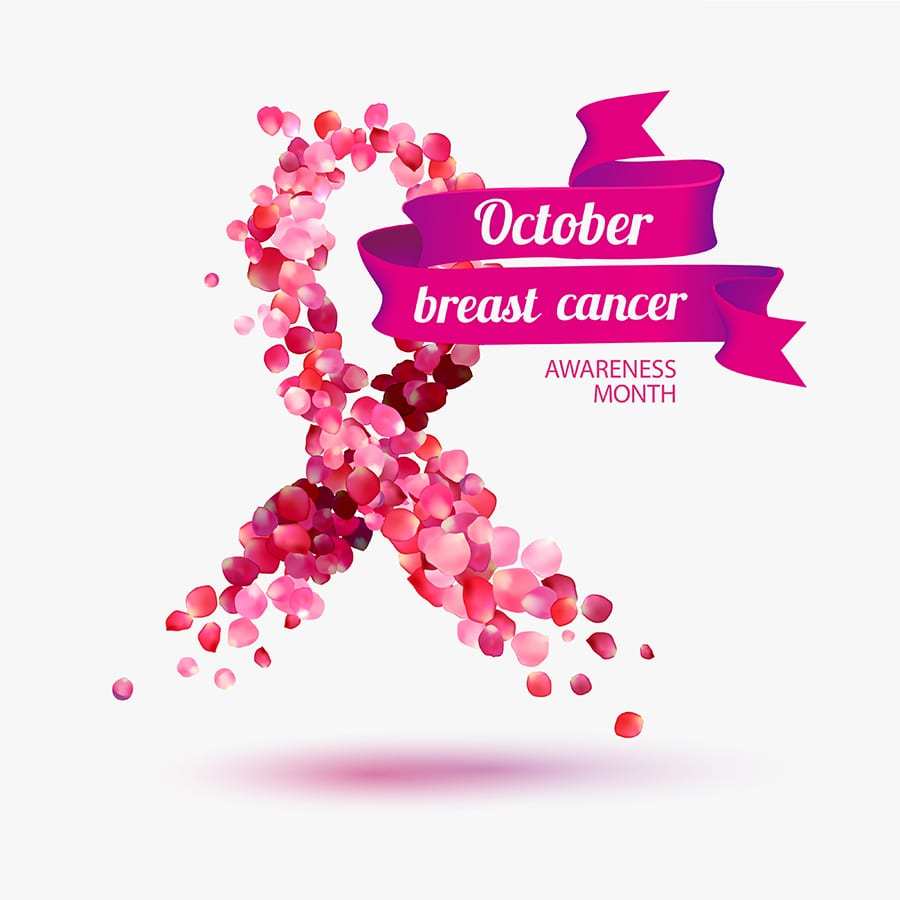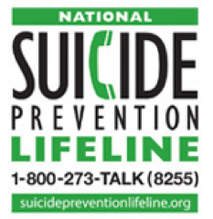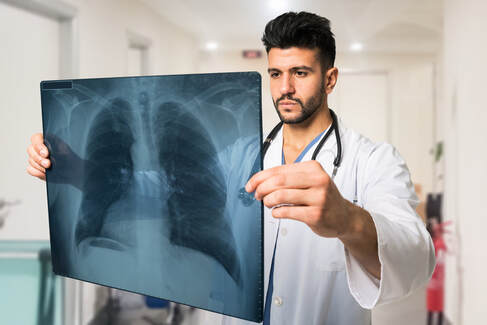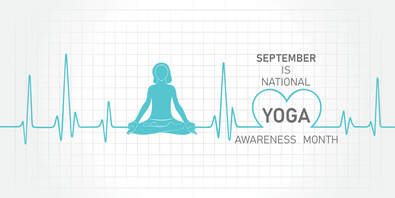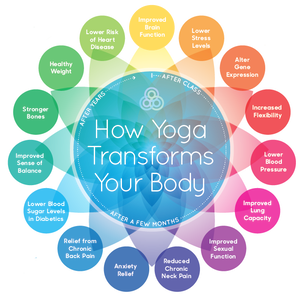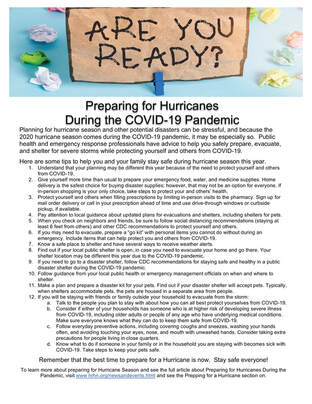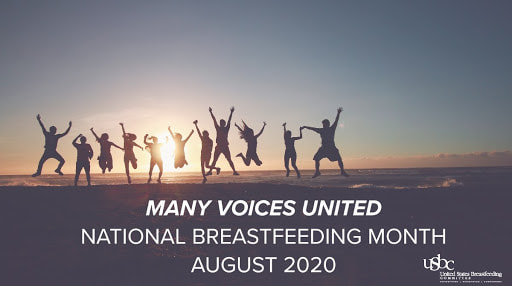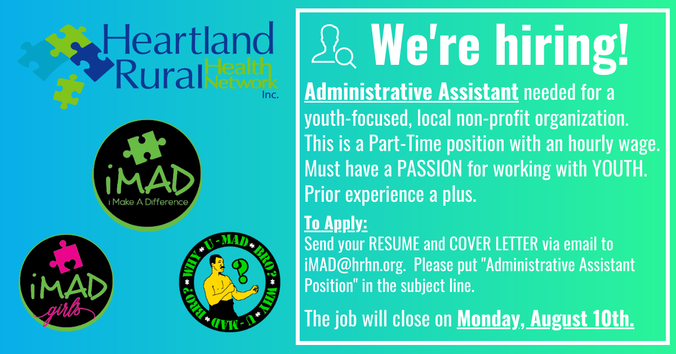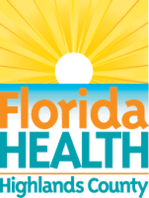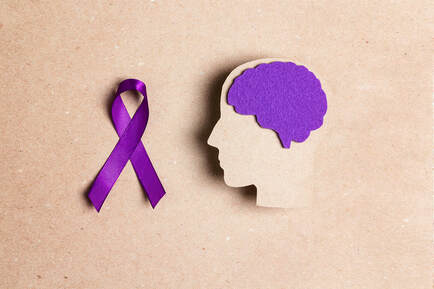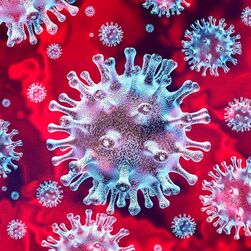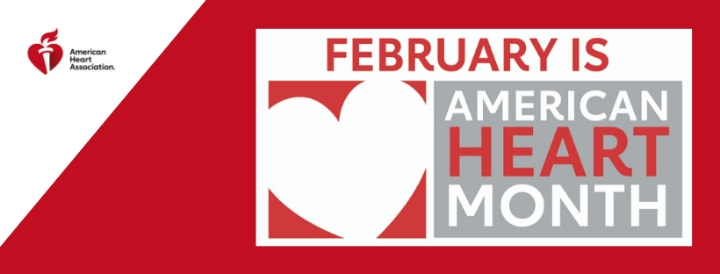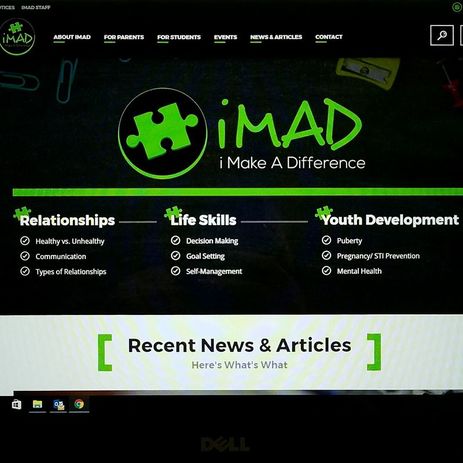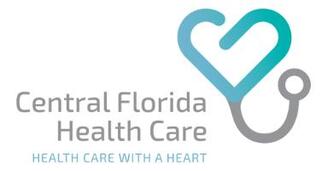News and Events
2023 Quarter 4 Newsletter
2023 Quarter 3 Newsletter
2023 Quarter 2 Newsletter
|
Our partners at Tampa General Hospital offer Community Programs every month. These programs include, but aren't limited to caregiver classes and support, cancer support groups, mental health first aid, tobacco cessation, community medical support, town halls, and many more! Some of these community programs are even offered solely in Spanish!
You can check the out for yourself by visiting their calendar online at any time. |
Don’t Stress Over Stress
Worry is a natural part of life but can affect your overall health. Americans live stressful lives today, and technology at our fingertips can add to it. April is Stress Awareness Month, and Central Florida Health Care reminds you there are healthy ways to cope!
Stress can manifest as frequent mood swings, trouble sleeping, changes in appetite, difficulty concentrating, and feeling overwhelmed. Stress can lead to feelings of sadness, frustration, worry, stomach pain, headaches, and more. In the heightened moment or the peak of stress, specific hormones can increase heart rate, blood pressure, and glucose levels. Continued stress can increase the risk of stroke, heart attacks, and heart disease. Central Florida Health Care’s Integrated Behavioral Health Center helps patients find the best stress management method. Our team wants you to understand that you are most vulnerable when you are not getting enough sleep, experiencing life changes, are in poor physical health, have poor eating habits, and have a poor network of support. Furthermore, knowing how to reduce stress can be most helpful. Wendy Clark, a Psychiatric Mental Health Nurse Practitioner with CFHC, says, “Ways to reduce stress include managing your time with prioritization. Another technique is to practice relaxation, exercise daily, set aside “you” time, eat well and with a purpose, promote good sleep hygiene, know your needs, and always work to limit or avoid alcohol and drugs.” If you are having trouble coping with stress and worry, we encourage you to make an appointment with one of our mental health professionals to help you create a wellness plan. National Alliance on Mental Illness. (n.d.). Managing Stress. Retrieved from https://www.nami.org/Your-Journey/Individuals-with-Mental-Illness/Taking-Care-of-Your-Body/Managing-Stress Let's Get Real About Men's HealthMen work hard and play hard! Now it's time to work just as hard on your health! June is Men's Health Month, the perfect time to remind Dad or any man you know to stay on top of their health.
While people are living longer, studies show the average lifespan for a man is about five years less than a woman's. One factor is women are more likely to visit a doctor. According to the Centers for Disease Control and Prevention, heart disease, cancer, and unintentional injuries are the leading causes of death for men. Knowing your family health history is a great place to start and might signify the need to get screened early for certain cancers. Central Florida Health Care has Heart for educating our male patients on how to feel their best. Dr. David Washington in our Mulberry Health Center likes to understand everything he can about his patients, their health issues, concerns, and lifestyle. Culture and barriers to healthcare can play a role in a cancer diagnosis, so education is key. Avoiding tobacco, eating healthy, limiting alcohol, and protecting the skin from the sun are all ways to lower the risk of cancer. Dr. Washington says it's important for men to check their blood pressure, cholesterol, prostate, and testosterone levels. Exercising several days a week can lower your blood pressure and also helps prevent heart disease. This may be the month to join a gym, running club, or sports team. It's important to stay active, which also helps you relax! Call and schedule an appointment with a provider today. Your body will thank you for it. |
Put Your Mental Health First
With Mother’s Day approaching, one of the best gifts is not expensive. It’s the gift of rest. May is Mental Health Awareness Month and Women’s Health Month, a perfect time for women to recharge their batteries.
Women naturally are givers, and moms typically put everyone else before themselves. But when taking on so much, maintaining healthcare can be last on the list of to-dos. But to be your best, you must feel your best. Millions of people live with a mental illness, whether dealing with anxiety, ADHD, depression, PTSD, an eating disorder, psychosis, etc. If untreated, conditions will get worse over time. Treatment varies from patient to patient when it comes to improving mental health. For example, a supportive health provider can help patients establish treatment plans, such as therapy, teaching relaxation skills, or prescribing medications or holistic approaches. Along with checking the box for establishing good mental health, moms also need to make time for routine check-ups. Women’s Health Month aims to empower women to prioritize their health. Screening for different cancers is a proactive measure to stay on top of one’s health. An early diagnosis is lifesaving. Sticking to a healthy diet, getting plenty of rest, and staying hydrated is key. Central Florida Health Care’s Winter Haven Integrated Behavioral Health Center can help patients receive behavioral health services and medical services under one roof, making it convenient for moms to take care of themselves while juggling busy schedules. Encouraging moms to prioritize self-care and rest can also have long-term mental and physical health benefits. Taking care of oneself can help reduce stress, improve mood, and increase energy levels. This can be especially important for new moms experiencing sleep deprivation, hormonal changes, and the demands of caring for a newborn. Self-care activities can include:
In addition to self-care, getting enough rest is crucial for overall health and well-being. This can be challenging for new moms adjusting to their baby’s sleep schedule or dealing with sleep disturbances. However, prioritizing rest whenever possible can help improve mood, cognitive function, and physical health. Encouraging moms to prioritize self-care and rest can also model healthy behaviors for their children, promoting self-care and stress management as a lifelong practice. |
2023 Quarter 1 Newsletter
CHFC Gets Down to the Heart of the Matter |
Sickle Cell Disease ~ What You Need to Know |
|
February is American Heart Month. Are you Heart Healthy? This month Central Florida Health Care encourages you to focus on cardiovascular health. It’s time to know your risks for heart disease. High blood pressure, high cholesterol, and smoking are all risk factors, and many Americans have at least one.
High blood pressure typically has no symptoms, so checking it will help you recognize if you need to make any lifestyle changes. Changes may include taking a certain medication if blood pressure is too high or changing your diet. Moderate exercise can help improve blood pressure too. High cholesterol is a health game changer because it can cause build-up in your arteries and harm your heart. Obesity can result from eating too many foods high in cholesterol. Limiting salt intake and eating more fruits and vegetables can reduce cholesterol. Nicotine also raises blood pressure, and cigarette smoking increases your chance of a heart attack. Central Florida Health Care’s Assistant Chief Medical Officer, Dr. Andrew Hein, gives patients this advice, “I would much rather prevent a disease than treat it. Heart disease has so many ways that we can focus on prevention, and it generally boils down to lifestyle. If you strive for 150 minutes of moderately strenuous exercise per week, limit the bad saturated fats, and focus on the amazing antioxidants, bioflavonoids, and healthy fats that come from eating more plants, you can significantly reduce your risk of a heart attack or disabling stroke. And if you smoke, quit. That’s all there is to it.” Being proactive is key. To stay on top of your health, schedule a visit with your provider regularly and ask more on how you can stay healthy. We have heart for your best health. |
Living with pain is difficult, and those with Sickle Cell Disease (SCD) know the challenges first-hand. It’s not a disease one can catch. It’s an inherited blood disorder present at birth that causes red blood cells, shaped like a sickle (C-shaped), to stick together and block blood flow and oxygen to parts of the body. All babies born in the U.S are screened for this disease. People with SCD experience a “Pain Crisis,” which can lead to anemia, infection, and other serious health problems. SCD can often require hospitalization and multiple visits to your provider.
SCD affects around 100,000 Americans, according to the Centers for Disease Control and Prevention, and impacts mostly the African American population but can affect any race. Central Florida Health Care Chief Medical Officer Dr. Cara Nelson James says individuals with sickle cell trait can pass along the sickle cell gene even if they don’t have the disease. Knowing your status is key, especially if you have any family history of sickle cell disease or sickle cell trait. Since there is a chance to pass the gene to unborn children, reproductive counseling and planning are important. Individuals with SCD can still have full lives. Quality medical care from a trusted provider can help prevent serious problems. For example, adults and children need to receive regular health check-ups. Common illnesses can become dangerous for children, so hand washing, proper food safety, and getting annual vaccines, like the flu vaccine, are extremely important. Healthy habits and lifestyle behavior can also help prevent SCD complications. Drinking plenty of water, avoiding high altitudes, avoiding places or situations with exposure to low oxygen levels, including exercising extremely hard can help. It’s important as well to not get too hot or too cold. Blood transfusions can also treat severe anemia. Talk with your provider when deciding how to care for yourself with an SCD diagnosis. Bone marrow or a stem cell transplant is a possible cure, and your provider can educate you on those potential procedures and what may work best for you. |
National Birth Defects Prevention Month
Bringing a baby into the world is one of the most beautiful moments in life. But sometimes, new babies face challenges due to birth defects. January is National Birth Defects Prevention Month and Central Florida Health Care encourages making healthy choices during pregnancy to help reduce a baby’s chance of having a birth defect.
If you’re planning to have a baby, take 400 micrograms of Folic Acid, which contains vitamin B, before and during pregnancy. Taking folic acid can help prevent severe birth defects in the brain and spine. It’s also important to have a diet rich in folate.
Central Florida Health Care’s Chief of Pediatrics Heather Wardy says, “Birth defects can be caused by genetic abnormalities or environmental exposures, though we often don’t know the underlying etiology. Not all birth defects can be prevented, but women can take steps to reduce their risk. It’s important to establish care with your OB provider as soon as you know you’re pregnant, and then continue to receive regular prenatal care. Taking a daily prenatal vitamin with folic acid is the best tool to help prevent abnormalities of your baby’s brain and spine. If you take other medications, check with your OB provider to make sure they’re safe to take during pregnancy.”
The Centers for Disease Control and Intervention says smoking cigarettes during pregnancy can lead to preterm birth and certain defects, including cleft lip or cleft palate, which is why no smoking is encouraged, including marijuana. Alcohol can also be harmful and potentially cause a miscarriage, stillbirth, and other lifelong physical and behavioral issues. Preventing infections during pregnancy is also important, as viruses and other infections can harm a developing baby. If you do get sick with a fever, treat it promptly.
While it sounds simple to “eat healthy” during pregnancy, it’s not always easy, especially when cravings are involved. Obesity and not keeping diabetes under control can increase the risk of complications during pregnancy and could lead to birth defects. Talk to your provider about the best way to maintain a healthy weight.
Central Florida Health Care has prenatal services to guide pregnant moms along their journey. Our pediatric team is then ready to oversee your baby’s primary care. Communication with your provider is important and will hopefully give you peace of mind.
If you’re planning to have a baby, take 400 micrograms of Folic Acid, which contains vitamin B, before and during pregnancy. Taking folic acid can help prevent severe birth defects in the brain and spine. It’s also important to have a diet rich in folate.
Central Florida Health Care’s Chief of Pediatrics Heather Wardy says, “Birth defects can be caused by genetic abnormalities or environmental exposures, though we often don’t know the underlying etiology. Not all birth defects can be prevented, but women can take steps to reduce their risk. It’s important to establish care with your OB provider as soon as you know you’re pregnant, and then continue to receive regular prenatal care. Taking a daily prenatal vitamin with folic acid is the best tool to help prevent abnormalities of your baby’s brain and spine. If you take other medications, check with your OB provider to make sure they’re safe to take during pregnancy.”
The Centers for Disease Control and Intervention says smoking cigarettes during pregnancy can lead to preterm birth and certain defects, including cleft lip or cleft palate, which is why no smoking is encouraged, including marijuana. Alcohol can also be harmful and potentially cause a miscarriage, stillbirth, and other lifelong physical and behavioral issues. Preventing infections during pregnancy is also important, as viruses and other infections can harm a developing baby. If you do get sick with a fever, treat it promptly.
While it sounds simple to “eat healthy” during pregnancy, it’s not always easy, especially when cravings are involved. Obesity and not keeping diabetes under control can increase the risk of complications during pregnancy and could lead to birth defects. Talk to your provider about the best way to maintain a healthy weight.
Central Florida Health Care has prenatal services to guide pregnant moms along their journey. Our pediatric team is then ready to oversee your baby’s primary care. Communication with your provider is important and will hopefully give you peace of mind.
|
Our partners at Tampa General Hospital offer Community Programs every month. These programs include, but aren't limited to caregiver classes and support, cancer support groups, mental health first aid, tobacco cessation, community medical support, town halls, and many more! Some of these community programs are even offered solely in Spanish!
You can check the out for yourself by visiting their calendar online at any time. |
2022 Quarter 4 Newsletter Articles
Think Fast, Think Pink, Think BeatWe all know breast cancer is a leading form of cancer among women. Yes, mammograms are uncomfortable; mammograms take time out of your day; mammograms can be costly. However, YES, mammograms CAN save your life, so it’s important to say Yes; I’m going to schedule one today.
|
|
Our partners at Tampa General Hospital offer Community Programs every month. These programs include, but aren't limited to caregiver classes and support, cancer support groups, mental health first aid, tobacco cessation, community medical support, town halls, and many more! Some of these community programs are even offered solely in Spanish!
You can check the out for yourself by visiting their calendar online at any time. |
NRHA funds and directs the NSCH, which is a household survey conducted annually by the U.S. Census Bureau. The NSCH produces national and state level data for key measures of child health and well-being. These data are essential to understanding the health status and health services needs of children across the nation and in your state and community.
To check out more information on the NSCH, see data, or watch a video discussion between Dr. Reem Ghandour, Director of the NSCH, and LCDR Leticia Manning of the Division of Services for Children with Special Health Needs, click the link below.
To check out more information on the NSCH, see data, or watch a video discussion between Dr. Reem Ghandour, Director of the NSCH, and LCDR Leticia Manning of the Division of Services for Children with Special Health Needs, click the link below.
2022 Quarter 3 Newsletter Articles
Healthy Start Coalition: Community Doulas
We are celebrating our Executive Director, Melissa Thibodeau's, 10 years of dedication and service to Heartland Rural Health Network this August. Melissa started with us in 2012 as a Health Educator under our G.O. G.I.R.L.S. program. She quickly rose within the organization to Program Director of the Diabetes Master Clinician Program. Melissa took on additional responsibilities and helped to grow CHW-led work with her involvement with the Florida Community Health Worker Coalition since 2013. Melissa then became the Health Planning Director in 2015 and Executive Director in 2016. During her time with HRHN, she has written numerous grants and proposals that have helped grow the Network. She has been involved in TPPA, CAG, Healthy Start, CFHC Board of Directors, FRHA Board of Directors, RCMA HSAC, Highlands CHIP, DeSoto D-CHAT, Healthy Hardee, and many more community organizations. We are so happy to wish Melissa a happy 10 years with HRHN!
|
Stay Away, Harmful Rays!
June was Men's Health Month
Calling all men! Listen up; it’s time to get real with your health! Heart disease and smoking both remain the top causes of death for men in the U.S. We celebrate fathers in June, which is why it’s one of the best months to advocate better health for men. Central Florida Health Care encourages all men to see a provider for a wellness visit, especially if they’re 45 or older. Huey Metts, APRN, treats male patients every day at Central Florida Health Care, and often he’s to the point when it comes to changing lifestyles for the better. Metts says every man 45 years or older should have a fit test, a colonoscopy, and blood work done. Why? If there’s an issue, there’s a very good chance you can correct the problem early and live a longer, healthier life. The three key instructions he provides to male patients are this; Eat three meals a day, exercise three to four days a week for 30 minutes, and if you take medication, don’t skip a dose. It seems like simple advice, right? It may require some daily changes in your routine. Metts says you can gain weight by skipping meals when it comes to eating. Food burns energy, and the body needs nutrients to keep from storing fat. However, he does not suggest intermittent fasting to lose weight, just clean eating three times a day with healthy snacks. Walking, running, biking, and swimming are all good exercise choices; however, Metts caution those over 50 to walk versus the run to protect the knees. Taking prescribed medications on a set basis is incredibly important, especially if you have diabetes, to keep insulin levels safe. Smoking can also lead to a lot of problems for men. For instance, Metts says men who smoke are 60% more likely to increase their chance of erectile dysfunction. So, there’s no better time than now to kick the habit. Seeing a provider is just the start to maintaining good health, but Metts says it’s up to the patient to make and carry out changes in their life at the end of the day. If you would like to schedule a wellness visit with Central Florida Health Care and receive more information on men’s health, call 866.234.8534. |
2022 Quarter 2 Newsletter Articles
Stroke: The Need for Speed
|
Treat Heart Disease and Hypertension with Your Diet
|
2022 Quarter 1 Newsletter Articles
New Year, New Hope for Rural America in the Fight Against COVID
|
Empath Hospice Granted Initial Award to Expand Services to Hardee, Highlands and Polk Counties
|
|
A New Year rings in and the COVID pandemic is still with us. Pandemic fatigue is understandable at this point. But the loss of more than 824,000 Americans to date and the arrival of a new, more transmissible variant, should drive a renewed push to turn the tide.
We have the tools to do it. We know where our focus must be, but one area of great concern is rural America. Rural communities are among the hardest hit as another wave of the pandemic rolls across America and Omicron renews COVID’s assault on the unvaccinated. Last fall, the incidence rates of COVID-19 in rural America were roughly 54 percent higher than elsewhere in the country, according to the Rural Policy Research Institute. To date, if you live in a rural community, you are more than twice as likely to die from COVID than those in nonrural areas. Analysis from The Daily Yonder showed that incident rates climbed nearly 50 percent in rural counties in the two weeks following the Thanksgiving holiday, a worrisome trend with the rapid spread of the Omicron variant now. The disparity requires an effort to reach families in these communities with trusted voices, sound science, and accurate information. Trusted rural voices have banded together with the National Rural Health Association (NRHA) and COVID Collaborative to address the disparity and look for opportunities to speak directly with rural Americans about the vaccines. To continue reading this article, click here. HRHN is launching a new Vaccine Initiative with our CHWs. If you want more info, email us at [email protected]. |
Empath Health announced that its affiliate organization Empath Hospice has been granted initial approval by the Agency for Health Care Administration to deliver hospice care services in Hardee, Highlands, and Polk counties.
Empath Hospice is built on the foundation of Suncoast Hospice and Tidewell Hospice, which have beeb providing pioneering care in the Tampa Bay and Southwest Florida regions for a combined 85 years. Empath Health CEO Rafael J. Sciullo said, "We are so honored to have the opportunity to serve the residents of Hardee, Highlands and Polk counties and their families with the expert, compassionate care we've been providing across our region." Empath Hospice brings several unique services to residents, including an Empath Mobile Access to Care unit for outreach activities in rural and low-income areas and a partnership with Heartland Rural Health Network to help community health workers reach patients with chronic, advanced or terminal illness. To continue reading this article, click here. |
Central Florida Health Care, Inc. Opens New
|
Raising Awareness on Birth Defects
|
Children’s Dental Treatment Brings Lifelong Smiles |
|
Pregnancy is a beautiful, life-changing process, but discussing the possibility of birth defects is not always an easy topic.
January is National Birth Defects Awareness Month, highlighting how women can increase their chance of having a healthy baby during pregnancy. The Centers for Disease Control and Prevention tells us every four and a half minutes, a baby is born with a birth defect in the U.S. The most common include, down syndrome, heart defects, spina bifida, and cleft lip/palate. While not all birth defects are preventable, providers list important steps women should follow. Taking 400 micrograms of folic acid daily can help prevent major birth defects of the baby's brain and spine, especially when taken before becoming pregnant. Folic acid can come from fortified foods, like bread, eggs, milk, or supplements. It's also very important to maintain a healthy diet and weight. Other ways to reduce the risk are to manage diabetes and refrain from smoking, drinking, and taking drugs. Infections can also be harmful during pregnancy, which is why it's important to talk with your provider about certain vaccinations to protect a baby's development. Running a high fever during early pregnancy is also a risk factor. Kelly Crews, a nurse practitioner who specializes in pediatrics with Central Florida Health Care, says all babies should receive a newborn screening, including a critical heart disease screening, and the pediatric provider should follow any abnormal result. On a positive note, many children born with birth defects can still live long and happy lives. Learning about a condition early and knowing everything about it will better prepare parents to provide the best needs long term. |
Do you remember your parents saying, “Brush Your Teeth?” The words are impactful because they mean Everything when keeping children healthy for life! February is National Children’s Dental Health Month, and Central Florida Health Care wants families to brush up on oral health tips.
The American Association of Pediatric Dentists says parents need to find their child a “dental home” no later than their first birthday or first tooth. Oral health impacts our overall health, so routine exams and dental habits are crucial for children. Mouths contain bacteria, and some can cause tooth decay and gum disease, ultimately leading to potential health concerns, including heart disease. Tooth decay is prevalent among children in America, but it’s preventable. Central Florida Health Care has general dentists that primarily see children and they encourage early dental care in several locations. Dr. Archana Antony says it’s vital for children to have routine exams. Nutrition, brushing habits, flossing, and fluoride all impact oral health. Children should brush their teeth twice a day and floss regularly between the teeth. Professional cleanings remove tartar, which traps plaque bacteria along the gum line. A balanced diet with fewer snacks can also lower the risk of getting tooth decay and gum disease. Children will feel more comfortable seeing the dentist when introduced at an early age, plus they’ll adopt healthy habits to last a lifetime. And that’s something to smile about! If you need to schedule your child a dental exam in Polk, Highlands, or Hardee Counties, call us at 866.834.8534. |
FRHA's 2022 HEALTH LITERACY ECHOThe Rural Health Partnership has partnered with the Florida Rural Health Association and Suwannee River AHEC to offer a multi-session webinar series that prepares providers and community educators for evaluating the health literacy needs of different audiences, choosing instructional strategies, and evaluating success. The best part of our program is that your participation is TOTALLY FREE.
Each TeleECHO webinar will be 50-60 minutes long and sessions start at noon (12:00 pm EST). Following a short lecture, each session will include an interactive case study, problem-from-the-field, Q&A session, and opportunity to communicate with health literacy experts. Sessions use the Zoom application for videoconferencing. |
AdventHealth's Article for Heart Month
Heart at Work: How to Improve Your Heart Health |
Success for Heart Failure Patients |
|
Think heart disease is something you don’t have to worry about until you reach your golden years? Think again. Plaque can begin to build up in your arteries as early as childhood and continues to progress throughout adulthood. Over time, plaque may partially or completely block blood flow through an artery, which can lead to a heart attack or stroke. The buildup of plaque in the arteries is a condition called atherosclerosis and it often leads to coronary heart disease — the most common type of heart disease.
Your Health Is in Your Hands You can’t change some risk factors, such as your age, family history and gender (men have a higher risk for heart attack than women). Others you can. Some factors you can control and improve your heart health include:
Get Personalized Guidance from Your Provider Visit your provider for heart-health screenings. Some of the screenings include checking your blood pressure, cholesterol, weight, and body mass index (BMI). If your provider finds you have a problem, like high blood pressure, he or she will recommend steps you can take to manage it before you develop more serious issues. These steps may include a combination of lifestyle changes and medications, such as those to control your blood pressure or cholesterol levels, if necessary. How often you need to follow up with your physician depends on your risk factors and overall health. If you haven’t visited your provider for a cardiovascular screening yet, make an appointment today. To find a cardiology provider near you or learn more about our advanced heart and vascular care services, call 863-386-0055 or visit AdventHealthSebring.com/Heart. |
With heart disease being the leading cause of death in the U.S. and in Florida, cardiac care is a priority at AdventHealth Sebring and a guiding force behind our Heart Success Clinic.
After returning home from the hospital, heart failure patients often have medical issues that need to be addressed immediately. In many cases, the patients return to the emergency department because they have nowhere else to go. AdventHealth’s Heart Success Clinic is a multidisciplinary practice for heart failure patients that is designed to improve care, reduce hospital readmissions, and lower health care costs. Patients can be seen the day after they are released from an acute-care facility, in urgent-care situations requiring triage of heart failure symptoms, and on an as-needed basis. Depending on the patient’s needs, time can be spent on disease education and discussing lifestyle modifications that affect their heart failure specifically. Heart failure focused outpatient follow up visits at our clinic also enable enough time for our cardiac professionals to assess the patient’s progress and compliance. The goal of our clinic is to demonstrate a statistically significant improvement in the 30-day readmission rates in patients hospitalized for active exacerbation of heart failure after receiving focused patient follow-up and education. “Six months prior to the opening of the clinic in 2020, the readmission rate for heart failure patients was 15.27% at AdventHealth Sebring.” Says Deepti Bhandare, MD, at AdventHealth Sebring. “We conducted a pilot study and collected data on our patients who participated in our “Heart Success Clinic” for six months. Zero patients from the clinic were readmitted, bringing the readmission rate down from 15.27 percent to zero percent. This study gave us promising initial results and demonstrates that there is value in providing heart failure focused follow-up visits in improving patient outcomes and readmission rates.” “We want our patients to know that once they leave the hospital, we will continue to play an active role in their road to wellness,’’ said Tess Espiritu, APRN, with AdventHealth Medical Group. “Our Heart Success Clinic is where heart failure becomes heart success.’’ To learn more about the program or to schedule an appointment at one of our three convenient locations in Lake Placid, Sebring or Wauchula, call 863-386-0055. |
Surviving a Heart Attack: Why Care During the First Hours is CriticalIn the United States, about 790,000 people have a heart attack each year. With numbers like that, it’s likely that you, or someone close to you, will have a heart attack during your lifetime. Luckily, many people survive heart attacks and go on to live fulfilling lives. And, the odds for this happy outcome are far higher among folks who recognize they’re having a heart attack and get the right care, right away. Protect yourself and your loved ones by understanding what causes this health crisis and how prompt treatment can save a life.
What is a Heart Attack? Your heart has the tough job of pumping blood and oxygen through the coronary arteries all along your body. A heart attack happens when plaque builds up in your arteries over time and blocks the flow of blood. Without blood bringing oxygen to the heart muscle, the area of your heart supplied by that artery begins to die. This is the moment when quick medical care is critical. A blockage that’s re-opened in two to three hours will cause far less damage than one left untreated for five or six hours. While the most classic symptom is sudden severe chest pain, not all heart attacks give such a clear signal. In fact, many heart attacks are silent, causing few or no symptoms at all. Heart attack symptoms can begin gradually or suddenly and may be mild or severe. You or your loved one may experience:
What to Do If You Suspect a Heart Attack If you or a loved one is having a heart attack – even if you’re not sure, call 911 and ask to be taken to your local AdventHealth Emergency Room to get expert help right away. People who get to the hospital quickly have the best chance for survival. They also have a better recovery, since opening the blocked artery as soon as possible means less heart muscle dies. The key to getting the help you need, when you need it, is recognizing the signs of a heart attack. |
What is Cardiac Rehab and How Can it Help?
If you’re recovering from a heart attack, heart disease or recent surgery, cardiac rehabilitation may be the right next step for you. Cardiac rehab is an outpatient program that’s customized to fit your needs through a combination of exercise and education.
Cardiac Rehab Program At AdventHealth Heart and Vascular Center, we are committed to a recovery that not only strengthens your heart, but also changes your life. Our skilled specialists provide ongoing support through heart disease education, customized exercise plans, and one-on-one and group counseling. When you begin cardiac rehab, we’ll help to establish a plan that’s tailored to your lifestyle and help you regain strength, provide preventive care, reduce your risk of heart health issues in the future and improve your everyday quality of life. First, you’ll begin with a medical evaluation to check your physical abilities, limitations, and medical conditions. Here we’ll ensure each next step is safe and effective for you. With a combination of low-impact exercise, such as walking, rowing or light jogging, your health care team will teach you techniques to improve your physical health. You’ll also receive lifestyle education and support, such as teaching you how to follow a heart-healthy diet and helping you quit smoking, if need be. Am I Eligible? Cardiac rehab is a long-term program that varies for each individual situation. Our goal at the completion of the program is to see you walk away with the tools and education you need to live a happy, healthy lifestyle. Several factors determine if you’re a good fit for our cardiac rehabilitation program such as:
Learn More About Cardiac Rehab If cardiac rehab sounds like a program you could benefit from, call 863-386-7180 or visit AdventHealth Sebring.com/Heart. |
Biden-Harris Administration Announces 14.5 Million Americans Signed Up for Affordable Health Care During Historic Open Enrollment Period |
Rural-Urban Differences in Adverse and Positive Childhood Experiences: Results from the National Survey of Children's Health |
|
President Biden’s American Rescue Plan subsidies lowered costs and increased enrollment to record levels resulting in 5.8 million people who have newly gained coverage under the Administration.
Today, the Biden-Harris Administration announced a record-breaking 14.5 million people have signed up for 2022 health care coverage through the Marketplaces during the historic Marketplace Open Enrollment Period (OEP) from November 1, 2021 through January 15, 2022 – including 5.8 million people who have newly gained coverage under the Administration. The American Rescue Plan lowered health care costs for most Marketplace consumers and increased enrollment to these records levels: HealthCare.gov consumers saw their average monthly premium fall by 23%, compared to the 2021 enrollment period that ended before the American Rescue Plan passed. The enrollment numbers are a testament to the Biden-Harris Administration’s commitment to lowering costs for working families and reaching people where they are through concerted outreach. “The numbers say it all: We are delivering on our commitment to make health care a right for Americans and to ensure it is accessible and affordable,” said Health and Human Services Secretary Xavier Becerra. “We are proud to have completed the Biden-Harris Administration’s inaugural Open Enrollment with a record-breaking 14.5 million Americans who now have high-quality, low-cost health coverage, thanks to President Biden’s American Rescue Plan and our unprecedented outreach efforts. We will continue to deliver for the American people and work to ensure no one is left behind in getting access to the care they deserve.” Secretary Becerra added, “For people in states and the District of Columbia where enrollment remains open, there is still time to get covered. Don’t wait. Sign up today for high-quality, low-cost health coverage.” January 15, 2022, marked the end of the 2022 OEP for the 33 states using HealthCare.gov, as well as many of the State-based Marketplaces. Enrollment remains open in the District of Columbia and five states (California, Kentucky, New Jersey, New York, and Rhode Island) through January 31, 2022. In addition, to date, the District of Columbia, Colorado, Maryland, and New York have established COVID SEPs that allow uninsured consumers to sign up for coverage past the initial OEP end dates. Of the 14.5 million people who have enrolled in Marketplace coverage through January 15, 2022, 10.3 million people live in the 33 states using HealthCare.gov and 4.2 million people live in the 17 states and the District of Columbia with State-based Marketplaces using their own platforms. To date, three million new consumers that were previously not enrolled in health coverage gained coverage nationwide, a 17% increase compared to the end of the 2021 OEP. Additionally, 32% of HealthCare.gov consumers (3.2 million) selected a plan for $10 or less per month after the additional subsidies provided by the American Rescue Plan. These numbers are likely to grow as enrollment remains open in several State-based Marketplaces. “We are proud that this Open Enrollment Period and President Biden’s American Rescue Plan enabled a historic 14.5 million people to sign up for quality and affordable health care coverage,” said Centers for Medicare & Medicaid Services (CMS) Administrator Chiquita Brooks-LaSure. “Investing in financial assistance and outreach allows more people to have access to the care that they need.” This week, HHS’s office of the Assistant Secretary for Planning and Evaluation (ASPE) is also releasing a report analyzing new survey data that showed the uninsured rate fell in 2021 after the American Rescue Plan and outreach efforts took effect. According to the report, the uninsured rate for U.S. population was 8.9% for the third quarter of 2021 (July – September 2021), down from 10.3% for the last quarter of 2020 – corresponding to roughly 4.6 million more people with coverage over that time period. Coverage gains occurred among both children and working age adults, with the largest coverage gains for those with incomes under 200% of the poverty level (roughly $27,000 for a single adult or $56,000 for a family of four). During the 2022 OEP, the Biden-Harris Administration worked tirelessly to ensure health equity by increasing outreach to communities that have historically been uninsured or underinsured. Through CMS, HHS revamped the Champions for Coverage program and quadrupled the number of Navigators to 1,500 certified Navigators ready to help consumers enroll, and held over 1,800 outreach and education events at accessible areas—such as local libraries, vaccination clinics, food drives, county fairs, and job fairs. The success of the Biden-Harris Administration’s first OEP affirms the Administration’s commitment to making health care affordable and accessible for consumers and builds on the momentum of the 2021 Special Enrollment Period (SEP). Since the start of the Biden-Harris Administration, through the 2021 SEP and the 2022 OEP, 5.8 million people across the country newly gained access to affordable health care coverage subsidized by the President’s American Rescue Plan. That includes 2.8 million during the 2021 SEP and 3 million during the 2022 OEP. While the OEP has ended in the federal and most State-based Marketplaces, some State-based Marketplace states have extended enrollment deadlines. Consumers who did not select a plan by the deadline may still have an opportunity to enroll—if they have certain life changes that could qualify them for a special enrollment period or if they qualify for Medicaid or the Children's Health Insurance Program (CHIP). It is important for those who selected a plan during the OEP to make their first monthly payment in order for coverage to begin. More information can be found at HealthCare.gov. To view the Marketplace 2022 OEP National Snapshot, click here. To view the ASPE report, click here. |
Adverse childhood experiences (ACEs) are events of abuse, neglect, and household dysfunction occurring between birth and 17 years of age. Studies have found a direct correlation between ACEs and risky behaviors, poor physical health, and poor mental health outcomes in childhood. Positive childhood experiences (PCEs) include a nurturing, safe, and supportive environment allowing for health development and overall wellness. In prior research, rural-urban differences in PCEs have not been examined using all 50 states. This brief examines the types and counts of ACEs and PCEs for rural and urban children. The study also reports on the differences between rural and urban ACEs and PCEs across all 50 states and the District of Columbia.
To read the findings, click here. Contact Information: Elizabeth Crouch, PhD Rural and Minority Health Research Center Phone: 803.576.6055 [email protected] Additional Resources of Interest:
The Office of Community Outreach, Engagement, and Equity at Moffitt Cancer Center is conducting an updated Community Health Needs Assessment (CHNA) during 2022 to understand and plan for the current and future health needs of the community. Part of the CHNA process includes gathering input from a wide variety of community members. To collect input, the hospital is inviting adults residing across a 23-county region to participate in an online community health survey. The information gathered by this survey will be used to improve health resources in the area. We need your help to distribute the survey links. Please share with your staff, any relevant email lists, include the links in upcoming e-newsletters, or post them to your social media pages. Your assistance is greatly appreciated!
ENGLISH COMMUNITY HEALTH SURVEY SPANISH COMMUNITY HEALTH SURVEY |
National Rural Health Day
November 18th, 2021
Sudden Infant Death Syndrome (SIDS) or
Safe Sleep Awareness Month
October 2021
|
The Healthy Start Coalition of Hardee, Highlands and Polk Counties shared the following with us this October:
Sleep-related deaths are 100% preventable and consistently one of the leading causes of death in children under 1 in Polk. The American Academy of Pediatrics recommends that infants sleep only on their back for every sleep by every caregiver until the child is one year of age. Infants should be placed alone in their crib and on their backs. There should be no bumpers, pillows, loose bedding, or other soft surfaces (i.e. stuffed animals) in the crib with the infant. Caregivers responsible for the infant should never be under the influence of tobacco, alcohol, or other drugs; caregivers should never share beds with the infant. Polk County recognizes that this is a serious, but preventable issue; together we can ensure all caregivers have access to education and resources on safe sleep practices. If you or someone you know is interested in participating in the Polk Safe Sleep Task Force, please contact Tonya Akwetey, MPH at [email protected]. Safe Sleep Awareness Month Links: Healthy Start Coalition of HHP NIH's National Institute of Child Health and Human Development Digital Toolkit American Academy of Pediatrics Safe Sleep CDC's Safe Sleep for Babies Nemour's Safe Sleep for Babies |
iMAD Program Finishes 2020-
Heartland Rural Health Network has been providing Sexual Health Education in Highlands County for over a decade now, most recently through our Competitive Personal Responsibility Education Program - iMAD Program. This program finished out the 2020-2021 School Year strong. We served a total of 2,429 Highlands County middle and high school students. See the table below for a breakdown of information on student participants from each school served.
|
August. The month you can see wheels on the school buses rolling again and smell the tip of a freshly sharpened pencil. This August, as more children return to school, we encourage you not to forget vaccinations.
August is National Immunization Awareness Month, which highlights the importance of vaccination for people of all ages.
The pandemic caused a steep decline in child immunizations. Numbers plummeted in 2020 after COVID-19 was declared a national emergency. Data showed there were about 2.5 million fewer doses of vaccines ordered in a single month, including 250,000 fewer doses of measles-containing vaccines, compared to the year prior.
Central Florida Health Care Pediatrician Dr. Heather Wardy says as more children return to school after a year of distance learning, she hopes parents will protect their children from the diseases that vaccines have prevented for years.
Did you know there are 16 different diseases that we protect against with vaccines? Together, we must ensure that our current fight against COVID-19 will not come at the expense of these 16 others. Now, we need to stress the need for children and adolescents to get their routine vaccines and well-visits while emphasizing the extensive measures taken to prevent the spread of COVID-19. The last thing anyone wants to see is a new outbreak of Measles, Whooping Cough, or Mumps.
Dr. Wardy encourages all patients to get their annual flu vaccine to minimize the number of co-infections and reduce the burden of severe disease and respiratory illnesses in our communities. She says the pandemic taught us many lessons. One of the most valuable of these may be a renewed appreciation of the gift we have to prevent illness when we can – all thanks to vaccines and the healthcare workers who give them.
You have the power to protect against serious diseases. Be sure to talk with your provider about all the immunizations needed at different stages of life. As Ben Franklin once said, “A pound of prevention is worth a pound of cure.”
August is National Immunization Awareness Month, which highlights the importance of vaccination for people of all ages.
The pandemic caused a steep decline in child immunizations. Numbers plummeted in 2020 after COVID-19 was declared a national emergency. Data showed there were about 2.5 million fewer doses of vaccines ordered in a single month, including 250,000 fewer doses of measles-containing vaccines, compared to the year prior.
Central Florida Health Care Pediatrician Dr. Heather Wardy says as more children return to school after a year of distance learning, she hopes parents will protect their children from the diseases that vaccines have prevented for years.
Did you know there are 16 different diseases that we protect against with vaccines? Together, we must ensure that our current fight against COVID-19 will not come at the expense of these 16 others. Now, we need to stress the need for children and adolescents to get their routine vaccines and well-visits while emphasizing the extensive measures taken to prevent the spread of COVID-19. The last thing anyone wants to see is a new outbreak of Measles, Whooping Cough, or Mumps.
Dr. Wardy encourages all patients to get their annual flu vaccine to minimize the number of co-infections and reduce the burden of severe disease and respiratory illnesses in our communities. She says the pandemic taught us many lessons. One of the most valuable of these may be a renewed appreciation of the gift we have to prevent illness when we can – all thanks to vaccines and the healthcare workers who give them.
You have the power to protect against serious diseases. Be sure to talk with your provider about all the immunizations needed at different stages of life. As Ben Franklin once said, “A pound of prevention is worth a pound of cure.”
Study and Survey Input Requests
Moffit's Study for Minority Men |
FRHA's Statewide training and workforce needs among rural stakeholders. Please take a couple minutes to complete the survey by clicking here.Health Planning Council of Southwest Florida is partnering with all of the local health councils in Florida to develop the 2021 Florida State Health Assessment (FSHA) and the 2022-2026 Florida State Health Improvement Plan (FSHIP) and need your input!
|
Minority Mental Health Awareness
Mental Wellness is essential to everyone, but many minorities face more challenges these days when it comes to taking care of themselves and getting the treatment they need. Dr. Ingrid Atiles is sharing some vital information with us to spread awareness about this concern.
Dr. Atiles says many minorities tend to keep going on with their daily lives without dealing with mental illness. Sometimes financial barriers and lack of transportation lead to this. Paying bills first trumps medical attention, unfortunately. There are mental health discrepancies in co-pays, and some behavioral health providers don't even accept insurance.
Regardless, Dr. Atiles says when the mental illness starts affecting work, communication with others, and life in general, you should seek behavioral health treatment.
Lack of social justice, racism, and immigration challenges make minorities more prone to added stress and trauma. It's this reason Central Florida Health Care's goal is to create awareness. We're here to help everyone find hope and respite with our mental wellness services. We can all spread awareness simply by letting more people know about CFHC's program to treat those who struggle financially. No one should have to suffer alone.
It's normal to seek help. Mental Wellness is a discussion that needs to happen more often within our communities. We need to provide support for each other. Dr. Atiles reminds everyone of the importance of prioritizing self-care daily. Simple tasks like reading, walking, and being in the present moment can lead to a happier life with reduced stress and health issues.
Dr. Atiles says many minorities tend to keep going on with their daily lives without dealing with mental illness. Sometimes financial barriers and lack of transportation lead to this. Paying bills first trumps medical attention, unfortunately. There are mental health discrepancies in co-pays, and some behavioral health providers don't even accept insurance.
Regardless, Dr. Atiles says when the mental illness starts affecting work, communication with others, and life in general, you should seek behavioral health treatment.
Lack of social justice, racism, and immigration challenges make minorities more prone to added stress and trauma. It's this reason Central Florida Health Care's goal is to create awareness. We're here to help everyone find hope and respite with our mental wellness services. We can all spread awareness simply by letting more people know about CFHC's program to treat those who struggle financially. No one should have to suffer alone.
It's normal to seek help. Mental Wellness is a discussion that needs to happen more often within our communities. We need to provide support for each other. Dr. Atiles reminds everyone of the importance of prioritizing self-care daily. Simple tasks like reading, walking, and being in the present moment can lead to a happier life with reduced stress and health issues.
2021 Quarter 3 Job Announcements
National Dental Care Month
May 2021
Seeing your dentist regularly allows you to build a lifelong relationship with a Great Dental Teams which will…
COMMUNICATE It’s likely no surprise that one of the top strengths among strong dental teams is their ability to communicate. Teams with top-notch communication often work in dental offices that foster a culture of collaboration — where no one hesitates to ask questions, provide encouragement and share knowledge. Some dental teams even start their workdays with morning “huddle” meetings to ensure the workday goes smoothly for everyone, including the patient. COORDINATE Deliberate coordination of patient care activities between two or more participants involved in patient care to facilitate the appropriate delivery of health care services. Perhaps we need our wisdom teeth removed and the procedure is beyond the scope of our family dentist. Or take for example someone who is suffering from gum disease. It is important that these patients maintain regular visits with their general dentist and in addition establish specialized care with a periodontist. This patient may need initial restorative surgeries followed by occasional visits with their specialist. Clearance from dentist to oncologist and cardiologist. Cancer patients can be at a high risk of developing complicationso their mouth and teeth, both as a result of their condition and the treatment of it. CONTINUITY OF CARE How often should your teeth be cleaned? How often should you have an oral exam? How often should have new dental radiographs taken? The benefits of being treated by your own long-term dentist are considerable. Known as continuity of care, your dentist’s familiarity with your oral health & treatment history means they are best placed to aid you and make treatment choices based on that knowledge, ensuring that you receive the highest level of dental care on an ongoing basis. This continuity of care is a critically important healthcare relationship. |
What is National Dental Care Month?
National Dental Care Month is celebrated in May. It was established in efforts to bring awareness to the importance of preventative dental care and improve oral hygiene. Positive oral habits can enable individuals to enjoy lifelong oral health and overall wellbeing. Celebrate this month by scheduling an appointment with your dental care home! As the U.S. Department of Health and Human Services has stated, “Oral health is integral to overall health”. The misconception that oral health is different from general health must be assiduously dismissed. Oral Health Links to Systemic Diseases Awareness of associations of oral and general health are important. Many systemic conditions manifest themselves in the mouth. Health conditions such as diabetes, heart disease, rheumatoid arthritis, and pregnancy can have oral implications. Oral bacteria do not simply remain in the oral cavity, in fact, Porphyromonas gingivalis has been found in the heart and is known to cause vascular and atherosclerotic changes in the Cardiovascular system. In 2007 a 12-year-old Maryland boy died after bacteria from a decayed and abscessed tooth traveled to the brain. Prevention is Key and Starts at an Early Age Children’s Oral Health An Infant's first tooth will usually come in around 6 months on the lower arch. There is a total of 20 primary teeth. There is a misconception that these teeth are not important since they “fall out”. Primary teeth or baby teeth are vital to the transition of permanent teeth, as they lead the way for the latter to erupt. Early childhood caries is the most common chronic infectious disease among this age group. For infants, oral care may start with a wet gauze or soft bristle toothbrush. For older children, a soft bristle toothbrush with fluoridated toothpaste is recommended. Brush for 2 minutes, twice daily along with flossing. Visit your dentist once yearly for a comprehensive examination. LEARN MORE ABOUT CHILDREN'S ORAL HEALTHAdult’s Oral Health
Adults have a total of 32 teeth. By adulthood, 85% of people will have at least one cavity. According to the CDC, 47.2% of adults by the age of 30 will have some form of Periodontal Disease. Care should be taken to avoid losing any teeth as they are part of the beginning of the digestive system, allow for speech, and maintain a youthful appearance by retaining bone structure around the face. Visit the dentist yearly to help ensure great oral care. What is gum disease? There are two types of gum disease (Periodontal Disease). Gingivitis is an inflammation of the gums, caused by bacteria and poor oral hygiene. The second is periodontitis. Periodontitis involves inflammation of the gums as well as bone and gum loss. It is the most severe of the two. Both have common symptoms such as bleeding and inflamed gums. Periodontitis can ultimately lead to tooth loss. Risk Factors for gum disease:
LEARN MORE ABOUT GUM DISEASE. |
Celebrating Black History Month
February 2021
|
February is Black History Month. Last year, we celebrated by sharing information on black pioneers in medicine. This year, I thought we would shed some light on black medical professionals that are leading the way today. I stumbled upon an article pointing out several black medical professionals changing lives and medicine today on trustedhealth.com.
Dr. Patrice Harris: Dr. Harris, the current President of the American Medical Association, focuses on addressing implicit bias in healthcare at every stage, including at medical school admissions and during the hiring process.
Dr. Beverly Malone: Dr. Malone, the CEO of the National League of Nursing, has a distinguished and decorated background in nursing, including being recognized by Modern Healthcare magazine as the fifth most influential person in healthcare on their 2020 list. She has been and continues to be a strong advocate for excellence in patient care as well as in nursing education, including promoting increased diversity in nursing and the inclusion of social factors in nursing education. Dr. Kizzmekia Corbett: Dr. Corbett, the Scientific Lead of the Coronavirus Team at the National Institute of Health’s Vaccine Research Center, presented research on spike proteins and mRNA encoding as a potential means of triggering an immune response led to a partnership with Moderna and ultimately to the development of one of the early COVID-19 vaccines. She has also spent a lot of time educating members of the black community about the vaccine, recognizing that many are hesitant to take the vaccine due to safety concerns and historical contexts around medical research and vaccinations. |
These amazing black women are leading the way and changing lives today. We celebrate them and all the many members of the black community serving in many capacities to improve access to quality health care for all.
|
National Children's Dental Health Month
February 2021
|
February is National Children’s Dental Health Month (NCDHM). The American Dental Association is celebrating NCDHM this year with the theme “Water, Nature’s Drink.” This year’s theme encourages Health Educators to discusses the dental health benefits of drinking water. Drinking water with fluoride helps strengthen your teeth. Fluoride is considered a natural cavity fighter and is one of the easiest and most beneficial things you can do to help prevent cavities. Water keeps your mouth clean because unlike drinking juices, soda and sports drinks, water does not leave unwanted sugar behind on your teeth when you drink it. It also helps fight dry mouth. Saliva helps fight against tooth decay but sometimes your saliva supply can run low causing dry mouth. Water is calorie-free, so it is a no-guilt solution for quenching your thirst.
Heartland Rural Health Network and our partners in health encourage you to take time this February (or really any time of the year) to go over with the children in your life the importance of brushing and flossing regularly and reviewing proper brushing and flossing techniques. Want to check out some resources for talking to your children or promoting National Children’s Dental Health Month? |
National Nutrition Month
March 2021
|
Every March, the Academy of Nutrition and Dietetics hosts National Nutrition Month. This is an opportunity for everyone to take the month to learn about making informed food choices and developing healthful eating and physical activity habits. This year they are focusing on “Personalize Your Plate.”
“Personalize Your Plate” drives home the idea that not everyone’s plate will look the same even if everyone is trying to eat healthful because there is no one-size-fits-all to nutrition and health. If you have the opportunity to work with a dietician through your primary care provider to put together a eating plan that works for your body and your goals, than you are good to go. If not, here are some quick tips from the Academy of Nutrition and Dietetics.
To find out more about National Nutrition Month, check out EatRIght.org. To learn more about Advent Health’s Food is Health Program, call their toll free number at 1-877-252-6094. |
January 2021 Awareness Topics
National Mentoring Month
January was National Mentoring Month. Heartland Rural Health Network runs two different after-school mentoring program – iMAD Girls and Why u-MAD Bro. Both programs focus on equipping middle school students with tools in the areas of healthy relationships, adolescent development, healthy life skills and parent (trusted adult)-child communication. Last school year, prior to the pandemic shut down, the iMAD Girls and Why u-MAD Bro program did many different special presentations and started work on community service projects. Over the years, we have seen the big impact that having mentoring programs for the middle school students has on our communities. We are thankful for continued funding of this program through 2021 and hope to be able to find additional funding to maintain this program for many years to come. For more information on our iMAD Girls program, please visit our iMAD Website www.hrhnimad.org.
National Slavery and Human Trafficking Prevention MonthJanuary was also National Slavery and Human Trafficking Prevention Month. Human trafficking is happening all around us. Although most people tend to associate this issue as an urban issue, we see it in our rural areas as well. Victims are often hidden away but sometimes, people can and do encounter them. This is why the Hope for Justice, a 501(c)3 operating in the USA and internationally, says it could save a life if you are able to ‘spot the signs’ of Human Trafficking. There are six main categories of Slavery and Human Trafficking signs – General Indicators, Sexual Exploitation, Forced Labour, Child Abuse, Criminal Activities, and Domestic Servitude.
|
World AIDS Day
December 1, 2020
|
December 1st is World AIDS Day. HIV.gov posted the following about World AIDS Day:
“The theme for the 2020 observance is ‘Ending the HIV/AIDS Epidemic: Resilience and Impact’ (‘Erradicar la epidemia del VIH/SIDA: Resiliencia e Impacto’) World AIDS Day was first observed in 1988. Each year, organizations and individuals across the world bring attention to the HIV epidemic, endeavor to increase HIV awareness and knowledge, speak out against HIV stigma, and call for an increased response to move toward Ending the HIV Epidemic: A Plan for America.” |
Many HIV/AIDS Advocates and Advocate Organizations will be having different virtual events today to celebrate. To learn more about some of these events, we encourage you to check our www.hiv.govor https://www.worldaidsday.org.
At HRHN, we encourage everyone to protect themselves and to make choices that are going to set you up for the best outcome for you. It’s a fact that the only way to 100% protect yourself is through ABSTINENCE. But, if you are sexually active, KNOW YOUR STATUS and your partner’s status and USE PROTECTION CORRECTLY EVERY TIME.
National AIDS Awareness Month
December 2020
December is AIDS Awareness Month, a time when we pause to remember and honor those that are fighting or fought this disease, one of the gravest health epidemics of the modern world.
HIV/AIDS is a life-threatening disease that attacks the body's immune system and leaves a person vulnerable to opportunistic infections. Because there is no cure, reducing the transmission of HIV while minimizing its effect on those living with HIV, is critical.
Chesapeake Health Care reports that “While great strides have been made in AIDS treatment thanks to massive research efforts, which have reduced overall transmission rates, for young adults, HIV/AIDS still remains one of the most serious health threats. This group, which includes all of the young students around the country, is experiencing the fastest rising rates of HIV infection in comparison to any other age group.”
In fact, the Centers for Disease Control reports that New Diagnoses Among Adults and Adolescents of HIV in 2018 in the state of Florida was 4,573 new cases – earning us #2 in the Nation. That year, the highest rate of new diagnoses was among 25-29 year olds across the US. The CDC goes on to estimate that by the end of 2018, 1.2 million people aged 13 and older had HIV in the US, including an estimated 161,800 (14%) people whose infections had not been diagnosed.
Chesapeake Health Care went on to share: “HIV is the virus which causes AIDS. It was first identified back in the 1981 when gay men became acutely sick and later died when their immune system could no longer ward off infection. The illness was erroneously attributed to some form of a rare cancer, but this belief was soon corrected once research was conducted on the virus itself. Since then, great strides in how the virus lives and thrives and treatment measures have been developed. Today, while AIDS is still a very serious health condition, more and more people are living with AIDS than ever before.
To protect yourself against AIDS and other sexually-transmitted diseases, follow these safe practices.
1. Be safe. Always use condoms or practice abstinence.
2. Get tested regularly. Most campuses offer anonymous or confidential STD testing, including HIV/AIDS testing.
3. Talk to your partner about their sexual history and be open about yours.
4. Avoid excessive alcohol and drugs, which can impair judgement and lead to unprotected sex.
5. Don’t share needles, syringes, eyedroppers, or cookers, if you use drugs.
It doesn’t take much to prevent HIV/AIDS, but it also doesn’t take much to contract it. A person living with HIV who takes HIV medicine as prescribed and gets and stays virally suppressed can stay healthy and has effectively no risk of sexually transmitting HIV to HIV-negative partners.”
Links for National AIDs Awareness Month
https://www.worldaidsday.org
http://www.floridahealth.gov/diseases-and-conditions/aids/index.html
HIV/AIDS is a life-threatening disease that attacks the body's immune system and leaves a person vulnerable to opportunistic infections. Because there is no cure, reducing the transmission of HIV while minimizing its effect on those living with HIV, is critical.
Chesapeake Health Care reports that “While great strides have been made in AIDS treatment thanks to massive research efforts, which have reduced overall transmission rates, for young adults, HIV/AIDS still remains one of the most serious health threats. This group, which includes all of the young students around the country, is experiencing the fastest rising rates of HIV infection in comparison to any other age group.”
In fact, the Centers for Disease Control reports that New Diagnoses Among Adults and Adolescents of HIV in 2018 in the state of Florida was 4,573 new cases – earning us #2 in the Nation. That year, the highest rate of new diagnoses was among 25-29 year olds across the US. The CDC goes on to estimate that by the end of 2018, 1.2 million people aged 13 and older had HIV in the US, including an estimated 161,800 (14%) people whose infections had not been diagnosed.
Chesapeake Health Care went on to share: “HIV is the virus which causes AIDS. It was first identified back in the 1981 when gay men became acutely sick and later died when their immune system could no longer ward off infection. The illness was erroneously attributed to some form of a rare cancer, but this belief was soon corrected once research was conducted on the virus itself. Since then, great strides in how the virus lives and thrives and treatment measures have been developed. Today, while AIDS is still a very serious health condition, more and more people are living with AIDS than ever before.
To protect yourself against AIDS and other sexually-transmitted diseases, follow these safe practices.
1. Be safe. Always use condoms or practice abstinence.
2. Get tested regularly. Most campuses offer anonymous or confidential STD testing, including HIV/AIDS testing.
3. Talk to your partner about their sexual history and be open about yours.
4. Avoid excessive alcohol and drugs, which can impair judgement and lead to unprotected sex.
5. Don’t share needles, syringes, eyedroppers, or cookers, if you use drugs.
It doesn’t take much to prevent HIV/AIDS, but it also doesn’t take much to contract it. A person living with HIV who takes HIV medicine as prescribed and gets and stays virally suppressed can stay healthy and has effectively no risk of sexually transmitting HIV to HIV-negative partners.”
Links for National AIDs Awareness Month
https://www.worldaidsday.org
http://www.floridahealth.gov/diseases-and-conditions/aids/index.html
World Human Rights Day
December 10th, 2020
|
World Human Rights Day is observed every year on December 10th - the day the United Nations General Assembly adopted (in 1948) the Universal Declaration of Human Rights (UDHR).
2020 Theme: Recover Better - Stand Up for Human Rights This year's Human Rights Day theme relates to the COVID-19 pandemic and focuses on the need to build back better by ensuring Human Rights are central to recovery efforts. We will reach our common global goals only if we are able to create equal opportunities for all, address the failures exposed and exploited by COVID-19, and apply human rights standards to tackle entrenched systematic, and intergenerational inequalities, exclusion and discrimination.* *This is taken from the United Nations page about World Human Rights Day. You can visit that page to read the full article by clicking here. |
Universal Human Rights Month
December 2020
|
Universal Human Rights Month Links:
www.un.org/en/observances/human-rights-day www.civilandhumanrights.org www.hrc.org |
Universal Human Rights Month is celebrated in December. The most important day of which is World Human Rights Day. World Human Rights Day is observed every year on December 10th — the day the United Nations General Assembly adopted, in 1948, the Universal Declaration of Human Rights (UDHR): a milestone document proclaiming the inalienable rights which everyone is inherently entitled to as a human being regardless of race, color, religion, sex, language, political or other opinion, national or social origin, property, birth or other status. Available in more than 500 languages, it is the most translated document in the world.
This year and in 2021, it is more important than ever that we virtually come together to work toward making human rights universal to all people regardless of where they were born, where they live or how they live. As we start to recover from COVID-19 across the world, it will be important to push for Universal Human Rights. We invite you to visit the links below to learn more about Universal Human Rights Month and the UDHR. |
Project ECHO Sessions
Self-Care: Holiday Help
Need a little extra help this Holiday Season? We are posting some helpful tips and advice from partners on our Social Media (Facebook.com/heartlandrhn) that you can check out. If you need a little more support, here is some places you can check out.
Tri-County Human Services
Peace River Center
Warplanes
Mental Health America on Inspire
Reachout App
If you or someone you know is contemplating suicide, please call the National Suicide Prevention Lifeline at 1-800-273-TALK (8255).
See our Additional Resources under National Suicide Prevention Week.
Tri-County Human Services
Peace River Center
Warplanes
Mental Health America on Inspire
Reachout App
If you or someone you know is contemplating suicide, please call the National Suicide Prevention Lifeline at 1-800-273-TALK (8255).
See our Additional Resources under National Suicide Prevention Week.
National Drugged and Drunk Driving (3D)
Prevention Month
December 2020
The Holidays bring a lot of cheer and celebration - but we need to stay responsible while celebrating. December is National Drunk and Drugged Driving (3D) Prevention Month.
Links for information about National 3D Prevention Month:
https://www.sheriffs.org/December-Impaired-Driving-Prevention-Month
https://www.madd.org/december-is-national-impaired-driving-prevention-month/
If you or someone you know is suffering with alcohol or drugs, here are some local resources for help:
Tri-County Human Services
Peace River Center
Links for information about National 3D Prevention Month:
https://www.sheriffs.org/December-Impaired-Driving-Prevention-Month
https://www.madd.org/december-is-national-impaired-driving-prevention-month/
If you or someone you know is suffering with alcohol or drugs, here are some local resources for help:
Tri-County Human Services
Peace River Center
National Rural Health Day
November 19th, 2020
|
HRHN will join the National Organization of State Offices of Rural Health and other state/national rural stakeholders in celebrating National Rural Health Day on Thursday, November 19th.
National Rural Health Day Links: Power of Rural National Organization of State Offices of Rural Health Florida Rural Health Association National Rural Health Association |
Flu Vaccine Information
Central Florida Health Care submitted an article for our Quarter 4 Newsletter about the importance of the Flu Vaccine, especially this year due to COVID-19. It is important to protect yourself and your loved ones :)
Central Florida Health Care
CDC's Flu Resources Center
FDOH's Where Can I Get a Flu Shot?
Central Florida Health Care
CDC's Flu Resources Center
FDOH's Where Can I Get a Flu Shot?
Lung Cancer Awareness Month
November 2020
|
This November, we urge you to learn more about Lung Cancer and what you can do to help. It is important that if you are a smoker or vaper, that you get assistance to help stop (see the flyer below for virtual quitting resources from our partners at Central Florida AHEC).
Everyone can mitigate their risk and better their chance of survival for any type of cancer by having regular, annual check-ups with their primary care provider, and following recommendations for screenings. Also, remember on November 19thto participate in the Great American Smokeout 2020! Lung Cancer Awareness Resources: American Lung Association Lung Cancer Awareness Month Coalition (International) Lung Cancer Foundation of America ACS - Great American Smokeout 2020 CDC's Lung Cancer Awareness Central Florida AHEC |
National Diabetes Awareness Month
November 2020
|
In the past, HRHN has had several programs geared toward empowering and supporting the diabetic populations of Highlands, Hardee, and DeSoto Counties. Community Health Workers helped individuals newly diagnosed with type 2 diabetes, or struggling with self-management of their type 2 diabetes, learn proper self-care, self-advocacy, and cooking techniques to increase their ability to manage (and sometimes eradicate) the disease. This American Diabetes Month, we want to remind all our former clients to remember that they can control their diabetes instead of it controlling them. Just remember your tools that your CHW taught you.
If you are struggling with Diabetes, please talk with your provider about additional assistance they might offer including diabetes classes, cooking instruction, and/or a diabetes educator. |
The American Diabetes Association reminds us that this American Diabetes Month is a time to take action together, as a community. Because together, we can conquer this disease. Together, we stand greater than diabetes. November is a time for those at risk to talk about diabetes, get educated, find resources, and make sure all those around us are aware of their risk, too. For those with diabetes, it is a time to tell your stories and awaken the world.
National Diabetes Awareness Month Links: American Diabetes Association NIH's National Institute of Diabetes and Digestive and Kidney Diseases Joslin Diabetes Diabetes Education/Resource Links: Central Florida Health Care ADCES Diabetes Educator Diabetes Foundation John Hopkins Diabetes Self-Management Patient Materials American Heart Association's Diabetes Tools & Resources Florida DOH Diabetes Resources |
National COPD Awareness Month
November 2020
|
This November for National COPD Awareness Month, join Heartland Rural Health Network in raising awareness about COPD. Whether you’re a patient, caregiver, health care provider, advocate, or researcher, share your perspective. We all have a voice when it comes to COPD and we should use it to help people understand and recognize it earlier, so they can receive treatment to breathe easier.
COPD Awareness Month Resources: Learn More Breathe Better Program COPD Awareness Month Toolkits and Info World COPD Day |
Domestic Violence Awareness Month
October 2020
|
Domestic Violence Awareness Month Links:
https://nomore.org/campaigns/dvam/ https://assets.speakcdn.com/assets/2497/florida_2019.pd |
Domestic Violence is the willful intimidation, physical assault, battery, sexual assault, and/or other abusive behavior as part of a systematic pattern of power and control perpetrated by one intimate partner against another.
If you or someone you know is dealing with Domestic Violence, seek help. Locally, Peace River Center is a good resource for help dealing with Domestic Violence and many of our law enforcement offices have branches specifically to help with Domestic Violence. If you see, hear, or suspect someone you know is in immediate danger, please call 911. Links for help: National Domestic Violence Hotline 1-800-799-7233 (SAFE) National Sexual Assault Hotline 1-800-656-4673 (HOPE) loveisrespect (Dating Abuse Helpline) Call or text "loveis" to 1-866-331-9474 National Helpline for Male Survivors of Sexual Abuse or Assault |
Sudden Infant Death Syndrome (SIDS) or
Safe Sleep Awareness Month
October 2020
|
The Healthy Start Coalition of Hardee, Highlands and Polk Counties shared the following with us this October:
Sleep-related deaths are 100% preventable and consistently one of the leading causes of death in children under 1 in Polk. The American Academy of Pediatrics recommends that infants sleep only on their back for every sleep by every caregiver until the child is one year of age. Infants should be placed alone in their crib and on their backs. There should be no bumpers, pillows, loose bedding, or other soft surfaces (i.e. stuffed animals) in the crib with the infant. Caregivers responsible for the infant should never be under the influence of tobacco, alcohol, or other drugs; caregivers should never share beds with the infant. Polk County recognizes that this is a serious, but preventable issue; together we can ensure all caregivers have access to education and resources on safe sleep practices. If you or someone you know is interested in participating in the Polk Safe Sleep Task Force, please contact Tonya Akwetey, MPH at [email protected]. Safe Sleep Awareness Month Links: Healthy Start Coalition of HHP NIH's National Institute of Child Health and Human Development Digital Toolkit American Academy of Pediatrics Safe Sleep CDC's Safe Sleep for Babies Nemour's Safe Sleep for Babies |
Breast Cancer Awareness Month
October 2020
|
Breast cancer is a disease in which malignant (cancer) cells form in the tissue of the breast. Breast Cancer is the most common cancer in American women, except for skin cancers. 1 in 8 women in the United States will develop breast cancer in her lifetime.
What can you do? Remind the women in your life to get a mammogram according to recommended ages and history. Learn about and complete self-testing for breast cancer. Donate to cancer research. Learn more and protect the women (and men) you care about because early detection goes a LONG way. Breast Cancer Awareness Links: National Breast Cancer Foundation CDC's Breast Cancer Center Mayo Clinic American Cancer Society Breast Cancer.Org NIH's National Cancer Institute MD Anderson Cancer Center |
Bullying Prevention Month
October 2020
|
October was Bullying Prevention Month. With your help, we can come together as a community to promote inclusion and acceptance over bullying and exclusion.
Bullying Prevention Month Links: Stomp Out Bullying Pacer Stop Bullying |
Healthy Literacy Month
October 2020
Links for more information on Health Literacy Month:
https://healthliteracymonth.org
https://www.cdc.gov/healthliteracy/learn/index.html
https://www.hrsa.gov/about/organization/bureaus/ohe/health-literacy/index.html
https://healthliteracymonth.org
https://www.cdc.gov/healthliteracy/learn/index.html
https://www.hrsa.gov/about/organization/bureaus/ohe/health-literacy/index.html
National Suicide Prevention Week
September 6th - 12th, 2020
|
If you or someone you know is contemplating suicide, please call the National Suicide Prevention Lifeline. |
Learn how to help prevent suicides.
Link to Article about Trusted Resources for Suicide Prevention from HRSA, Click Here. To Download the State Suicide Fact Sheet, click here. To look at other state's fact sheets, click here. |
Pulmonary Rehabilitation:
Why is it so hard to qualify?
|
This quarter, our newsletter featured an article on Pulmonary Rehabilitation from DeSoto Memorial Hospital. Due to space limitations, we were unable to post the references from the article. However, if you click here you can down the article in its entirety, including the references. If you have any questions about the article, please feel free to reach out to us at [email protected] or Sarah Hipp at DeSoto Memorial Hospital at [email protected]. |
Yoga Awareness Month
|
The Self-Care topic for the Quarter 3 Newsletter is yoga, which can do great things for your mind, body and soul. September is Yoga Awareness Month. During September, you might see more posts about Yoga and about free virutal classes. Yoga is a great workout option for women, men and kids. Maybe this September, you try one out?
Article from Health Corps about Yoga can be found here. |
Prepping for a Hurricane
|
Hurricane season for the Atlantic runs from June 1st to November 30th. As we are sitting right dab in the middle of Hurricane Season, our Quarter 3 Newsletter has important information on getting prepared for Hurricane Season, especially with the added wrench of the COVID-19 Pandemic this year.
The article we brought over to our newsletter can be found in its entirety on the CDC Webpage here. Hurricane Preparedness Pages for each county (click on county for each link): Charlotte County DeSoto County Hardee County Highlands County Polk County |
National Breastfeeding Month
|
August is National Breastfeeding Month. To get more information about National Breastfeed Month and to see resources for Breastfeeding families, visit the following links:
National Breastfeeding Month Links About Breastfeeding Month Link 1 Link 2 Articles about Breastfeeding Article 1 Article 2 |
National Health Center Week
August 9th - 15th, 2020
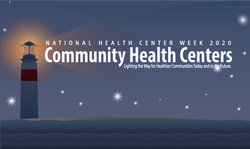
Here is the highlights of each day during the week:
visit the National Health Center Week 2020 page by clicking here. |
Health centers are an integral part of our communities, providing preventive care and primary care services, as well as often taking the lead in providing social services and fighting social determinants of health. This National Health Center Week, help us celebrate our Health Centers for all that they do for our communities!
Central Florida Health Care, Inc. serves Polk, Hardee, and Highlands Counties, FL. Central Florida Health Care is also an active member of our Board of Directors. They have worked hard to remain open during the pandemic to serve all residents and non-residents. Family Health Centers of Southwest Florida serves Charlotte County, as well as Glades, Lee and Sarasota Counties, FL. MCR Health Inc. serves DeSoto County, as well as Manatee and Sarasota Counties, FL. Suncoast Community Health Centers has one center serving Polk County, as well as Hillsborough County, FL. |
Job Announcements
|
As part of the ongoing COVID response, DOH in Highlands county has been authorized to hire individuals for OPS positions in the areas listed in the HRHN Newsletter. The positions will be funded through 12/31/20. If you or someone you know is interested, please fill out the Employment Application below and send it to Sherry Gaffney at [email protected].
| |||
June is Alzheimer's and
Brain Awareness Month
|
To get more information on Alzheimer's and other Brain Awareness Month and the Alzheimer's Association, visit the following links:
Alzheimer's Awareness Links Alzheimer's and Brain Awareness Month Alzheimer's Association |
May is Mental Health
Awareness Month
|
In the Quarter 2 Newsletter for HRHN, we presented an summary of an article posted to the National Alliance on Mental Illness about How to Ease Children's Anxiety About COVID-19 that was written by Dawn O'Malley, Psy. D. on March 25, 2020. To view the article in its entirety and find more Mental Health Resources, visit the following links:
Mental Health Month Links NAMI's Article National Alliance on Mental Illness Mental Health America Tri-County Human Services (Partner in Prevention) Peace River Center (Partner in Prevention |
Peace River Center promotes Mental Health Awareness
Peace River Center's Spring 2020 virtual magazine is live! Check it out here.
Wear Green to show your support of Mental Health Awareness on MAY 6th!
Also, we encourage you to join us in promoting Mental Health Awareness by wearing green on Wednesday, May 6th. Make sure you upload your photo to social media and use the hashtags #greenforPRC #hrhn and #mentalhealthawareness. We can't wait to see your pictures!
April is National
Child Abuse Prevention Month
|
To get more information on Child Abuse Prevention Month Activities and the Champion for Children Foundation of Highlands County, visit the following links:
Child Abuse Prevention Month Links Child Abuse Prevention Month Champion for Children Foundation |
COVID-19 Myth Busters:
Separating Fact from Fiction
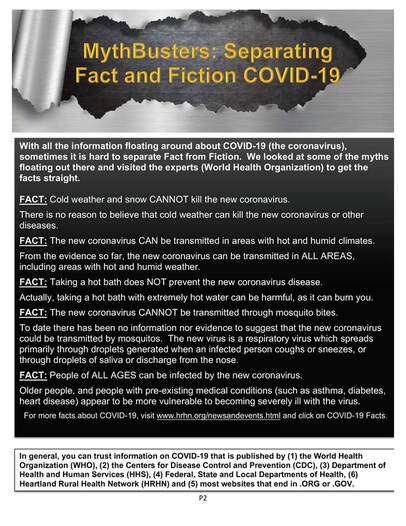
The World Health Organization (WHO) posts regularly on their website Myths and Facts about COVID-19. In our Quarter 2 Newsletter, we highlighted some of the most frequently heard myths in our community. To see them all, follow the link below:
COVID-19 Facts
To see a collection of resources for COVID-19,
visit our dedicated COVID-19 Resource page
by clicking HERE.
2020 Census: How it Affects Your Community
The count is mandated by the Constitution and conducted by the U.S. Census Bureau, a nonpartisan government agency. The 2020 Census counts the population in the United States and five U.S. territories (Puerto Rico, American Samoa, the Commonwealth of the Northern Mariana Islands, Guam, and the U.S. Virgin Islands). Each home will receive an invitation to respond to a short questionnaire—online, by phone, or by mail—between March 12-20.
Participating in the census is required by law, even if you recently completed another survey from the Census Bureau. A complete and accurate count is critical for you and your community, because the results of the 2020 Census will affect community funding, congressional representation, and more.
The Census Bureau is bound by Title 13 of the U.S. Code to keep your information confidential. This law protects your answers to the 2020 Census. Under Title 13, the Census Bureau cannot release any identifiable information about you, your home, or your business, even to law enforcement agencies. The law ensures that your private data is protected and that your answers cannot be used against you by any government agency or court. Violating Title 13 is a federal crime, punishable by prison time and/or a fine of up to $250,000.
The answers you provide are used only to produce statistics. You are kept anonymous: The Census Bureau is not permitted to publicly release your responses in any way that could identify you or anyone else in your home.
To read more about the census, click here and look at the options under the Get The Facts tab.
To take the Census online (you will need your Census ID), go to 2020 Census website and click Respond.
Participating in the census is required by law, even if you recently completed another survey from the Census Bureau. A complete and accurate count is critical for you and your community, because the results of the 2020 Census will affect community funding, congressional representation, and more.
The Census Bureau is bound by Title 13 of the U.S. Code to keep your information confidential. This law protects your answers to the 2020 Census. Under Title 13, the Census Bureau cannot release any identifiable information about you, your home, or your business, even to law enforcement agencies. The law ensures that your private data is protected and that your answers cannot be used against you by any government agency or court. Violating Title 13 is a federal crime, punishable by prison time and/or a fine of up to $250,000.
The answers you provide are used only to produce statistics. You are kept anonymous: The Census Bureau is not permitted to publicly release your responses in any way that could identify you or anyone else in your home.
To read more about the census, click here and look at the options under the Get The Facts tab.
To take the Census online (you will need your Census ID), go to 2020 Census website and click Respond.
February is American Heart Month
|
To get more information on American Heart Month and February 7th's National Wear Red Day, visit the following links:
Heart Month Links Amercican Heart Association National Heart, Lung and Blood Institute |
Diabetes Resource Links
Mayo Clinic Resources
National Institute of Diabetes and Digestive and Kidney Diseases
American Diabetes Association
National Institute of Diabetes and Digestive and Kidney Diseases
American Diabetes Association
HRHN's iMAD Program's I Make A Difference
Conference 2019
|
Heartland Rural Health Network's iMAD Program is hosting their first conference centered on Adolescent Health and Development, specifically focusing this year on mental health. The I Make a Difference Conference 2019 will have speakers and small break-out sessions. The featured speaker is Donna Lucero, MA, LPCC, NCC. Lucero who is the director of clinical services at All Faiths Children’s Advocacy Center in Albuquerque, New Mexico. She will be talking about recognizing, understanding and responding to the impact of childhood trauma. The conference will be held at Sebring's Circle Theater on December 18th from 8 am - 4 pm. It is free and open to the public, but we do request that people pre-register to insure we have enough space. To register, email [email protected].
See the Highlands News-Sun write up on this conference here. |
HRHN's iMAD Program's Wizard Camp
Highlighted in FYSB Success Stories
|
Heartland Rural Health Network, Inc.'s iMAD Program hosted its second annual summer camp in Summer of 2018. Recently, FYSB posted an interview with our Program Director, Larry Moore, about the program's inaugural year. To read about the article, click here.
|
HRHN launches new website for iMAD Program
|
Heartland Rural Health Network recently launched its newest website for its iMAD sexual health education program. The website that went live September 1, is designed for students and their parents to provide more information about the topics covered in the in-school program as well as some essential life skills. These main topics include Relationships, Life Skills and Youth Development. If you would like to learn more about the iMAD Program or read up on some of its staff please click here to check it out! |
One in every fifteen people living in the United States depends on health center services. Health Centers deliver high quality, cost effective, accessible care while serving as critical economic engines helping to power local economies.
In addition to their long history as health care homes to millions, Health Centers are also proud to celebrate over 50 years of service and continue to be ranked among the highest quality and cost effective care providers in the nation. Health Centers provide their services to all people, regardless of their ability to pay or insurance status. Each year we celebrate the work and services Health Centers provide to special populations within their community on designated days during the week. This year is no different! NHCW has added focused themed days, which will allow for more opportunities to showcase the innovative services and programs at Health Centers.
In addition to their long history as health care homes to millions, Health Centers are also proud to celebrate over 50 years of service and continue to be ranked among the highest quality and cost effective care providers in the nation. Health Centers provide their services to all people, regardless of their ability to pay or insurance status. Each year we celebrate the work and services Health Centers provide to special populations within their community on designated days during the week. This year is no different! NHCW has added focused themed days, which will allow for more opportunities to showcase the innovative services and programs at Health Centers.
Want to learn more about Health Centers?
|

